Wander-Lush

12 Things You Should Know Before Travelling to the Caucasus
Planning to travel to the Caucasus? This list of 12 useful Caucasus travel tips covers everything from money to border crossings.
When I first travelled to t he Trans-Caucasus countries (Georgia, Armenia and Azerbaijan), the region was still relatively unknown to tourists outside Eastern Europe. Ninety percent of people I spoke to couldn’t pinpoint Georgia on a map, let alone shed light on what it’s like to travel or live there.
- Also read: 23 practical travel tips for Georgia: Food, money, transport & accommodation
In the last few years, the Caucasus travel has become extremely popular – thanks in no small part to Georgia and Armenia being featured on many a must-do travel list (Lonely Planet, Forbes, AFAR… The list goes on). Budget flights to Tbilisi , Kutaisi and now Gyumri and Yerevan have made the region more accessible than ever before.
I certainly knew very little about the Caucasus before we decided to go (up until a few years ago, I would have had no hope of locating it on a map either). Honestly, my ignorance was a big part of the reason I wanted to travel there in the first place . It was challenging at times, but overall it was hugely rewarding to go in with very few expectations and figure things out as we went along.
I don’t want to spoil any surprises or deprive you of that same sense of discovery—but I do think it helps to have a few pointers. To help you on your way, I’ve put together this list based on some of the common questions readers and friends ask me about travelling in Georgia, Armenia and Azerbaijan.
Here are 12 things I think you should know before visiting the Caucasus.
Please note: This post contains affiliate links, meaning I may earn a commission if you make a purchase by clicking a link (at no extra cost to you). Learn more.
1. The region is incredibly diverse
It’s tempting to lump Georgia, Armenia and Azerbaijan together, but the three countries are very distinct. For starters, each one has its own language, culture and religion.
There’s a certain amount of overlap between Georgia and Armenia because the two countries share a long history and similar belief systems. Azerbaijan has a fascinating landscape and culture all of its own , and in my opinion is more distinct from its neighbours.
Travelling to all three countries as part of the one trip (like we did) makes sense logistically – and I’d go as far as to say that you really need to experience all three in order to get a balanced overview of the region. Don’t make the mistake of skipping Yerevan ‘because you’ve already seen Tbilisi’ – it doesn’t work like that.
There’s a huge amount of variety within each country, too. Azerbaijan, for example, supports nine out of the world’s 11 climatic zones and has an incredibly diverse landscape.
The Caucasus is second only to Papua New Guinea in terms of its linguistic diversity. One of the best things you can do is visit and learn about the ancient tribes and clans of the Northern Caucasus mountains , who know no state borders.
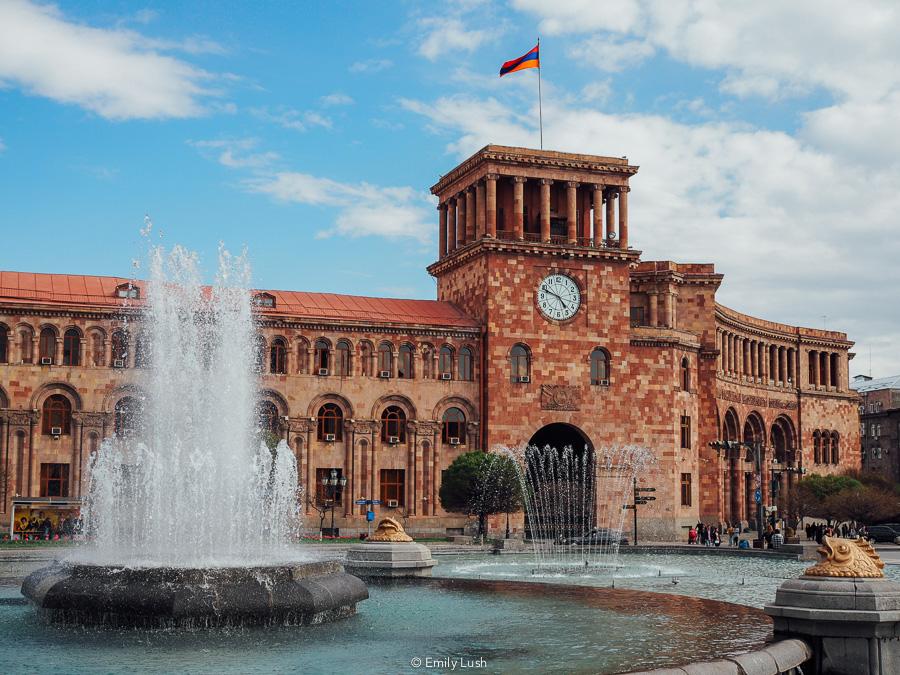
2. It feels a lot more like Europe than Asia
The Caucasus has always been defined by its mix of cultural influences due to its position at the crossroads of East and West. After the collapse of the Soviet Union , all three countries moved to distance themselves from Russia and fixed their gaze firmly on the West.
This is especially true of Georgia, which is currently pushing for membership in the EU.
Is Armenia in Europe? Is Georgia in Asia? Whether the Caucasus is part of the European or Asian continent seems to be a point of ongoing contention. All three countries are technically in Asia; but overall, the region feels a lot more European, especially in the cities.
All three capitals – Tbilisi , Yerevan and Baku – are characterised by classical architecture, parks, fountains and boulevards. To me, it definitely felt like I was travelling in Europe, albeit a slightly grungier version.
3. Just because two countries are neighbours doesn’t mean they’re friends
I was surprised to learn that there are still a number of active conflicts going on in the Caucasus. I think it’s important to understand a little bit about diplomatic relations between bordering countries – at the very least, it could have practical implications for your itinerary.
The most severe conflict is probably the one between Armenia and Azerbaijan. It centres on the Nagorno-Karabakh (Artsakh) region, a breakaway territory sandwiched between the two republics, which has been a site of skirmish since the 1980s. The war in Nagorno-Karabakh officially ended in 1994, but landmines and gun snipers are still a part of the everyday reality there.
It’s possible to travel to Nagorno-Karabakh, but only from the Armenian side of the border. And if you do, you forfeit your chance to travel to Azerbaijan – Azeri immigration won’t permit you to enter the country if they find any evidence that you’ve been to the disputed zone. The border between Armenia and Azerbaijan remains closed, so it’s necessary to pass back through Georgia if you’re travelling between the two countries overland.
Armenia has a tumultuous history with neighbouring Turkey, so the Armenian/Turkish border is also impassable.
Relations between Armenia and Iran, by contrast, are blossoming – the two neighbours recently established a visa-free travel agreement for their citizens. (You’ll see a lot of Iranian tourists in Yerevan – our tour guide there went as far as to suggest that one in three people you see on the street at any given time is Iranian.)
Muslim-majority Azerbaijan is closer with Turkey than any of its other neighbours. Although the two states no longer share a land border, many aspects of their culture and language overlap.
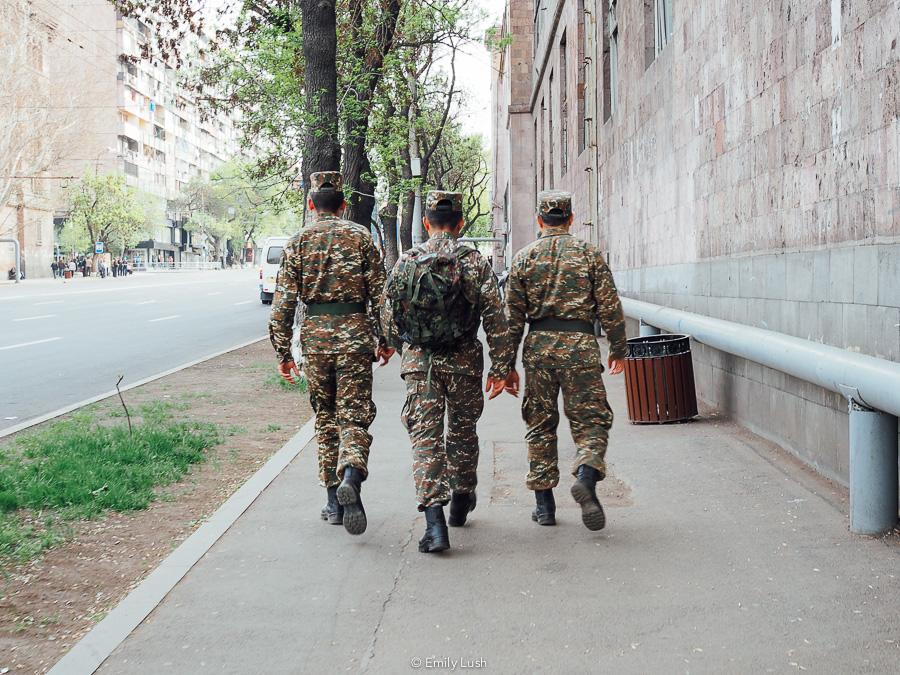
In the midst of all this, Georgia is sort of a ‘neutral’ state. Its borders with Russia, Turkey, Azerbaijan and Armenia are all open.
Georgia shares a long history with Armenia (much of Tbilisi’s old town was historically Armenian ), and today the two countries have something of a friendly sibling rivalry (both claim to be the birthplace of viticulture and the inventor of the churchkhela ). Georgians have much more in common with Armenians, while Azerbaijan is sort of viewed as the ‘outsider’ of the group.
Russia’s most recent forceful encroachment onto Georgian territory is still fresh in the memory of people as young as me. This has fostered an anti-Russian sentiment in the minds of many Georgians.
4. The history will break your heart
Ongoing border disputes are evidence of the fact that Georgia, Armenia and Azerbaijan are all young republics with a long, often troubling, history. This is something to be aware of, but I strongly believe that learning about events like the Armenian Genocide is best saved until you arrive in-country.
One of the most confronting things for me was the fact that I had never really heard of the Armenian Genocide before I set foot in Yerevan.
Be respectful, but don’t shy away from the history of the Caucasus. One of the best ways to immerse yourself and deepen your knowledge is simply by speaking to people.
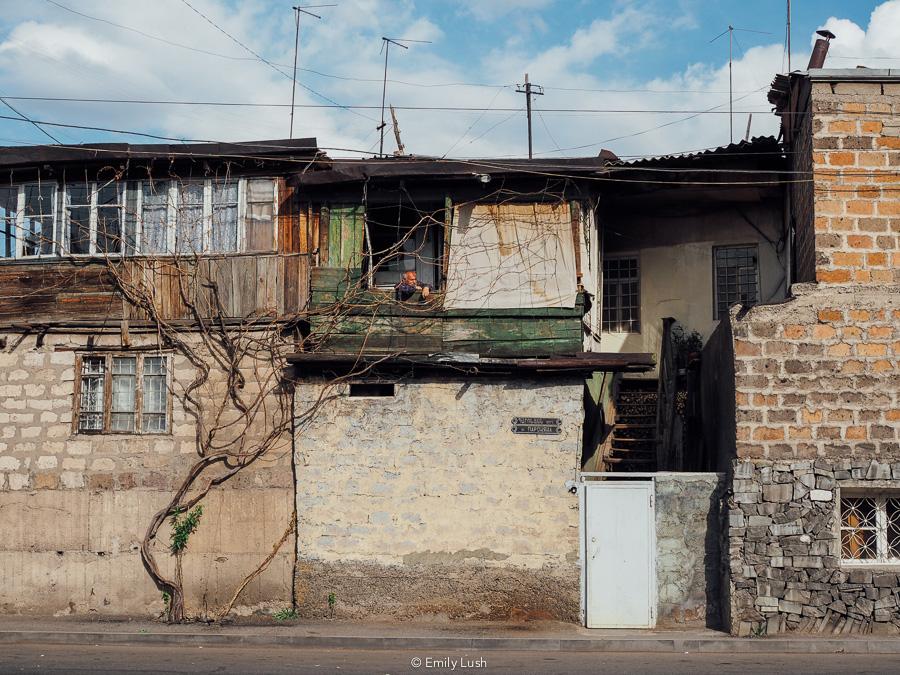
5. Poverty is a big issue
One thing all three Caucasus countries share is a common legacy of Sovietism. Coming from the West, I had a lot of preconceptions about the Soviet Union, which I generally consider to be a period of oppression and misery.
But talking to people on the ground (especially older generations), I was surprised to learn that not everyone looks back on Soviet times as ‘dark days’. For some, life was easier under the Soviet Union because they had everything they needed.
Georgia and Armenia both suffered huge economic losses after the Union dissolved; Azerbaijan survived on its oil money.
This all unfolded in the 1990s, which really wasn’t that long ago, and you still see a lot of poverty in all three countries today as a result. Armenia has one of the highest rates of migration in the world; young people especially are leaving in droves to escape the flagging economy.
Even for the young and well-educated in Georgia, jobs are scarce and wages in some sectors (including hospitality) are extremely low . As tourists, I believe we all have a responsibility to support local and small businesses , and visit less touristy areas to spread the love around (when possible).
Having travelled extensively in Southeast Asia, I’m used to seeing poverty. If you’re not so familiar with it, you best brace yourself for some pretty confronting scenes, especially in rural areas. You should also be prepared to deal with professional beggars in the bigger cities, especially in Tbilisi.
6. The cities are incredibly safe
OK – so there is a certain degree of ongoing political conflict and urban poverty is definitely an issue in the Caucasus, but for the average tourist, it’s still an incredibly safe place to visit .
By some measures, Georgia is one of the safest countries in the world (the 2018 Global Law and Order report from Gallup ranked Georgia 17th among 142 countries for security—ahead of the UK, US, and Germany).
One of the coolest things about Tbilisi is how the city cares for its stray animals—most street dogs are tagged and vaccinated by the state, and they are relatively friendly (the same does not go for dogs in rural areas, especially Caucasian mountain dogs).
Armenia is trying hard to shake off its reputation for corruption by putting anti-bribery measures in place at border crossings. I know this is a sweeping generalisation, but in my experience, people in the Caucasus are generally very trustworthy and community-minded.
Pick-pocketing and petty crime are rare in all three cities, and we certainly didn’t experience trouble of any kind.
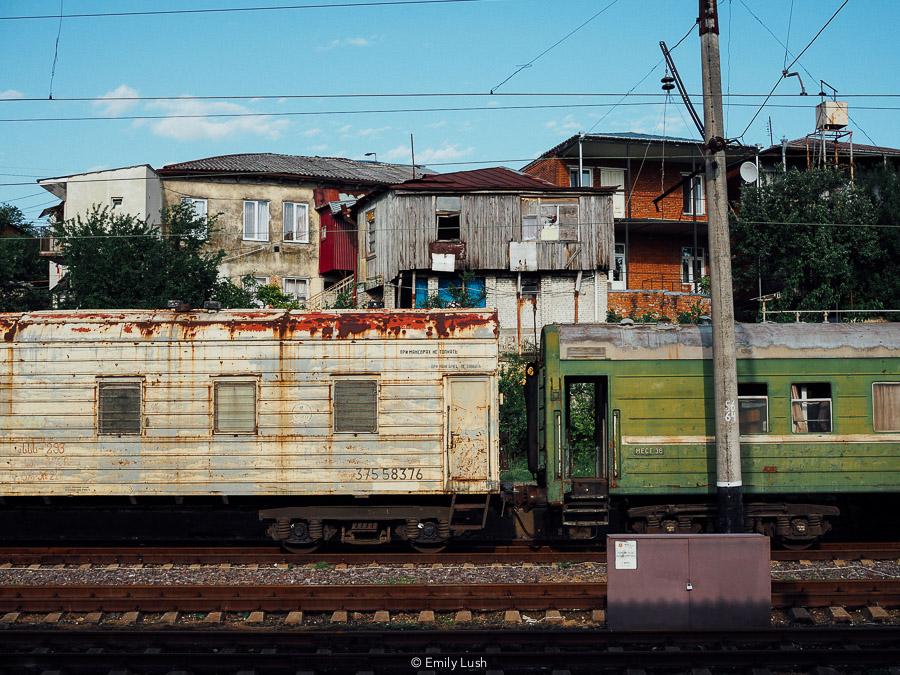
7. Public transport is the best way to get around
I’m a huge advocate of road trips, but I really wouldn’t bother with hiring or buying a car in the Caucasus. All three countries have top-notch inter-city transport networks, including trains and buses. Inter-country travel is also straightforward and affordable if you travel by overnight train .
Tbilisi, Baku and Yerevan all have metro systems (in the Soviet Union, any city with a population of one million people automatically qualified for a line), public buses and ride-sharing services. (The first time I ever used Uber was for a Lada ride to the bus station in Baku.) In my experience, public transport in the cities is cheap and generally reliable – plus, you can buy a local sim card and use Google Maps for route planning.
Trust me, you will learn to love the humble marshrutka ! These ubiquitous minivans are the best way to get around the Caucasus – I think we had more than 30 marshrutka rides in total. For a full break down of the public transport we used on our trip (including travel times and prices), check out our full itinerary .
If you’re thinking about driving, check out my tips for driving in Georgia and this helpful post about renting a car in Baku .
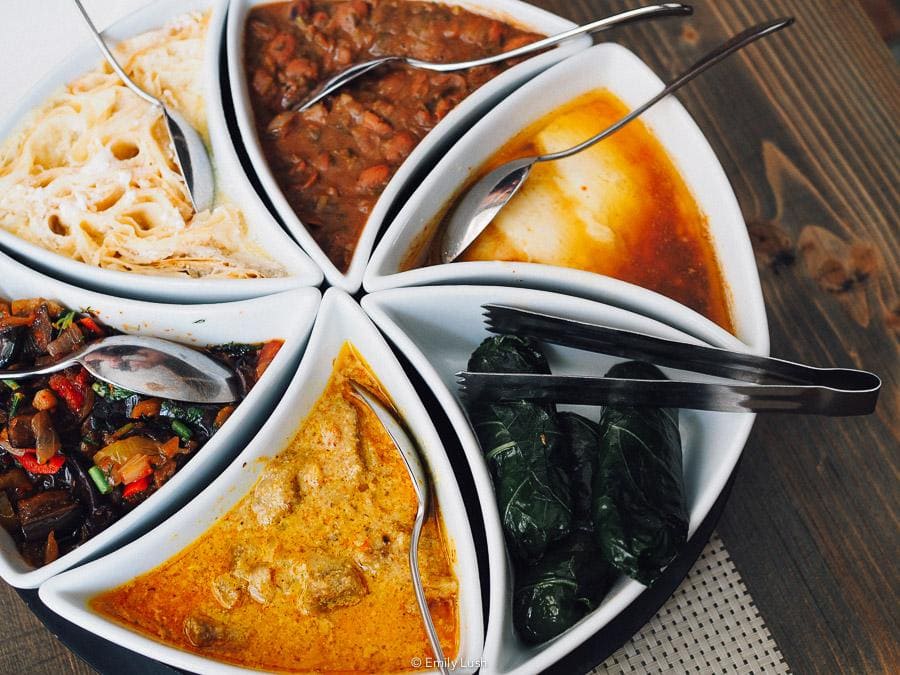
8. The food (and wine) will redefine your idea of ‘delicious’
I knew I was going to like Georgian food, but I wasn’t expecting there to be quite so much variety (or to be honest, so much flavour). After a year in Cambodia, all I wanted to do was pig out on cheese, bread and wine. I certainly did that – but I also got to eat some of the tastiest, freshest, healthiest meals I’ve ever eaten in my life.
I can confidently say that Georgian cooking changed what ‘delicious’ means to me – and what food should taste like in general. I’ve previously written about Georgian food in Tbilisi and in Kutaisi. (The food in Armenia and Azerbaijan was also good, but Georgia definitely wins in the culinary stakes.)
I would be remiss not to add a little something about wine. Viticulture was pioneered in present-day Georgia and Armenia, and both countries (especially Georgia) now produce incredible vino. Kakheti is Georgia’s wine-producing region and well worth a visit.
9. English is widely spoken
Since learning Russian in school is no longer compulsory, many young people in the Caucasus now choose to learn English instead. Like anywhere else these days, English is viewed as an essential skill for the new economy.
It’s always handy to know a few phrases (and a good habit to absorb as much of the local language as possible), but you certainly won’t have any trouble getting around if you only speak English.
Of the three countries, Azerbaijan had the least spoken English – but it all balanced out. Unlike the Georgian and Armenian alphabets which are beautiful but undecipherable, the Azeri alphabet is based on Turkic characters, which are easy enough to read.

10. Religion is critical
Did you know that Armenia was the first country in the world to adopt Christianity as its state religion? I didn’t. But after spending Easter Sunday in Yerevan, I got a taste for how deeply-rooted Armenian Orthodoxy is in the country.
Georgia, too, is a very religious country. And it’s not going out of fashion, either. Quite the opposite. According to 2018 research by Pew , Georgia is one of only two countries globally where youth are more religious than elders (on average, of course).
It’s not uncommon to see people on the bus or in cars cross themselves as they pass by a church (I know this happens in other Orthodox countries, too). Both Georgia and Armenia are famous for their impressive cave monasteries, churches and cathedrals.
Azerbaijan – ever the odd one out – is 99 percent Muslim, with most believers adhering to an orthodox Ithna Ashari school of Shi’a Islam. From what I’ve read and experienced, Muslim identity in Azerbaijan is more about culture and ethnicity than religious belief.
It’s kind of miraculous that all three countries held onto such strong belief systems throughout Soviet times. There’s no doubt that religion is part of the fabric of all three nations; but overall, I would say that personal ideas of devotion are mixed.
I wouldn’t particularly describe any of these countries as conservative, either – we only saw a handful of women wearing the hijab in Azerbaijan, for example. Contrary to some other travellers’ reports, public buses and trains in the country are no longer sex-segregated.
It goes without saying that as a tourist, you’ll be expected to dress and behave in certain ways when you’re inside a place of worship. Head scarves and wrap-around skirts are available for women to borrow at all Orthodox churches.
11. The kindness of strangers will restore your faith in humanity
Hospitality and tolerance is a huge part of Caucasian culture, and in my experience, people will honestly do just about anything they can to make you feel welcome. Georgians in particular are infamous for their stony exterior; but underneath the brusqueness, we found so much warmth.
I’ve written a whole post about the small gestures of kindness that shaped my overwhelmingly positive view of the Caucasus. It contains a few anecdotes which you might enjoy reading before you visit the country.
This isn’t to say that Georgia (nor Azerbaijan nor Armenia – nor any other country on earth) doesn’t have its fair share of social issues.
This 2018 report from Human Rights Watch provides an easy-to-digest overview of Georgian policy and politics, including hot-button issues such as media freedom, drug policy and same-sex marriage.

12. The Caucasus is already a popular destination
Just because you haven’t heard much about the Caucasus doesn’t mean it’s not a popular tourist destination. We travelled during shoulder season (March to May) and didn’t encounter too many crowds. But I can only think of one or two occasions when we were the only tourists around.
If you’re travelling during the high season (summer, June to August), I would recommend booking at least some of your accommodation and transportation in advance.
Armenia, as I mentioned, is a popular spot for Iranian tourists, and Georgia too is gaining a reputation among travellers from the region (largely thanks to cheap Wizz Air flights that now service Kutaisi). Most of the other travellers we met on the road in Georgia were Ukrainian or Polish.
On one hand, this is a good things, because tourist infrastructure is already pretty well developed to cater to local markets. At the same time, you still feel like you’re somewhat off the mainstream tourist track—especially if you’re from Australia (we’re still a bit of a novelty in these parts).
One of the best things about travelling in the Caucasus is the chance to connect with tourists from countries in Eastern Europe and Central Asia. In my opinion, it’s way more interesting to meet a traveller from Kazakhstan than to share a bus ride with a hoard of American tourists.
I’ve no doubt that the Caucasus region will one day earn the recognition it deserves among tourists of all stripes. And I sincerely hope that tourism will be a positive force in the lives of the people who live there.
Have you travelled in Georgia, Armenia or Azerbaijan? Or maybe you’re planning your own trip ? If you have any tips for fellow travellers, please leave them here in the comments!
Pin this post for later:

86 Comments
I visited friends in Tbilisi for two weeks in late September 2023. I can vouch for everything I’ve seen in Emily’s great guide. I just wish I’d known about it and read it all before I visited! And now I’m reading it to refresh my memories. The one thing I have not (yet) seen mentioned is the unbelievably horrible traffic in Tbilisi. Gridlock seems to be the normal thing in this city, which means that — just as Emily says — you must allow LOTS of time for traveling around Tbilisi. (Fortunately, taxis are very cheap.) For trips outside the city my friends hired a professional tour guide who was terrific and very reasonable. He took us to a set of historic monasteries & fortresses in Mtckheta, Dmanisi, Stepantsminda, Jvari, and Ujarma (5 different day trips). Some of the drives were long (3-4 hrs or more) but the scenery was wonderful and every destination was worth it — I only wish we had had more time at each one. One site I’d especially recommend is the huge monastery Davidgareja, built into a cliff right on the border with Azerbaijan. On the days between day trips we visited the National Museum (twice), bazaar, the huge monumental Chronicle of Georgia, the riverfront (don’t miss the boat ride), and especially the Ethnographic Museum (which has a display of actual wooden homes from the 19th century, furnished!). I agree with everything Emily describes — food, weather, hospitality, amazingly cheap prices, spectacular scenery, historical interest (especially Dmanisi’s incredible archaelogical site and discoveries). My first three days I stayed at a downtown hotel, Platforma Design, which I would recommend strongly — quiet, modern, comfortable, friendly, conveniently located, and amazingly cheap. To summarize: I’d go back to Georgia tomorrow if it weren’t the dead of winter — and hope to return soon!
Thanks so much Frank for the trip report! I’m so glad you enjoyed your first visit to Georgia and are planning to return!
Helloo Emily, Thank you for an informative topic Caucause. I live in Norway, I want to visist my brother who studying in Turkey to travel around (Georgia-Azeirbarjan- Armenia, or just Georgia- Azeirbajan). In first week of juni 2023. My quations; how cheeply can we travel from Turkey to Georgia and Azeibaijan. Which country its best to start with Azeirbajan rog Georgia. Its better to travel buy train, bus or airplan? You did not write abou the budsjet? how much do we need for 15 days. We can live in hostel?
Hi Abdo – Azerbaijan’s land borders will remain closed until the end of June at least. I would fly to Baku then make your way into Georgia from there (you can safely cross into Georgia, just not the other way around). Have a great trip!
Hello there,
Curious if you know about the Turkey/Georgia border crossing – is traveling into Georgia by land open at the moment? Grateful for any response!
Hello Kelly!
The land border situation is a bit confusing – land borders are still closed to tourists (i.e. anyone eligible to enter Georgia with proof of vaccination or a negative PCR), but you can come in through Sarpi if you are holding a business visa or Remotely From Georgia permit. I expect land borders will open in the coming weeks but I’m not 100% sure.
I hope this helps!
Hey I’m planning on flying into tbsili and staying there for a few weeks. Then, I plan to go to armenia. Is there an overnight train to gyumri or Yerevan? Or would I need to take a bus or fly?
Hi Zain, there is an overnight train to Yerevan leaving Tbilisi every evening at 10.45pm during summer. It just started up again on June 15.
Safe travels!
Hi from a fellow Aussie! I’ve really enjoyed reading your posts on visiting the Caucasus; so well-written and clear. We’ve just started planning our trip (for some point when Covid finally goes away, obvs) and can’t wait – and these tips will be invaluable.
Hey Leonie! So glad to hear that, thank you for taking the time to leave a note 🙂 Please let me know when you’re in Tbilisi – I’ll likely still be here and would love to buy you a glass of wine.
Happy planning, and don’t hesitate to reach out if there’s anything I can help with!
Cheers from Brazil
what AMAZING article! I hope 1 day i will convice my wife to visit this region, also Central Asia. Bye
Thank you Gustavo! Hope you make it here!
Hey, thanks for the nice article! One correction from a Georgian: the fact that historically there were many Armenians and they felt like home in Tbilisi (at one point they even outnumbered ethnic Georgians) doesn’t mean ”much of Tbilisi’s old town was historically Armenian” as you write, coz Tbilisi (meaning ”place of warmth” in Georgian) evolved particularly as a Georgian capital and main political thoroughfare through centuries, despite its multi-ethnic character. Much like the old Persian influence on Tbilisi’s culture and architecture doesn’t make it ”historically Persian” either.
Thanks for clarifying, Lasha. No doubt that Tbilisi is Georgian through and through 🙂 The mix of different influences (especially in the Old Town architecture) is one of the things I love most about the city!
My daughter and I are leaving for our first trip to Armenia in the summer of 2020. I read your blog and look forward to my trip! Thank you, now I know more about Armenia! Nice photos!
Thank you Tori! Have a wonderful trip!
Hi Emily! Thank you for all you have done! Your job is amazing! Even it helped me a lot l have difficulties apling for online visa for Georgia as my foto can not upload few times. Even l took foto 3 times from the foto studio they foloow the dimension still can not. Any advise? Or someone’s experience like this? Thank you 🌷🙏
Hi Cvetanka, Sorry to hear you’re having difficulties. I would recommend contacting the consulate/visa office through the website, they should be able to help. Good luck and happy travels!
Hi! Interesting reading! We are some Swedes planning to drive to Georgia and Armenia next summer – and spend about 3-4 weeks driving around and experiencing these apparently super exciting countries. Do you have any special suggestions when it comes to driving? Places hard to reach otherwise, places worth visiting out of the way from normal tourists who don’t travel by car, things to think about, etc.
There are hidden gems everywhere! Open up Google Maps and take your pic. You can’t go wrong 🙂
Our family traveled to Armenia in May 2018. For intercity travel, we hired a driver instead of renting a car. We were so glad that we did! The cost was very reasonable and Davit, our driver was excellent. If you rent a car be aware that some of the roads look like a war zone. There are huge potholes that are beyond description. Make sure that you have insurance for damage to your rental beyond collision. Also, most Armenians use natural gas instead of gasoline for fuel as the former is much less expensive. Armenia is exquisitely beautiful and the people extraordinarily hospitable. Enjoy!
Emily: hi like everyone else I think your posts are brilliant, keep it up, they have helped me every so much in organizing my trip this sept/oct. my query is entering Azerbaijan. I have the visa all done and dusted but had to put down the day day I am entering. I have the 30 day visa and have 90 days for it my question is do I have to enter there on the day I mentioned or can I go later, can’t find any info on it. thanks for any help you or your followers can give.
Thanks for the kind words. Glad to hear that!
From the wording on the e-visa website, I do believe the visa is valid for 90 days from the date of issue (see point 5: https://evisa.gov.az/en/conditions ), meaning you can enter and activate the visa any date within that 90 day period.
You could try contacting the e-visa people or a consulate for clarification. There’s a form on the website I linked above. They are usually pretty responsive.
I hope this helps. Have a great trip!
Thanks so much for your article, it was a great read. I’m just wondering if you had a suggested travel plan between the three countries, given the fighting between Armenia and Azerbaijan. I already will be in Georgia, so will I need to go to one place first like Azerbaijan and then travel back to Georgia and then on to Armenia? Any info you can provide would be greatly appreciated, thanks 😊
Thanks for the kind words. I have a Caucasus itinerary post which you will hopefully find helpful: https://wander-lush.org/caucasus-travel-georgia-armenia-azerbaijan-itinerary/
I also have a Georgia Azerbaijan transport post which runs through the overland (long way) and overnight train (short version) options for getting between the two countries: https://wander-lush.org/baku-to-tbilisi-bus-travel-azerbaijan/
To answer your question: Yes, the border is closed, so you need to transit through Georgia (or another neighbouring country such as Iran (not Turkey)).
Happy travels!
Having travelled to Georgia twice and Azerbaijan once, I totally agree! I would caution though about hearing about conflicts from one side. For Azerbaijanis for example, Armenians committed genocide in 1918 and ethnic cleansing of Azerbaijanis in Karabakh as recently as the 90s.in a land recognized as Azerbaijani but occupied by Armenia in the 90s. I heard about the Armenian genocide but did not know it was a war between Armenia and Turkey and both sides committed the same atrocities. I hope conflicts are resolved in this beautiful part of the world.
Your report is concise and very useful. It definitely increased my interest in traveling to the area. Thank you very much.
George ,/ Brazil.
Glad to hear it, George!
Thank you so much for sharing your experience. We have always loved travelling to place less traveled by the Western world but our next trip (one month) is our first with our 7 month old baby. My Husband is really keen to explore the Caucasus region and, while I would LOVE to visit there, I’m unsure of the ease and health services there (should something go wrong). What are your thoughts
As a guide to my comfort levels – We traveled Iran, Jordan, Kyrgyzstan and Israel last year and I would be comfortable doing Iran, Jordan or Israel that with a bub, but not Kyrgyzstan (hard to find bottled water and health services – took us two days to find someone to remove my husbands stitches that he had needed when we were in Iran).
Is the Caucasus similar? Would we be confined to main cities?
Really appreciate your thoughts.
Thanks a lot for the comment. I know it’s a totally different story travelling with a baby, but I have a little bit of experience with this—my partner got sick in Azerbaijan and we ended up visiting a bunch of clinics in both AZ and Armenia (for blood work, IV drips and medication). I was really impressed with the quality of healthcare in Yerevan. Rural parts of the Caucasus would be a bit trickier, yes, but my overall impression is that the quality of healthcare is pretty good and very affordable.
Can you reach out to your travel insurance provider for some advice? We always contact them first for a list of recommended healthcare providers, just to put us at ease.
The other thing to remember is that Armenia and Georgia in particular are pretty compact, so you’re never more than a few hours away from a big city.
I’m so sorry to hear your partner was sick and needed medical treatment, but your experience does put my mind at ease.
Thank you so much for replying, this is a huge help. I’ll definitely reach out to our travel insurance provider.
My pleasure, Trish! All the best, and don’t hesitate to email if there’s anything else I can help with.
Thanks for this blog, Emily. Planning to tick off this tri-country trip this year. I’m a Philippine passport holder and a GCC resident. They say it’s visa-free in Georgia for GCC residents. I’m planning to travel from Dubai to Baku, then Baku to Tbilisi by train after a few days. Will that be okay in terms of immigration procedure? Will there be a difference since my entry will not be in Tbilisi Airport? Many thanks!
Hi Angela! Glad to hear that—I’m sure you’ll love it!
I can’t give specific visa advice, but as far as I know, immigration/visa requirements are the same no matter which port you’re entering through, unless it was specified differently when you applied. You should double check with the consulate/visa office to be safe.
Thanks for all the extensive info in this region, exactly what I was looking for! I am looking about 5 weeks to do all 3 three countries, but I think this probably is not enough time, is it? Do you have any recommendations on must-see things, the order of the country visits or any hikes to do? Many thanks!!!
I think that’s a good amount of time, Ella! Did you see my Caucasus itinerary post? That will answer your questions 🙂
Im flying to Causasus region next May. Read that u stayed in an airbnb in Tbilis that u enjoyed a lot. Could u tell me the link, pls? I m from Brazil and I ll be w a friend from Ireland.
Tks a lote !!
Happy to share the link for Pikria and Nino’s place: https://www.airbnb.com/rooms/14030862
If that’s not available, we also stayed at (and recommend) Lasha’s place: https://www.airbnb.com/rooms/18279935
Have a wonderful trip to Tbilisi!
We are heading to all three countries in June July and Aug this year from Australia. I really enjoyed this article and would love some must visits. We like to be away from cities where possible
Sounds great, Gill! Check out my Georgia-Armenia-Azerbaijan itinerary post. Everything you need is in there.
Have a wonderful trip!
Nice article but not so subtle American bashing. You could have simply wrote that meeting a traveler from Kazakhstan is interesting. I’ve met bus loads of tourists of many nationalities (including Australian) that aren’t my cup of tea but I just move on and focus on the positive instead of complaining.
No complaints here! Many of my friends are from the US and I travel with them regularly. It’s nice to meet someone from a culture that’s very different to my own, and I experienced that often as I was travelling around the Caucasus. Bus loads of tourists of any nationality are not really really my cup of tea. I simply meant that the Caucasus is a great part of the world to break away from the group tours and large cohorts of people (well, for now at least!).
Happy travels, Emily
I’ve been appreciating your content and perspectives on travel, but as an American it was kind of jarring to see you describe American tourists as hordes. I know we don’t have the best reputation as travelers, but I doubt the fanny-pack stereotypes are coming to the Caucasus en masse.
Certainly not – it was intended as more of a comparison to my other travel experiences elsewhere in the world. No offence intended.
Thanks for these great tips! We are looking at making this trip this year with our little boy who will be 3 years old.
I have recently started a blog about his travels and hope to add our experience in the Caucasus – I have detailed my link below in case you’d like a little read 🙂
A question please – do you know if you can make a day trip to Yerevan from Tblisi? Happy to take private car due to the attention span of a toddler!!
Many thanks in advance Karis
Thanks so much for your comment! Your trip sounds great! To answer your question: Yes you can visit as a day trip. I saw plenty of tourism providers offering this as a package day tour deal in Tbilisi (and vice-versa in Yerevan). Of course I would recommend spending longer in Yerevan if you can.
Happy travels! Emily
Hi, Emily, Thank you so much for sharing your experiences in the Caucasus. There are indeed not many information available, let alone in such detail. It will be so useful for me and my partner as we will be going on a two-week trip to this region coming February. Really appreciate your posts.
Hi Kathryn,
I’m glad you’re finding my blog helpful! Please don’t hesitate to reach out if there’s something else I can help with.
Enjoy your trip—it’s a wonderful part of the world!
Best, Emily
thanks Emily. I have visited Georgia twice in the past, always in October (2016/2017). recently I found informations that the road up to Kazbegi is paved now, and Mestia to Ushguli will be done as well and providing an easy access to even very remote regions. I hope they develope carefully. in 2 weeks time, for xmas and new year I am planning to visit Armenia in the snow.
Hi Ralph, thanks for your comment! We’re hoping to visit the region again in summer 2019. The Mestia-Ushguli road was underway when we were last there. I agree—better roads are definitely needed, but I hope development is done carefully and with local input.
Enjoy Armenia!
Thanks for sharing your post it’s very amazing and informative too..Keep writing.
I liked the post… I have thought to go sightseeing again in the regions of Azerbaijan this month! One of the things I like most about this region are the rich places for sightseeing and entertainment and besides these buildings and houses reminds me of many movies… really is a wonderful place to visit in the summer season. I’ve met some regions of this country, and actually cooking has left me with water in my mouth. The city has restaurants with very tasty menus and also has great places for family outing. Thank you for sharing your experience with us about this country.
Thanks for your thoughts, Cleber! Azerbaijan is a great place to visit!
What a wonderful post! Thanks for writing it. Are there decent vegetarian (egg/cheese ok, but no meat/seafood) options while traveling in these countries?
Thanks, MC! Yes for sure—lots of vegetarian options, and some of the best salads I’ve eaten in my life.
Hi.. thanks for this detailed blog.. i wanted to know how did you travel in between countries? If by train then are we supposw to buy visa again while coming back to tbilisi from baku and yerevan from tbilisi.?
Yes that’s right, we travelled by train from Tbilisi to Baku, then from Tbilisi to Yerevan. Visa requirements will depend on your nationality—you should check with your nearest embassy or consulate.
Thanks for sharing your experience very beautiful post.
I love your blog about the Caucasus. Once i started i couldn’t stop reading. We are currently planning our honeymoon travels to Georgia and Armenia. It’s great to read a blog which focuses so much on the culture and the ‘real life’ caucasus. We have done a lot of travelling and always try to experience the cultures and try to live like the locals, so your information and experience has been inspiring.
I’m always asked this question about our travels. What was your most memorable experience?
Best wishes Ollie & Nemi
Hi Ollie & Nemi,
Thanks so much for your thoughtful message and the kind words. I’m so excited for you—you’re going to have an amazing time! What a place to travel for your honeymoon.
My most memorable experience was undoubtedly the lunches and afternoon teas we had with our Airbnb hosts in Tbilisi. We were so lucky to be welcomed into their home, and spent hours and hours chatting about Georgian history, culture and politics. I can’t tell you how warm and generous they were to us. We’re so excited to be going back to Georgia next year and catching up with them again!
If you are invited into someone’s home for a meal in Georgia, say yes.
Enjoy planning your trip, and please don’t hesitate to email me if there’s anything at all I might be able to help with.
Kindest, Emily
Hi Emily, I am planning on going to Azerbaijan in March 2019 as a female on my own. Do you think I will be safe?
Thanks for your comment. I’m glad to hear you’re travelling to AZ!
It depends a bit on where you’re travelling to and the sorts of things you’ll be doing. We stuck to the tourist trail (Baku, Quba, Sheki) and never felt unsafe. I think generally, it’s a pretty safe country with a big police presence. Personally, I wouldn’t have any hesitation travelling there as a solo female.
I’m working on a post at the moment about safety in the Caucasus. Hopefully you’ll find it useful!
Such an insightful post – thank you for sharing this!
I also loved reading your Tbilisi guide. We are headed to Georgia next week, and I’ll be using a lot of the stuff you’ve shared here.
Thank you, Chaitali! I hope you love Tbilisi and Georgia as much as we did!
This is wonderful stuff, so much excellent information and right up-to-date. We ( a couple in their 70s) spent two weeks travelling from Baku to Yerevan back in 2016, and were so taken with the region we’re going back next month, for a month, and taking 10 friends with us. I’ve had the best time planning it and am so looking forward to introducing our friends to the delights of travelling in these countries.
Hi Leyle! That’s fantastic. It will be interesting to see how much things have changed since 2016. I feel like most people want to return once they’ve been to the Caucasus once… We will be back in Georgia next year, hopefully.
Thanks for your kind words and I hope you have a wonderful trip!
Great post! I’m one of these Polish tourists who benefit from cheap Wizzair flights to Georgia. But this year I’m bringing my boyfriend there who’s from another country and doesn’t know much about Caucasus get 🙂
Ohh, one of the lucky ones! We met so many Polish tourists on our trip—I actually hadn’t ever heard of Wizzair before I went to Georgia.
How special that you’ll get to show him around! I hope you have a great trip!
Just by the pictures alone, I already feel like going there!
I know what you mean, Hank! It’s an incredible beautiful part of the world.
Hope you make it!
Such a helpful post, thanks! I’m planning a (vague) trip with a friend and all of the research we’ve done totally failed to mention the impassable borders and international relations. We only have a very short time – do you think we’d manage to sample both Tbilisi and the Caucasus in a week, or we’d be better choosing one or the other?
Thanks so much for the feedback, Cat! I’m really glad you found it helpful. I am putting together a few sample Caucasus itineraries now and hope to have a post published by the end of the month.
How much time do you have? You could spend a decent amount of time in Tbilisi and still see a bit of Georgia (Kazbegi, Kakheti, Gori—all good for a day/overnight trip). With the overnight trains, you could pretty easily add Yerevan or Baku without losing much time, then travel overland back to Tbilisi and see a bit more of Armenia and/or Georgia.
Shoot me an email and maybe we can discuss your options more!
Excellent post. I had read it’s history before I went to Caucasus. But it still caught me by surprise. One does not imagine how can such a beautiful place can have a history with so much misery and tragedy.
Thank you, James. It took me by surprise, too. And it wasn’t very long ago that the region was facing tough times. The courage and warmth of the people I met in the Caucasus was overwhelming.
I’m actually in Georgia Tiflis right now. This place took me by surprise and amazed me to a point I ‘ve seldom experienced. If you are planning to come and visit the incredible museum offer don’t do it during good friday week. The museums ALL close for an extended religious holiday that will last not until easter sunday but until the next tuesday of the upcoming week. It felt like my sponge cake suddenly deflated when somebody accidentally open the oven.
Oh no! Sorry to hear that. I was in Yerevan for Orthodox Easter last year and nothing really seemed to close down. That’s a great tip for other travellers. There are lots of free things to do while the museums are closed—I have a post called ‘Awesome Things to do in Tbilisi’ that you might find helpful.
Glad to hear that Tbilisi has amazed you!
Very helpful blog. Thank you for that. 🙂
I was wondering… me and my friends are planning a 2 weeks trip from Tbilisi to Baku. What are in your opinion the most inportant stops we should take during this 2 weeks. I would be very glad for your answer.
Thank yoooouuu:))
Hi Beata! Thanks a lot! You can check out my itinerary post for my recommendations in Georgia and Azerbaijan 🙂
https://wander-lush.org/8-weeks-2-months-caucasus-georgia-armenia-azerbaijan-itinerary/
Please let me know if there’s anything else I can help with! Enjoy your trip!
Seems amazing trip and experience 🙂 Thanks for sharing! So what is the order in which you visited the three countries? Azerbaijan, Georgia and the Armenia?
Hi Danai, thanks a lot!
We went from Georgia to Azerbaijan to Armenia (via Georgia, because the Armenia/Azerbaijan border is closed) back to Georgia. You can see our itinerary here: https://wander-lush.org/8-weeks-2-months-caucasus-georgia-armenia-azerbaijan-itinerary/
Thank you for sharing this! I am currently obsessed with reading everything I can about the cuisine from The Caucasus. I hope to travel there in the next year to taste everything I possibly can.
Do you have any restaurant recommendations, in the chance I do indeed make it there this year?
Thanks so much.
Hi Elisabeth! The food is outstanding! I have a post about my favourite dishes and restaurants in Tbilisi ( http://wander-lush.org/tbilisi-georgia-food-best-restaurants-cafes-guide/ ), and you can find restaurant and cafe recommendations in my posts for Batumi and Kakheti.
After reading this, can‘t wait to start my journey in June to Georgia and explore all the beautiful sights and regions – especially our planend hikes through the caucasus region Svanetien.
Hi Rosi! You lucky thing—that sounds amazing! So glad you liked the post. Have a wonderful trip!
Thank you so much for all this valuable information! I currently live in Kazakhstan and we are planning a December trip to the Caucasus region. After reading all your wonderful blogs, we’ve decided to give each country the time it deserves to fully embrace their beauty and uniqueness. I can’t wait to explore the region!
Edith, I’m so happy to hear that! You are going to love the Caucasus! Enjoy your trip planning and please feel free to contact me if there’s anything I can help with. Thanks so much for reading!
Leave a Reply Cancel reply
Your email address will not be published. Required fields are marked *
- Subscribe to future posts
- Skip to main content
- Skip to "About this site"
Language selection
Search travel.gc.ca.
Help us to improve our website. Take our survey !
COVID-19: travel health notice for all travellers
Azerbaijan travel advice
Latest updates: Editorial change
Last updated: June 4, 2024 08:09 ET
On this page
Safety and security, entry and exit requirements, laws and culture, natural disasters and climate, azerbaijan - exercise a high degree of caution.
Exercise a high degree of caution in Azerbaijan due to regular tensions in areas along the border between Azerbaijan and Armenia.
Districts in the western part of Azerbaijan - Avoid all travel
The Government of Canada’s ability to provide consular services in these regions is extremely limited.
Border with Armenia - Avoid all travel
This advisory excludes the area within 1 km of the border between Armenia and the Azerbaijani Autonomous Republic of Nakhchivan where you should avoid non-essential travel due to the risk of armed clashes.
Back to top
Districts in the western part of Azerbaijan
Unexploded ordnance continue to pose a risk in areas of western Azerbaijan, including the Nagorno-Karabakh region, especially in the following districts:
You must have special travel permission from Azerbaijani authorities to enter these areas.
The Government of Canada’s ability to provide consular services in these regions is extremely limited.
If you decide to travel to the Nagorno-Karabakh region and/or to districts in the Western part of Azerbaijan despite the advisory in effect:
- be extremely vigilant in remote areas
- stay on paved and main roads
- don’t walk in fields
- avoid roadside ditches, shoulders and unmarked trails
- pay attention to signs indicating the possible presence of unexploded ordnance
- report any suspicious items to local authorities
Border areas with Armenia
The Government of Canada’s ability to provide consular services in areas along the Armenia-Azerbaijan international borders is extremely limited.
The security environment remains highly volatile at the border between Azerbaijan and Armenia since the November 2020 ceasefire agreement ending the Second Karabakh War with Azerbaijan. The ceasefire observed by Russian peacekeepers remains in effect, but there have been numerous violations and tensions could resume at any time.
In 2023, Azerbaijan established a border checkpoint at a bridge at the entrance of the Lachin corridor at the border with Armenia. All other border crossings into Armenia are closed.
Border areas with Armenia are subject to extremely dangerous military activities, such as:
- mortar and artillery shelling
- rocket fire
- drone attacks
- heavy gunfire
If you choose to travel near the border with Armenia despite this advisory:
- exercise caution at all times
- avoid travelling at night
- monitor local and international media to stay informed on clashes
- follow instructions from local authorities and security forces
Crime is relatively low. Most reported crimes involve burglary, assault or petty crime, such as pickpocketing.
Thieves sometimes pose as police officers and demand that tourists pay on-the-spot fines. If faced with this situation, offer to follow the officer to the nearest police station to pay the fine.
- Avoid walking alone after dark
- Be careful in areas that attract large crowds and areas that are very isolated or dimly lit
- Don’t carry large amounts of cash
- Don’t display signs of affluence
- Ensure that your belongings, including your passport and other travel documents, are secure at all times
Credit card and ATM fraud occurs. Be cautious when using debit or credit cards:
- pay careful attention when your cards are being handled by others
- use ATMs located in well-lit public areas or inside a bank or business
- avoid using card readers with an irregular or unusual feature
- cover the keypad with one hand when entering your PIN
- check for any unauthorized transactions on your account statements
If you’re travelling to Azerbaijan to meet someone you’ve only met online, you may be the victim of a scam.
More about overseas fraud
Spiked food and drinks
There have been incidents of drink spiking, resulting in victims being robbed.
Never leave food or drinks unattended or in the care of strangers. Be wary of accepting snacks, beverages, gum or cigarettes from new acquaintances. These items may contain drugs that could put you at risk of sexual assault and robbery.
Demonstrations
Demonstrations take place from time to time.
Even peaceful demonstrations can turn violent at any time. Police may use force to suppress demonstrations.
They can also lead to disruptions to traffic and public transportation.
- Avoid areas where demonstrations and large gatherings are taking place
- Follow the instructions of local authorities
- Monitor local media for information on ongoing demonstrations
More about mass gatherings (large-scale events)
There is a threat of terrorism. Terrorist attacks could occur at any time.
Targets could include:
- government buildings, including schools
- places of worship
- airports and other transportation hubs and networks
- public areas such as tourist attractions, restaurants, bars, coffee shops, shopping centres, markets, hotels and other sites frequented by foreigners
Always be aware of your surroundings in public places.
Stay at hotels that have robust security measures. Keep in mind, however, that even the most secure locations can’t be considered completely free of risk.
Road Safety
Highways and major city roads are well-maintained, but driving can still be dangerous due to poor driving standards and poorly maintained cars. Many drivers do not pay attention to speed limit, traffic rules and traffic signs. Insufficient street lighting and signage make travel dangerous outside of Baku. The risk increases on certain roads that are shared with pedestrians and livestock.
Authorities don’t enforce traffic rules consistently.
Pedestrians should exercise caution.
Public transportation
Buses are poorly maintained, often overcrowded and unsafe, particularly outside of Baku. Baku Metro is reasonably maintained and has basic safety equipment. Expect to see security cameras throughout the platforms and a police presence at each metro station, particularly at night.
Only use officially marked taxis, which are metered, have seatbelts and are cheaper than unmarked taxis. Avoid shared taxis and unofficial taxis because passengers have been assaulted.
If you must travel by train, store personal belongings in a safe place and don’t leave your compartment unattended. Ensure the door is secured from the inside.
We do not make assessments on the compliance of foreign domestic airlines with international safety standards.
Information about foreign domestic airlines
General safety information
Tourist facilities are limited outside of the Absheron Peninsula, Baku, Lankoran and Quba.
Every country or territory decides who can enter or exit through its borders. The Government of Canada cannot intervene on your behalf if you do not meet your destination’s entry or exit requirements.
We have obtained the information on this page from the Azerbaijani authorities. It can, however, change at any time.
Verify this information with the Foreign Representatives in Canada .
Entry requirements vary depending on the type of passport you use for travel.
Before you travel, check with your transportation company about passport requirements. Its rules on passport validity may be more stringent than the country’s entry rules.
Regular Canadian passport
Your passport must be valid for at least 3 months beyond the date you expect to leave from Azerbaijan.
Passport for official travel
Different entry rules may apply.
Official travel
Passport with “X” gender identifier
While the Government of Canada issues passports with an “X” gender identifier, it cannot guarantee your entry or transit through other countries. You might face entry restrictions in countries that do not recognize the “X” gender identifier. Before you leave, check with the closest foreign representative for your destination.
Other travel documents
Different entry rules may apply when travelling with a temporary passport or an emergency travel document. Before you leave, check with the closest foreign representative for your destination.
Useful links
- Foreign Representatives in Canada
- Canadian passports
Canadians must be in possession of a visa to visit Azerbaijan.
Tourist visa: Required
Business visa: Required
Student visa: Required
Transit visa: Required
If you plan to visit Azerbaijan, you must have a visa before arriving in the country. As a tourist, you can apply for an e-visa through Azerbaijan’s online visa portal. You should do so at least 3 days before your planned arrival date.
E-visas are single entry and are valid for 30 days. If you require any other type of visa, you must apply for it from the Embassy of the Republic of Azerbaijan prior to departure.
To obtain any type of visa, you must present a letter of invitation from a contact in Azerbaijan, such as an employer or educational institution. If you don’t have a contact in Azerbaijan, the invitation letter should be submitted by the travel agency in Azerbaijan.
Azerbaijan’s online visa portal
Registration
You must register with the State Migration Service within 15 calendar days of arrival if you intend to stay more than 15 days. Ensure that your passport is stamped with a residency stamp.
Failure to register could result in a fine. You may be stopped from leaving Azerbaijan until the fine is paid.
If you intend to stay in Azerbaijan for more than 30 days, you must obtain a temporary residence card or apply to extend your visa.
State Migration Service
Nagorno-Karabakh
You may need to obtain prior authorization from the Azerbaijan authorities to enter and/or exit the Nagorno-Karabakh region. You should contact the nearest embassy or consulate of Azerbaijan before you travel.
Yellow fever
Learn about potential entry requirements related to yellow fever (vaccines section).
Children and travel
Learn more about travelling with children .
Relevant Travel Health Notices
- Global Measles Notice - 13 March, 2024
- COVID-19 and International Travel - 13 March, 2024
This section contains information on possible health risks and restrictions regularly found or ongoing in the destination. Follow this advice to lower your risk of becoming ill while travelling. Not all risks are listed below.
Consult a health care professional or visit a travel health clinic preferably 6 weeks before you travel to get personalized health advice and recommendations.
Routine vaccines
Be sure that your routine vaccinations , as per your province or territory , are up-to-date before travelling, regardless of your destination.
Some of these vaccinations include measles-mumps-rubella (MMR), diphtheria, tetanus, pertussis, polio, varicella (chickenpox), influenza and others.
Pre-travel vaccines and medications
You may be at risk for preventable diseases while travelling in this destination. Talk to a travel health professional about which medications or vaccines may be right for you, based on your destination and itinerary.
Yellow fever is a disease caused by a flavivirus from the bite of an infected mosquito.
Travellers get vaccinated either because it is required to enter a country or because it is recommended for their protection.
- There is no risk of yellow fever in this country.
Country Entry Requirement*
- Proof of vaccination is not required to enter this country.
Recommendation
- Vaccination is not recommended.
* It is important to note that country entry requirements may not reflect your risk of yellow fever at your destination. It is recommended that you contact the nearest diplomatic or consular office of the destination(s) you will be visiting to verify any additional entry requirements.
About Yellow Fever
Yellow Fever Vaccination Centres in Canada
There is a risk of hepatitis A in this destination. It is a disease of the liver. People can get hepatitis A if they ingest contaminated food or water, eat foods prepared by an infectious person, or if they have close physical contact (such as oral-anal sex) with an infectious person, although casual contact among people does not spread the virus.
Practise safe food and water precautions and wash your hands often. Vaccination is recommended for all travellers to areas where hepatitis A is present.
Hepatitis B is a risk in every destination. It is a viral liver disease that is easily transmitted from one person to another through exposure to blood and body fluids containing the hepatitis B virus. Travellers who may be exposed to blood or other bodily fluids (e.g., through sexual contact, medical treatment, sharing needles, tattooing, acupuncture or occupational exposure) are at higher risk of getting hepatitis B.
Hepatitis B vaccination is recommended for all travellers. Prevent hepatitis B infection by practicing safe sex, only using new and sterile drug equipment, and only getting tattoos and piercings in settings that follow public health regulations and standards.
Measles is a highly contagious viral disease. It can spread quickly from person to person by direct contact and through droplets in the air.
Anyone who is not protected against measles is at risk of being infected with it when travelling internationally.
Regardless of where you are going, talk to a health care professional before travelling to make sure you are fully protected against measles.
Coronavirus disease (COVID-19) is an infectious viral disease. It can spread from person to person by direct contact and through droplets in the air.
It is recommended that all eligible travellers complete a COVID-19 vaccine series along with any additional recommended doses in Canada before travelling. Evidence shows that vaccines are very effective at preventing severe illness, hospitalization and death from COVID-19. While vaccination provides better protection against serious illness, you may still be at risk of infection from the virus that causes COVID-19. Anyone who has not completed a vaccine series is at increased risk of being infected with the virus that causes COVID-19 and is at greater risk for severe disease when travelling internationally.
Before travelling, verify your destination’s COVID-19 vaccination entry/exit requirements. Regardless of where you are going, talk to a health care professional before travelling to make sure you are adequately protected against COVID-19.
The best way to protect yourself from seasonal influenza (flu) is to get vaccinated every year. Get the flu shot at least 2 weeks before travelling.
The flu occurs worldwide.
- In the Northern Hemisphere, the flu season usually runs from November to April.
- In the Southern Hemisphere, the flu season usually runs between April and October.
- In the tropics, there is flu activity year round.
The flu vaccine available in one hemisphere may only offer partial protection against the flu in the other hemisphere.
The flu virus spreads from person to person when they cough or sneeze or by touching objects and surfaces that have been contaminated with the virus. Clean your hands often and wear a mask if you have a fever or respiratory symptoms.
In this destination, rabies is commonly carried by dogs and some wildlife, including bats. Rabies is a deadly disease that spreads to humans primarily through bites or scratches from an infected animal. While travelling, take precautions , including keeping your distance from animals (including free-roaming dogs), and closely supervising children.
If you are bitten or scratched by a dog or other animal while travelling, immediately wash the wound with soap and clean water and see a health care professional. In this destination, rabies treatment may be limited or may not be available, therefore you may need to return to Canada for treatment.
Before travel, discuss rabies vaccination with a health care professional. It may be recommended for travellers who are at high risk of exposure (e.g., occupational risk such as veterinarians and wildlife workers, children, adventure travellers and spelunkers, and others in close contact with animals).
Safe food and water precautions
Many illnesses can be caused by eating food or drinking beverages contaminated by bacteria, parasites, toxins, or viruses, or by swimming or bathing in contaminated water.
- Learn more about food and water precautions to take to avoid getting sick by visiting our eat and drink safely abroad page. Remember: Boil it, cook it, peel it, or leave it!
- Avoid getting water into your eyes, mouth or nose when swimming or participating in activities in freshwater (streams, canals, lakes), particularly after flooding or heavy rain. Water may look clean but could still be polluted or contaminated.
- Avoid inhaling or swallowing water while bathing, showering, or swimming in pools or hot tubs.
Travellers' diarrhea is the most common illness affecting travellers. It is spread from eating or drinking contaminated food or water.
Risk of developing travellers' diarrhea increases when travelling in regions with poor standards of hygiene and sanitation. Practise safe food and water precautions.
The most important treatment for travellers' diarrhea is rehydration (drinking lots of fluids). Carry oral rehydration salts when travelling.
Typhoid is a bacterial infection spread by contaminated food or water. Risk is higher among children, travellers going to rural areas, travellers visiting friends and relatives or those travelling for a long period of time.
Travellers visiting regions with a risk of typhoid, especially those exposed to places with poor sanitation, should speak to a health care professional about vaccination.
Insect bite prevention
Many diseases are spread by the bites of infected insects such as mosquitoes, ticks, fleas or flies. When travelling to areas where infected insects may be present:
- Use insect repellent (bug spray) on exposed skin
- Cover up with light-coloured, loose clothes made of tightly woven materials such as nylon or polyester
- Minimize exposure to insects
- Use mosquito netting when sleeping outdoors or in buildings that are not fully enclosed
To learn more about how you can reduce your risk of infection and disease caused by bites, both at home and abroad, visit our insect bite prevention page.
Find out what types of insects are present where you’re travelling, when they’re most active, and the symptoms of the diseases they spread.
Animal precautions
Some infections, such as rabies and influenza, can be shared between humans and animals. Certain types of activities may increase your chance of contact with animals, such as travelling in rural or forested areas, camping, hiking, and visiting wet markets (places where live animals are slaughtered and sold) or caves.
Travellers are cautioned to avoid contact with animals, including dogs, livestock (pigs, cows), monkeys, snakes, rodents, birds, and bats, and to avoid eating undercooked wild game.
Closely supervise children, as they are more likely to come in contact with animals.
Human cases of avian influenza have been reported in this destination. Avian influenza is a viral infection that can spread quickly and easily among birds and in rare cases it can infect mammals, including people. The risk is low for most travellers.
Avoid contact with birds, including wild, farm, and backyard birds (alive or dead) and surfaces that may have bird droppings on them. Ensure all poultry dishes, including eggs and wild game, are properly cooked.
Travellers with a higher risk of exposure include those:
- visiting live bird/animal markets or poultry farms
- working with poultry (such as chickens, turkeys, domestic ducks)
- hunting, de-feathering, field dressing and butchering wild birds and wild mammals
- working with wild birds for activities such as research, conservation, or rehabilitation
- working with wild mammals, especially those that eat wild birds (e.g., foxes)
All eligible people are encouraged to get the seasonal influenza shot, which will protect them against human influenza viruses. While the seasonal influenza shot does not prevent infection with avian influenza, it can reduce the chance of getting sick with human and avian influenza viruses at the same time.
Person-to-person infections
Stay home if you’re sick and practise proper cough and sneeze etiquette , which includes coughing or sneezing into a tissue or the bend of your arm, not your hand. Reduce your risk of colds, the flu and other illnesses by:
- washing your hands often
- avoiding or limiting the amount of time spent in closed spaces, crowded places, or at large-scale events (concerts, sporting events, rallies)
- avoiding close physical contact with people who may be showing symptoms of illness
Sexually transmitted infections (STIs) , HIV , and mpox are spread through blood and bodily fluids; use condoms, practise safe sex, and limit your number of sexual partners. Check with your local public health authority pre-travel to determine your eligibility for mpox vaccine.
Tuberculosis is an infection caused by bacteria and usually affects the lungs.
For most travellers the risk of tuberculosis is low.
Travellers who may be at high risk while travelling in regions with risk of tuberculosis should discuss pre- and post-travel options with a health care professional.
High-risk travellers include those visiting or working in prisons, refugee camps, homeless shelters, or hospitals, or travellers visiting friends and relatives.
Medical services and facilities
Good health care is only available in major cities. Medical facilities outside Baku are very limited.
If you are travelling with prescription medication, check with the Azerbaijani embassy to ensure that your medication is legal in Azerbaijan. Carry a copy of your doctor’s prescription and the medication in its original packaging.
Avoid older medical clinics, which often lack basic drugs and equipment and have poor hygiene standards. Some medical clinics require upfront payment in cash for treatment. Medical evacuation, which can be very expensive, may be necessary in the event of serious illness or injury.
Make sure you get travel insurance that includes coverage for medical evacuation and hospital stays.
Travel health and safety
Keep in Mind...
The decision to travel is the sole responsibility of the traveller. The traveller is also responsible for his or her own personal safety.
Be prepared. Do not expect medical services to be the same as in Canada. Pack a travel health kit , especially if you will be travelling away from major city centres.
You must abide by local laws.
Learn about what you should do and how we can help if you are arrested or detained abroad .
Illegal or restricted activities
It is strictly forbidden to take pictures of military installations and equipment. Trespassing on military sites can lead to arrest. Visitors have been detained and questioned when attempting to photograph military bases, equipment and installations, all of which are considered sensitive.
Promoting religion and trying to convert others are not permitted.
Identification
Carry your passport at all times. Keep a photocopy of your passport in a safe place in case it’s lost or confiscated. If you are a resident, you must provide proof of residency status. Police checks in public areas are common. You could be fined if you fail to provide proper identification on request from an official.
Penalties for possession, use or trafficking of illegal drugs are severe. Convicted offenders can expect jail sentences of 3 to 7 years and/or heavy fines.
Drugs, alcohol and travel
2SLGBTQI+ travellers
Azerbaijani law does not prohibit sexual acts between individuals of the same sex. However, homosexuality is not widely accepted in Azerbaijani society.
Travel and your sexual orientation, gender identity, gender expression and sex characteristics
Dual citizenship
Azerbaijan doesn’t legally recognize dual citizenship for adults (those 18 or older).
If local authorities consider you a citizen of Azerbaijan, they may refuse to grant you access to Canadian consular services. This will prevent us from providing you with those services.
A citizen of Azerbaijan who has adopted citizenship of a foreign country needs to provide written information to the relevant Azerbaijani executive authority within a month. If you are in Azerbaijan, refer to the State Migration Service. If you are outside of the country, then refer to the Ministry of Foreign Affairs of Azerbaijan. Persons who do not report will be punished with fines ranging from 3000 to 5000 manats and/or community works from 360 to 480 hours, in accordance with the Criminal Code of Azerbaijan.
Canadians with Azerbaijani citizenship may be subject to national obligations, such as taxes and military service, and should check their status with the Embassy of the Republic of Azerbaijan to Canada prior to travelling.
Military service is mandatory for male Azerbaijani citizens between the ages of 18 and 35. Those who have not completed their military service could face fines or arrest.
General information for travellers with dual citizenship
International Child Abduction
The Hague Convention on the Civil Aspects of International Child Abduction is an international treaty. It can help parents with the return of children who have been removed to or retained in certain countries in violation of custody rights. It does not apply between Canada and Azerbaijan.
If your child was wrongfully taken to, or is being held in Azerbaijan by an abducting parent:
- act as quickly as you can
- consult a lawyer in Canada and in Azerbaijan to explore all the legal options for the return of your child
- report the situation to the nearest Canadian government office abroad or to the Vulnerable Children's Consular Unit at Global Affairs Canada by calling the Emergency Watch and Response Centre
If your child was removed from a country other than Canada, consult a lawyer to determine if The Hague Convention applies.
Be aware that Canadian consular officials cannot interfere in private legal matters or in another country's judicial affairs.
- International Child Abduction: A Guidebook for Left-Behind Parents
- Travelling with children
- Canadian embassies and consulates by destination
- Emergency Watch and Response Centre
You must carry an international driving permit.
International Driving Permit
There is zero tolerance for drinking and driving.
Traffic stops are common. Always carry your licence, IDP, proof of insurance and vehicle registration.
You must have the following documents in the car:
- vehicle registration document
- passport and driver’s licence
- proof of insurance
- first aid kit
- proof that the car is roadworthy (check-up card)
If you own a car, you must get an annual roadworthiness test done between January 1 and October 31. You will be given a check-up card each year after the inspection.
Imports and exports
Customs authorities strictly enforce regulations concerning the import or export of firearms, religious materials, pieces of art and antiquities.
You must declare foreign currency upon entry. You can’t leave the country with more than you brought in.
Dress and behaviour
Azerbaijan is a secular state, but some people closely adhere to Islamic practices and beliefs.
- Behave discreetly
- Respect religious and social traditions to avoid offending local sensitivities
In 2025, the lunar month of Ramadan is expected to begin on or around February 28.
In public, between sunrise and sunset, be discreet when:
The currency of Azerbaijan is the Azerbaijani manat (AZN).
The economy is mostly cash-based. Credit cards are accepted at banks in Baku and in major hotels and restaurants. Few establishments accept credit cards outside of Baku. Several ATMs in major cities dispense both U.S. dollars and Azerbaijani manat.
Azerbaijan is in an active seismic zone.
Heavy rains may trigger floods and landslides, but there are also periods of drought.
Local services
In case of emergency, dial:
- police: 102
- medical assistance: 103
- firefighters: 101
The Police Office of Crimes By and Against Foreigners offers service in English. You can reach the office at +944 12 590 9966.
Consular assistance
There is no resident Canadian government office in Azerbaijan.You can obtain consular assistance and further consular information from the Embassy of Canada in Ankara, Türkiye.
Azerbaijan, Georgia. Offering consular services to Canadians in Iran.
For emergency consular assistance, call the embassy of Canada in Ankara and follow the instructions. At any time, you may also contact the Emergency Watch and Response Centre in Ottawa.
The decision to travel is your choice and you are responsible for your personal safety abroad. We take the safety and security of Canadians abroad very seriously and provide credible and timely information in our Travel Advice to enable you to make well-informed decisions regarding your travel abroad.
The content on this page is provided for information only. While we make every effort to give you correct information, it is provided on an "as is" basis without warranty of any kind, expressed or implied. The Government of Canada does not assume responsibility and will not be liable for any damages in connection to the information provided.
If you need consular assistance while abroad, we will make every effort to help you. However, there may be constraints that will limit the ability of the Government of Canada to provide services.
Learn more about consular services .
Risk Levels
take normal security precautions.
Take similar precautions to those you would take in Canada.
Exercise a high degree of caution
There are certain safety and security concerns or the situation could change quickly. Be very cautious at all times, monitor local media and follow the instructions of local authorities.
IMPORTANT: The two levels below are official Government of Canada Travel Advisories and are issued when the safety and security of Canadians travelling or living in the country or region may be at risk.
Avoid non-essential travel
Your safety and security could be at risk. You should think about your need to travel to this country, territory or region based on family or business requirements, knowledge of or familiarity with the region, and other factors. If you are already there, think about whether you really need to be there. If you do not need to be there, you should think about leaving.
Avoid all travel
You should not travel to this country, territory or region. Your personal safety and security are at great risk. If you are already there, you should think about leaving if it is safe to do so.

The Man in Seat 61
How to travel by train in
Georgia, armenia, azerbaijan.
- Buy train tickets
- Buy ferry tickets
- Book a hotel
- Privacy & cookies
- Home
Train travel UK & Ireland...
Train travel in europe..., train travel in asia..., train travel in africa..., train travel in america..., train travel in australasia, the caucasus by train.
You can travel from western Europe to Georgia, Armenia or Azerbaijan, and once there you can use trains to travel safely and comfortably between these countries.
On other pages...
If you have more information or photos that would be useful for this page, please e-mail me !
Useful country information
London to the caucasus by train, western europe to georgia, armenia or azerbaijan.
This page explains how to travel overland by train from London or anywhere in western Europe to Georgia, Armenia and Azerbaijan in the Caucasus. It also covers train travel between Georgia, Armenia and Azerbaijan, and travel by train from Istanbul and Ankara in Turkey to these countries. For overland travel from London or western Europe to the Caucasus, you have three basic options:
Option 1, via Turkey : Travel from western Europe to Istanbul, then across Turkey into Georgia, then onwards to Armenia or Azerbaijan.
Option 2, via Black Sea ferry : Travel to Odessa by train, then take the ferry from Chornomorsk (near Odessa) to Batumi in Georgia, then a train to Tbilisi and another train to Armenia or Azerbaijan. Obviously currently affected by the war in Ukraine .
Option 3, via Russia : Travel from western Europe to either Kyiv or Moscow, then take the 3-times-a-week train from Moscow to Baku (check if this is running), or the once a week train from Kyiv across Russia to Baku. This route means getting a Russian visa. This route is currently impractical due to the war in Ukraine, sanctions and cross-border train suspensions.
Option 1, via Turkey
Step 1, travel from London to Istanbul by train as shown on the London to Turkey page . The journey takes 3 or 4 nights, departures are daily.
Spend at least 1 night in Istanbul.
Step 2, travel from Istanbul to Tbilisi (Georgia) by train & bus as shown in the section below . Journey 2 nights, 3 days to Batumi, 3 nights, 3 days to Tbilisi.
Step 3, travel from Tbilisi to Yerevan (Armenia) by train as shown here or from Tbilisi to Baku (Azerbaijan) by train as shown here , 1 night.
Option 2, via Black Sea ferry from Odessa
Step 1, travel from London or anywhere in western Europe through Kyiv to Odessa by train. How to travel by train from London to Odessa .
Step 2, sail from Chornomorsk (just south of Odessa) to Batumi in Georgia by ferry. The ferry sails every 2-4 days and takes 2 or 3 nights, the ferry website is www.ukrferry.com/eng/schedules .
Step 3, Tbilisi to Yerevan (Armenia) by train as shown here or Tbilisi to Baku (Azerbaijan) by train as shown here . Journey 1 night.
Option 3, via Russia
This route is currently not viable because of sanctions & the war in Ukraine.
Step 1, travel from western Europe to either Kyiv or Moscow.
How to travel by train from London to Moscow . How to travel by train from London to Kyiv .
Step 2, take the direct train from Moscow to Baku in Azerbaijan which runs 3 times per week, or the once a week train from Kyiv across Russia to Baku. There was a period when the Russia/Azerbaijan border was closed to westerners which rendered this option impractical, but I'm now getting occasional reports that westerners can indeed travel this way. The train passes through the republic of Dagestan, but according to one traveller (2018) "The train was staffed with security personnel, we never felt unsafe and enjoyed the open-minded and friendly behaviour and hospitality of our fellow (mostly Azeri) passengers." The same traveller reports, "There was no issue at all for us despite our German passports. No questioning at all nor any other problems. The border control went fast and smooth and our e-visas for Azerbaijan were accepted without hesitation".
Step 3, travel Baku to Tbilisi by train as shown here . Journey 1 night.
Back to top
Istanbul to Tbilisi
It's easy, cheap and comfortable, not to mention very scenic, to take a sleeper train right across Turkey from Istanbul or Ankara to Erzurum or Kars, then transfer by bus to the Georgian border at Sarp/Batumi for an onward train to Tbilisi. Although the border between Turkey and Armenia is closed, you can easily travel from Istanbul to Tbilisi, then take a train on to Yerevan in Armenia. There's also a train from Tbilisi to Baku in Azerbaijan.
Future direct Ankara-Kars-Tbilisi-Baku train : The new railway from Kars to Tbilisi was formally inaugurated back in October 2017, but no passenger service is yet running. A new direct sleeper train should have started once a week between Ankara, Tbilisi & Baku in 2020, but its launch has been postponed with no start date announced. The train will have 4-berth economy sleepers, 4-berth comfort sleepers, 1 & 2 bed sleepers with en suite toilet & shower, and a restaurant car. These cars have been built by Stadler in Switzerland and have been in Azerbaijan on test. Please don't email me, there's still no sign of the train starting any time soon, as soon as I know anything I'll post it here. In 2024 there's still no sign of it starting .
Istanbul ► Georgia, Armenia, Azerbaijan
Day 1, travel from Istanbul to Ankara by YHT high-speed train as shown on the Train Travel in Turkey page .
Day 1, travel from Ankara to Erzurum or Kars by sleeper train, see the train times, fares & information here .
For example, the Doğu Express leaves Ankara at 17:55 arriving Erzurum 16:25 & Kars 20:27 next day (Day 2).
The train is comfortable and air-conditioned with TVS2000 reclining seats and a TVS2000 couchette car with 4-berth compartments. It's a spectacularly scenic journey right across Turkey, highly recommended.
Either book the train online at the Turkish railways website ( see the advice on using www.tcddtasimacilik.gov.tr ) or use a recommended Turkish travel agent to secure tickets, this is a good idea as they know the ropes and this train normally leaves fully-booked, see the advice on the Train travel in Turkey page .
Day 2, stay overnight in Erzurum or Kars...
Day 3, travel from Erzurum or Kars to Hopa by bus.
From Erzurum, a bus run by Artvin leaves Erzurum bus station at 07:00 arriving Hopa at 14:00.
From Kars, a bus run by Artvin leaves Kars Otogar Hopa at 10:00 arriving Hopa at 17:00.
From Kars, a bus run by Golden Turizm leaves Kars at 13:00 arriving Hopa at 19:00.
All these buses can be booked online at 12go.com , a reliable booking agency.
At Hopa, the bus drops you opposite the dolmus terminal for Sarp, which is underneath the clearly visible flyover across the street.
Day 3, take a dolmus from Hopa to Sarp.
It's only 16 km from Hopa to the border at Sarp, but it takes about an hour. The fare is 25 TL.
At Sarp, the border processes on both sides are fairly straightforward.
Day 3, once on the Georgian side there are frequent dolmus connections to Batumi. Sarp to Batumi centre takes around 50 minutes.
When you reach Batumi, head for the station. The station at Batumi used to be just outside the town at Makhindjauri, but in 2015 a new central station opened in Batumi itself, much closer to the centre. It's sometimes called Batumi-Pas, Pas for passenger .
Day 3 or 4, travel from Batumi to Tbilisi by train...
There are several daytime electric trains on this route, leaving Batumi at 08:10, 17:15 & 18:20, journey time around 5h05.
If you leave Erzurum in the morning, you should make the early evening train. If you travel via Kars, you'll need a morning train on day 4.
The fare is 75 Lari (about €26) in 1st class and around 35 Lari (€12) in 2nd class.
These trains are now modern air-conditioned Stadler Kiss double-decker electric trains, see the photos below. You can check current times at the Georgian Railways website, www.railway.ge , the easiest way is to go to the internet tickets page at tickets.railway.ge , use the language selector top right to change it to English, then register and run a ticket enquiry.
You can buy tickets at the station or you can book online within 40 days of departure at tickets.railway.ge : First use the language selector top right to change it to English, then register and run a ticket enquiry. I have received several confirmed reports of successful online purchases in English with UK & US credit cards.
Alternatively, you can also book at private agency biletebi.ge which may easier, there's just a small booking fee of around 1.50 Lari. If you have feedback on travel via this route, please e-mail me .
Day 3, stay overnight in Tbilisi and spend Day 4 in the city ...
Day 4, for Yerevan (Armenia), take the overnight sleeper train from Tbilisi to Yerevan, see the Tbilisi-Yerevan section below .
Day 4, for Baku (Azerbaijan), take the overnight sleeper train from Tbilisi to Baku, see the Tbilisi-Baku section below .
Armenia, Azerbaijan , Georgia ► Istanbul
Coming from Yerevan (Armenia), take the train from Yerevan to Tbilisi, see the Tbilisi-Yerevan section below .
Coming from Baku (Azerbaijan), take the overnight train from Baku to Tbilisi, see the Tbilisi-Baku section below .
Day 1, travel from Tbilisi to Batumi by train: There are now several electric trains on this route, leaving Tbilisi 08:00, 10:25 and 17:05, journey time to Batumi around 5h10. I'd spend the day in Tbilisi and take the 17:05.
These trains are modern air-conditioned Stadler Kiss double-decker electric trains, see the photos below.
Tip: There's a decent cafe serving good coffee and cooked breakfasts on the top floor of Tbilisi station.
The station at Batumi used to be just outside the town at Makhindjauri, but a new central station opened in Batumi itself in 2015, closer (2.5km) to the city centre.
Stay overnight in Batumi...
Day 2, take a dolmus (local minibus taxi) from Batumi to Sarp, this takes about 50 minutes. Walk across the border, then take a dolmus from Sarp to Hopa, this takes about 1 hour. Allow plenty of time to make your bus.
Day 2, take a bus from Hopa to Kars or Erzurum.
A bus run by Artvin leaves Hopa at 10:30 and arrives Kars at 17:30.
A bus run by Artvin leaves Hopa at 10:15 and arrives Erzurum at 17:15.
A bus run by Artvin leaves Hopa at 13:00 and arrives Erzurum at 20:00.
Stay overnight in Kars or Erzurum ...
Day 3, travel from Kars or Erzurum to Ankara by sleeper train, see the train times, fares & information here .
For example, the Doğu Express leaves Kars at 08:00 & Erzurum at 12:18 arriving Ankara at 09:56 next day (Day 5).
Day 4, travel from Ankara to Istanbul by YHT high-speed train as shown on the Train Travel in Turkey page .
What's the journey like?
1. By train from Istanbul & Ankara to Erzurum or Kars...
2. By train from Batumi to Tbilisi...
Travellers' reports
Traveller Emily Shirley travelled to Tbilisi: "There are several hotels in Erzurum. The posh Guzelyurt restaurant appears to be the only one serving wine and other alcoholic drinks. There is a blues night club down the hill serving beer which has live bands. To get to the border with Georgia, you need to locate the office of Artvin bus company. They have buses every 3 hours or so to Hopa. The coaches are modern and comfortable with free drinking water distributed in small cartons and handwash liquid. The stop for lunch/supper can be brief so be alert about grabbing your grub in the cafe a.s.a.p. Coach departures are announced through a speaker in the tree. The bus passes through a series of deep gorges where blasting is going on for the new railway to Baku. Once you are dropped at a junction in Hopa, you need to find your way to the border, 15kms away. Cadge a lift, take a taxi or if you have a folding bike with you: cycle there. It is completely flat along the shore of the Black Sea. You will find a warm welcome to Georgia on the border if you are European or American. On the other side there are taxis and buses and ATMS to get you to Batumi about 23 kms away. Few people speak English so knowledge of a Slav language can be helpful even though their own language is not Slav. Most people to admit to understanding Russian even though the Red Army has invaded South Ossetia and Abkhezia. Georgian Railways run a puntual comfortable service from Batumi to Tbilisi. It is advisable to take this rather than the dangerous " Mashrutkas" minibuses often 40 years old with bald tyres. You are risking your life in such death traps. From Batumi there is also a train to Yerevan, Armenia which stops at Tbilisi. In typically glitzy Armenian style the curtains are gold satin. Sleeper cabins are cheap, colourful and comfortable. Tbilisi station is modern with many shops and fast food restaurants.
Traveller Gregory Heilers travelled to Tbilisi: "(1) From Erzurum, take the Artvin Express mini bus, which runs twice daily at 07:30 & 18:00 taking 5.5 hours from Gurcu Kapi district of Erzurum to Hopa (via Artvin, hence the name). Fare 30 TL. (2) Travel from Hopa to Sarp by dolmus - you can get dropped off there which the driver did for me after the mini-bus attendant understood I was headed to Georgia (Gurcistan in Turkish). Cost 3.5 TL. (3) In Sarp, walk across the border- there was a line 2km long of vehicles waiting to cross that included the buses from Turkish cities to Batumi/Tbilisi and beyond... I was glad to have not taken a direct bus. (4) Take a Georgian dolmus (marshutka) from the frontier to Batumi, cost 1 lari. Pretty much the only direction you can go as I saw, so even if you can't understand the writing or language- may as well try. (5) Travel from Batumi to Tbilisi train, fare 40 lari. It departs 22:30 and arrives Tblisi 06:45."
If you have any more feedback on this or any other route, please e-mail me .
Tbilisi to Yerevan
Tbilisi ► yerevan.
Summer service from mid-June to late September:
Train 201 runs from Batumi & Tbilisi to Yerevan every second day, leaving Batumi-Pass at 15:40 & Tbilisi-Pass at 22:45, arriving Yerevan 08:59.
The train runs every second day, meaning odd-numbered dates in July and even-numbered dates in August
The train passes though the Georgian/Armenian border stations from 00:38 to 03:12.
The train has 1st class spalny vagon 2-berth sleepers, 2nd class kupé 4-berth sleepers, 3rd class platskartny open plan sleepers.
The train was completely re-equipped in 2021 with smart modern air-conditioned carriages built in Russia. 1st class 2-berth features card-key compartment locks, and both 1st & 2nd class sleepers feature a personal combination safe for valuables for each passenger and a shower at the end of the corridor. All necessary bedding is provided.
Winter service at all other times:
Train 371 runs from Tbilisi to Yerevan every two days, leaving Tbilisi-Pass at 20:20 and arriving Yerevan at 06:55 next morning.
This train always runs on odd-numbered dates, 29th, 31st, 3rd, 5th and so on, but it won't run on the 1st of the month after running on a 31st.
The train reaches the Georgian/Armenian border around 23:00.
You can check times at the Georgian railways website www.railway.ge . Select EN top tight for English, use the menu symbol to find Business units then Passenger traffic . Or use the Armenia Railways website www.ukzhd.am , now also available in English. Check times locally.
How much does it cost?
Tbilisi to Yerevan costs around 150 laris in a 1st class 2-berth sleeper, 110 laris in a 2nd class 4-berth sleeper, 85 laris in a 3rd class open-plan sleeper.
At time of writing, £1 = 3.3 laris, €1 = 2.8 laris.
How to buy tickets
Buy tickets at the Armenia Railways website www.ukzhd.am . This is now available in English and you can buy an e-ticket online in either direction.
Or buy tickets at the station, some staff speak English and they are helpful.
Yerevan ► Tbilisi
Train 202 leaves Yerevan at 14:00 every second day, arriving Tbilisi-Pass at 00:11 and Batumi-Pass at 07:30.
It passes through the Armenian/Georgian border stations from 19:57 to 22:20.
Train 372 leaves Yerevan at 21:30 every second day on even-numbered dates, arriving Tbilisi at 07:35 next morning.
See www.ukzhd.am . Check times locally, as times may vary. A display board at Yerevan station shows times, prices and berth availability each day for the next month.
Yerevan to Tbilisi costs around 23640 dram in a 1st class 2-berth sleeper, 14240 dram in a 2nd class 4-berth sleeper, 9630 dram in a 3rd class open-plan sleeper.
At time of writing, £1 = 495 dram, €1 = 425 dram.
Buy tickets at the Armenia Railways website www.ukzhd.am . This is now available in English and you can buy an e-ticket in either direction.
Or buy tickets at the station. Staff at the station don't speak English, though there may be someone able to translate or try writing down what you want. However, apart from this buying a ticket is quick and efficient . The ticket office is on the left hand side near the platforms. There's an ATM outside the ticket office to get out cash.
This Tbilisi to Yerevan report is from 2022: "The carriage was very warm, too much so for me. It was -7 outside so I understand why they had it on maximum, but the windows don't open so it just became super stuffy. I was impressed by how spotless and new it was (having previously travelled on the old train it's like a whole world of difference). Each compartment has four electrical outlets and they are very bright when all of the lights are turned on. Doors can be locked from the inside, but the key card system is not in use. I was handed bedding about an hour into the journey, as before. WiFi exists in theory, but does not work when you try to connect. Border checks were fairly efficient. Georgians first, who take your passport away; then Armenians - customs officers who are mostly concerned with smuggling and trafficking, then military-looking young men (purpose unclear), then border officers who come around with a little computer and stamp the passport there and then if you don't need a visa. I was expecting to be asked about my trip to Azerbaijan but was not (I think this is because I tried my utmost to look like a dorky tourist) - they seem to do this usually. I'm British and that was my experience: I know they made it difficult for Turkish passengers a few doors down. Finally, someone in nurse's attire came around and asked for my vaccination records, and she then didn't bother asking for my PCR test even though one is required (again probably better safe than sorry). And about an hour after that we were on our way. The landscape was really quite special. Even though it was the dead of night in the middle of winter, it was possible to see the valleys and old industrial towns glinting in the snow. It was deeply special. There's absolutely no better way to travel."
Traveller Stefan Teubner travelled Tbilisi to Yerevan in 2021 , just after the train resumed, re-equipped with new cars : "Georgian land borders reopened on 1 June 2021 after having been closed for more than 14 months. Therefore it was possible to relaunch the Armenian sleeper train Yerevan-Tbilsi-Batumi. The train is fully operational from 15 June 2021 and operates daily throughout the summer season (presumably till end of September). Fares have increased by about 20% to 25% largely due to the massive devaluation of the Georgian Lari. The current official fare in spalny (1st class 2-berth, SV) is GEL 150.65. Due to the current pandemic and travel restrictions in Georgia (PCR test upon entry + second PCR test on the third day of stay on the territory of Georgia + a strict nightly curfew and indoor/outdoor mask mandate in Georgia) the train is rather empty, so there's no need to waste money on pre-booking through a travel agency which charges an additional 30% to 40% on top of the official fare. Just go to the station and book your ticket a day or two in advance and there is space available. Note that for entering Armenia, only a simple PCR test is required, no nightly curfew is in place and masks do not need to be worn outside. Starting 1 July 2021 the mask mandate will be abolished completely and already now nobody cares about it. So if you want to experience 'normal life' go and visit Armenia! Now the most interesting part: The train has brand new Russian sleeper cars, built for South Caucasus Railways, part of a modernization program of Armenia's railroad network. As you can see the train is now very comfortable and luckily has nothing more to do with the old and worn-out Soviet cars which have been phased out. The carriages come with a pleasant air-conditioning system which also runs while the train stops at the border and toilets can be used all the time. Every compartment is equipped with 4 sockets. Even in platskartny (3rd class open-plan sleepers) sockets are provided at each bunk. In spalny (1st class 2-berth) every compartment can be locked with an individual key card."
Tbilisi to Baku
Tbilisi ► baku.
There's an overnight train from Tbilisi to Baku in Azerbaijan every night. Train 37 leaves Tbilisi daily around 20:35 arriving Baku at 08:50 next morning. The train has 1st class spalny vagon 2-bed sleepers, 2nd class kupé 4-berth sleepers and 3rd class platskartny open-plan sleepers.
You can check times at www.railway.ge - change language to English and click Passenger operations. The distance is 551km.
Important update: The border between Georgia and Azerbaijan has remained closed since the pandemic. This train is suspended until further notice.
The fare is around 84 laris in a 1st class sleeper, 52 laris in a 2nd class sleeper 35 laris in a 3rd class sleeper.
Buy a ticket at the station.
A visa usually required for Azerbaijan, see evisa.gov.az/en or www.visaforazerbaijan.org.uk .
Baku ► Tbilisi
Train 38 leaves Baku every day at 20:40 arriving Tbilisi at 08:55. The train has 1st class spalny vagon (SV) 2-bed sleepers, 2nd class kupé 4-berth sleepers, 3rd class platskartny open-plan sleepers. The distance is 551km.
The fare is 57 manat in a 1st class sleeper, 33 manat in a 2nd class sleeper or 23 in a 3rd class sleeper. At time of writing, £1 = 2.22 manat, €1 = 1.94 manat.
How to buy tickets online
You can easily buy a ticket from Baku to Tbilisi at ticket.ady.az - select English top right and book from Baku-Pass to Tbilisi-Pass. You can book a maximum of 10 days in advance. You pay with MasterCard, Visa or Maestro. You get a booking reference which you need to collect tickets at Baku station, you can show this reference number on your phone if you can't print it out.
Tickets must be collected at least 1 hour before departure from the ticket counters on the lower level - follow the signs to kassalar . A queuing system operates at the ticket office, so take a numbered ticket (press online bilety ) and wait for your turn. Bring your passport.
How to buy tickets at the station
You can easily buy at the station, but remember that your passport will be required. If there are no sleepers left, don't worry, buy a seats ticket and you may be able to upgrade on the train.
Traveller Alistair Campbell reports from a Tbilisi to Baku train journey in 2017: "We bought our tickets on the top floor of the Tbilisi railway station / shopping centre. International tickets are only sold from the left side windows and you need to get a numbered ticket which gets you into the queue. No queue when we were there but you still have to get a ticket and then get directed to a window. We wanted to travel in the 1st class sleeper at a cost of 84.86 laris each and the lady in the office understood this, even though she had little English. You can check that you have bought the right class as the ticket class is on the ticket she gives you. This shows CB(....) for 1st class (CB is Cyrillic for SV, short for "Spalny Vagon"). They only take cash, no cards. Platform entry is from the 1st floor of the shopping centre and the sign telling you which platform your train is on can be found over the ticket office on the top floor. There is also similar information on the platforms. The train was in the platform being prepared when we arrived an hour before departure at 19:30. We were allowed on about 30 minutes before departure. The compartment for two was clean, reasonably well lit and comfortable. We were given clean bedding as we left Tbilisi at no charge by the lady carriage manager, who spoke enough English for us to get by. She also provided us with some clean glasses so that we could drink the wine we had brought. There is no food or drink on the train but there was a constant supply of boiling water available from an urn at the end of the corridor. The manager did bring us a tray of black tea and sweets for breakfast. The ride was pretty good and we slept well. The border was pretty easy. We did not leave our compartment to leave Georgia, just handed our passports in, together with our Azerbaijan e-visa paperwork. Eventually, all was returned and we headed across no-man's-land. The Azerbaijan border took longer. We were summoned, one-by-one, to the end of the carriage to be questioned and photographed. Then a dog and a man with a mirror on a pole looked around out compartment and chatted about football. And that was it. It did overrun by about 30 minutes and we eventually arrived into Baku the following morning 90 minutes late. Here, again, the station is embedded in a shopping centre. If you need money, there is an ATM on the floor below the platforms. This floor leads out onto a square where there are taxis, 5 ANZ should get you anywhere."
Traveller Lauri Hallila reports from a Baku to Tbilisi journey in 2017: "We tried to book our tickets online at biletonline.ady.az , but didn't succeed. After registering, you can still check there how many places are left in different classes. We had a local helping us to buy the tickets at the station one and half days before our journey; there were only two places left in spalny vagon in different compartments, so we bought tickets for kupé for little over 33 manats per person. We were told to pay the tickets at a different counter from where we originally went. They didn't speak English downstairs where we bought our tickets; we later noticed that the counter 22 mentioned in another report where they might speak English was upstairs. The train leaves at 21:10 and is supposed to arrive the next morning at 10:40, though we arrived ten minutes earlier. Train arrives close to border at around 7, but border formalities take about 3 hours, one & a half hours on each side of the border. An old Azeri woman and her granddaughter shared our compartment for part of the way; luckily, they both spoke good English and were enjoyable company. We could buy some tea or coffee in the morning for 1 manat per cup in the morning."
Traveller Ann Woodward reports from a Tbilisi to Baku train journey in 2017: "I took the overnight train from Tbilisi to Baku on Sunday night. I paid 84 lari for my ticket (~$34 US dollars), as did the couple in the cabin next to me. We'd purchased tickets in Tbilisi one week+ ahead, so not sure if that had anything to do with the pricing. Some of the people who sell tickets at the station in Tbilisi speak English, but if you get someone who doesn't, they'll direct you to someone who can. We left exactly on time. Arrived at the Georgia border 8:30pm, were done by 9:30pm. Progressed a bit further down the tracks to the Azerbaijan border. That entry process was complete by 11pm. We arrived in Baku basically on time, perhaps 10 minutes late. Passengers should be aware that there's no food or drink on sale on the train. There was a machine with hot water, but you need to bring your own mug, tea/coffee, sugar, etc.. It was a pleasant experience & I'm glad I took the train instead of flying."
Baku station
A modern station building - comparable to a shopping mall - has now been built adjacent to Baku's historic original station. There is an ATM in the level below the platforms. There are plenty of taxis on the forecourt. Photos below courtesy of Frank Pawlowski .
Backpacker hostels...
www.hostelworld.com : If you're on a tight budget, don't forget about backpacker hostels. Hostelworld offers online booking of cheap private rooms or dorm beds in backpacker hostels in most cities at rock-bottom prices.
Travel insurance & other tips
Always take out travel insurance.
Never travel overseas without travel insurance from a reliable insurer, with at least £1m or preferably £5m medical cover. It should also cover cancellation and loss of cash and belongings, up to a sensible limit. An annual multi-trip policy is usually cheaper than several single-trip policies even for just 2 or 3 trips a year, I have an annual policy with Staysure.co.uk myself. Here are some suggested insurers. Seat61 gets a small commission if you buy through these links.
Get an eSIM with mobile data package
Don't rely on WiFi, download an eSIM with a mobile data package for the country you're visiting and stay connected. Most newer mobile phones can download a virtual SIM card so you don't need to buy a physical SIM, including iPhone 11 & later, see device compatibility list . Maya.net is a reliable eSIM data retailer with a 4.5 out of 5 Trustpilot rating and a range of packages including unlimited data .
Get a Curve card for foreign travel
Most banks give you a poor exchange rate, then add a foreign transaction fee on top. A Curve MasterCard means no foreign transaction fees and gives you the mid-market exchange rate, at least up to a certain limit, £500 per month at time of writing. The money you spend on your Curve card goes straight onto one of your existing debit or credit cards.
How it works: 1. Download the Curve app for iPhone or Android . 2. Enter your details & they'll send you a Curve MasterCard - they send to the UK and most European addresses. 3. Link your existing credit & debit cards to the app, you can link up to two cards with the free version of Curve, I link my normal debit card and my normal credit card. 4. Now use the Curve MasterCard to buy things online or in person or take cash from ATMs, exactly like a normal MasterCard. Curve does the currency conversion and puts the balance in your own currency onto whichever debit or credit card is currently selected in the Curve app. You can even change your mind about which card it goes onto, within 14 days of the transaction.
I have a Curve Blue card myself, it means I can buy a coffee on a foreign station on a card without being stung by fees and lousy exchange rates, just by tapping the Curve card on their card reader. The money goes through Curve to my normal debit card and is taken directly from my account (in fact I have the Curve card set up as payment card on Apple Pay on my iPhone, so can double-click my phone, let it do Face ID then tap the reader with the phone - even easier than digging a card out). I get a little commission if you sign up to Curve, but I recommend it here because I think it's great. See details, download the app and get a Curve card , they'll give you £5 cashback through that link.
Get a VPN for safe browsing. W hy you need a VPN
When you're travelling you often use free WiFi in public places which may not be secure. A VPN encrypts your connection so it's always secure, even on unsecured WiFi. It also means you can select the geographic location of the IP address you browse with, to get around geoblocking which a surprising number of websites apply. See VPNs & why you need one explained . ExpressVPN is a best buy with a 4.7 out of 5 Trustpilot ranking which I use myself - I've signed up as an ExpressVPN affiliate, and if you go with expressvpn.com using the links on this page, you should see a special deal, 3 months free with an annual subscription. I get a small commission to help support this site.
Carry an Anker powerbank
Tickets, reservations, vaccination records and Interrail or Eurail passes are often held digitally on your mobile phone, so it's vital to keep it charged. I always carry an Anker powerbank which can recharge my phone several times over if I can't get to a power outlet. Buy from Amazon.co.uk or from Buy from Amazon.com .
Back to home page

Can you visit Azerbaijan after Armenia or vice versa? (2024)
Due to the complicated geopolitical situation in the Caucasus, travelers often have a common question: can you visit both Armenia and Azerbaijan on the same trip?
I wondered the same when I was in the region, did a little research, and eventually visited Azerbaijan after Armenia.
Yes, you can visit both Azerbaijan and Armenia on the same trip with a few caveats. First, between the two states there are no open border crossings, so you must go through Georgia or Iran. Second, you must not have visited Nagorno-Karabakh while in Armenia ( N.B. It is now de jure part of Azerbaijan ).
The third caveat is implied – you will be asked questions at the border and you must be prepared to answer them truthfully and confidently.
The Complicated Geopolitical Situation
Armenia and Azerbaijan are the worst neighbors. They’ve had two full-scale wars and a dozen skirmishes over the past three decades. But peace is in sight now that the conflict was finally resolved in late 2023 – although not for both sides’ satisfaction.
The main point of contention was the region of Nagorno-Karabakh ( as known in Azerbaijan and internationally ) or Artsakh ( as known in Armenia ), which was de jure part of Azerbaijan, but de facto controlled and governed by the Republic of Artsakh, a satellite state of Armenia.
The Republic of Artsakh formally dissolved on January 1st, 2024, thus ending the conflict . The animosity between Armenia and Azerbaijan remains. Hundreds of thousands of ethnic Armenians from Artsakh became refugees.
Little in this guide has changed. You will likely still have to answer questions if you visit either country after the other. But now, for the first time in decades, perhaps you will be able to visit Nagorno Karabakh on the Azeri side ( though this is a subject for another guide ).
Visiting Azerbaijan after Armenia
That’s what I did in the Fall of 2022. This was BEFORE the official annexation of Nagorno Karabakh.
I was in Armenia in early October. I then entered Georgia through the Bagratashen – Sadakhlo border crossing and stayed in Georgia until late October when I flew to Baku .
Upon landing at Heydar Aliyev International Airport and giving my passport to the immigration officer, she quickly discovered the Armenian stamp from a week ago. The following conversation happened:
– You’ve been to Armenia? – Yes – Where did you go? – Yerevan , Dilijan, Vanadzor and Gyumri . * Hands passport to superior. He takes a picture of the stamp * (not the data page, the stamp!) – Have you been to Nagorno-Karabakh? – No * Stamps passport * – Welcome to Azerbaijan!
Yes, it was that easy!
It’s important to note that you’ll likely have the least trouble at Baku Airport as compared to any other land border.

Most other travelers share experiences from crossing the land borders between Georgia and Azerbaijan and always being asked about their stay in Armenia .
The border guards are reputedly not always nice and polite about it. Some have even been asked to produce their hotel receipts to prove they haven’t been to Nagorno-Karabakh!
However, if you visited Nagorno-Karabakh during your stay in Armenia ( before it got annexed obviously ) and then tried to enter Azerbaijan it would be incredibly dangerous!
As time passes by, this will become less of a problem as Nagorno Karabakh is today fully within the borders and administered by Azerbaijan.
Read this forum thread from Caravanistan for stories from people who visited Artsakh before the changes and then still managed to enter Azerbaijan.
Visiting Armenia after Azerbaijan
According to various travelers on online forums, Armenia is just as strict about people who’ve visited Azerbaijan as the other way around. With one exception: they don’t didn’t care about Nagorno-Karabakh (Artsakh), as they consider considered it Armenian territory anyway.
How this will change in light of Azerbaijan’s annexation of the territory remains to be seen.
You should have no problems flying into Yerevan. A few questions are to be expected, but nothing extraordinary – why, where, when , the usual stuff.
Crossing the land borders from Georgia should also be pretty straightforward, but prepare to answer questions about your stay in Azerbaijan.
I traveled by train from Tbilisi to Yerevan and a fellow backpacker in the coupe had visited Azerbaijan prior. The immigration officer who came on board only asked him why he’d been to Azerbaijan and promptly stamped him in.
Nothing to be afraid of, just have your story straight and be cool.

Border crossings between Armenia and Azerbaijan
There are no open border crossings between Armenia and Azerbaijan.
If you want to visit both countries on the same trip, the easiest way is to go back to Georgia and then enter Azerbaijan.
Going through Iran is another option. However, that will probably require you to pre-obtain an Iranian visa. Iran offers visas on arrival for certain nationalities ONLY if they enter via air.
Final Thoughts
There’s nothing to worry about on your trip to the Caucasus. While the borders and the entry requirements can be confusing, frustrating, and daunting at times, they are a necessary evil of traveling around the world.
If you decide to visit Azerbaijan after Armenia, be ready to answer a few questions about your stay and have no evidence of any travel to Nagorno-Karabakh/Artsakh before it was formally annexed. The other way around is not any different.
You’ll be fine.
You will also like:
- The Complete Iraqi Kurdistan Backpacking Guide (2024)
- How to get from Almaty to Bishkek by bus (Updated 2024)
- How to Take the Bus from Kupang to Dili and Travel to Timor Leste in 2024
- 2 Days in Yerevan: What to See and Do in Armenia’s Pink Capital
- 9 Top Things to Do in Gyumri, Armenia’s second city
- Money in Armenia: A Tourist Guide to ATMs, Cards and Exchange
- Money in Azerbaijan: A Tourist Guide to ATMs, Cards and Exchange
Leave a Reply Cancel reply
Your email address will not be published. Required fields are marked *
Save my name, email, and website in this browser for the next time I comment.

Security Alert May 17, 2024
Worldwide caution, update may 10, 2024, information for u.s. citizens in the middle east.
- Travel Advisories |
- Contact Us |
- MyTravelGov |
Find U.S. Embassies & Consulates
Travel.state.gov, congressional liaison, special issuance agency, u.s. passports, international travel, intercountry adoption, international parental child abduction, records and authentications, popular links, travel advisories, mytravelgov, stay connected, legal resources, legal information, info for u.s. law enforcement, replace or certify documents.
Share this page:
Armenia Travel Advisory
Travel advisory april 9, 2024, armenia - level 2: exercise increased caution.
Updated to reflect changes in the Do Not Travel section.
Exercise increased caution in Armenia due to areas of armed conflict. Some areas have increased risk. Read the entire Travel Advisory.
Do Not Travel To:
- The border region with Azerbaijan.
U.S. Embassy Employees and their families remain prohibited from any non-essential travel to the following areas:
- Gegharkunik region east of Vardenis.
- Syunik region east of Goris;
- Syunik region south of Kapan;
- Travel through Yeraskh village in Ararat region is allowed, stopping is not.
Country Summary: U.S. citizens should exercise increased caution in Armenia. Further military activity could occur in the region.
Read the country information page for additional information on travel to Armenia.
If you decide to travel to Armenia:
- Enroll in the Smart Traveler Enrollment Program ( STEP ) to receive Alerts and make it easier to locate you in an emergency.
- Follow the Department of State on Facebook and Twitter .
- Review the Country Security Report for Armenia.
- Prepare a contingency plan for emergency situations. Review the Traveler’s Checklist .
Border with Azerbaijan – Level 4: Do Not Travel
There is the potential for armed conflict near the Armenia-Azerbaijan border. U.S. citizens should avoid the area. Exercise caution on roads near Armenia’s border with Azerbaijan. Be aware that some portions of the road may cross international boundaries without notice. Roads may be controlled by checkpoints or closed to travelers without notice. The U.S. embassy has prohibited embassy employees and their families from non-essential travel to the border region, as well as other areas of Armenia listed above.
Visit our website for Travel to High-Risk Areas .
Travel Advisory Levels
Assistance for u.s. citizens, armenia map, search for travel advisories, external link.
You are about to leave travel.state.gov for an external website that is not maintained by the U.S. Department of State.
Links to external websites are provided as a convenience and should not be construed as an endorsement by the U.S. Department of State of the views or products contained therein. If you wish to remain on travel.state.gov, click the "cancel" message.
You are about to visit:

The Ultimate Georgia Armenia Azerbaijan Itinerary
Planning a trip to the Caucasus? Are you looking for the ultimate Georgia Armenia Azerbaijan itinerary? Then this is the perfect blog for you.
If you have two and a half weeks to see all three countries in the Caucasus then simply follow this itinerary to see the highlights.
Hi, we’re Rach & Marty!
We’ve visited every country in the world and want to help you get the most out of your travels!
Whether you need an expertly planned itinerary , some experienced hints and tips , or just craving a delicious food adventure , we’ve got you covered!
We may earn affiliate commissions from websites we link to, at no cost to you. Click here for details.
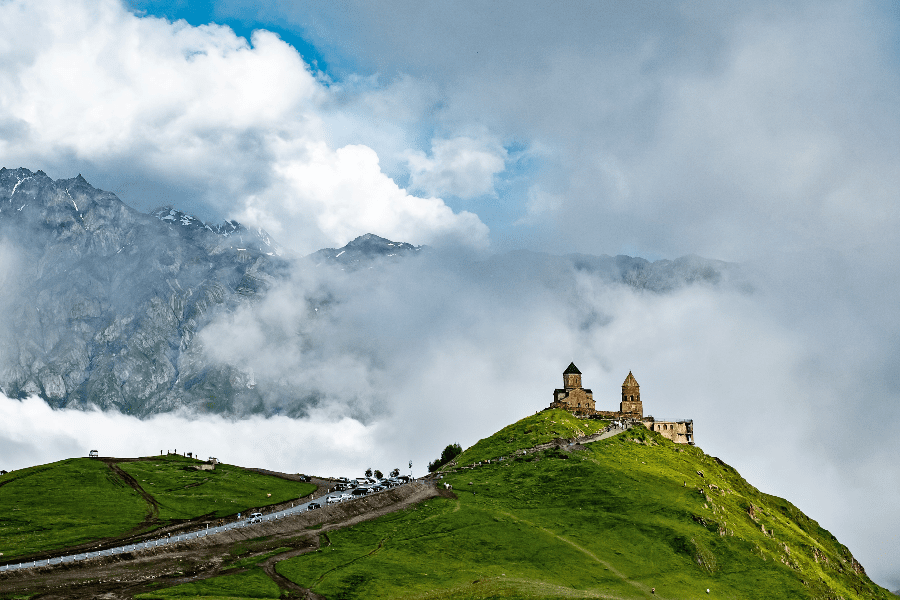
If you have three or four weeks, you can travel slowly and enjoy this beautiful part of the world.
I would suggest spending a little bit more time in Georgia , which is undoubtedly the gem of this region.
This Georgia Armenia Azerbaijan itinerary is helpful for any first-time visitor as these countries are relatively unknown to many. Perhaps it’s due to their location?
Located in between Europe, Asia, and the Middle East, it’s harder to include them in regional travels, and international travellers have discovered them only recently.
But don’t expect not to see tourists – there are plenty of them, especially in Georgia.
Table of Contents
What you need to know before you go to Georgia, Armenia and Azerbaijan
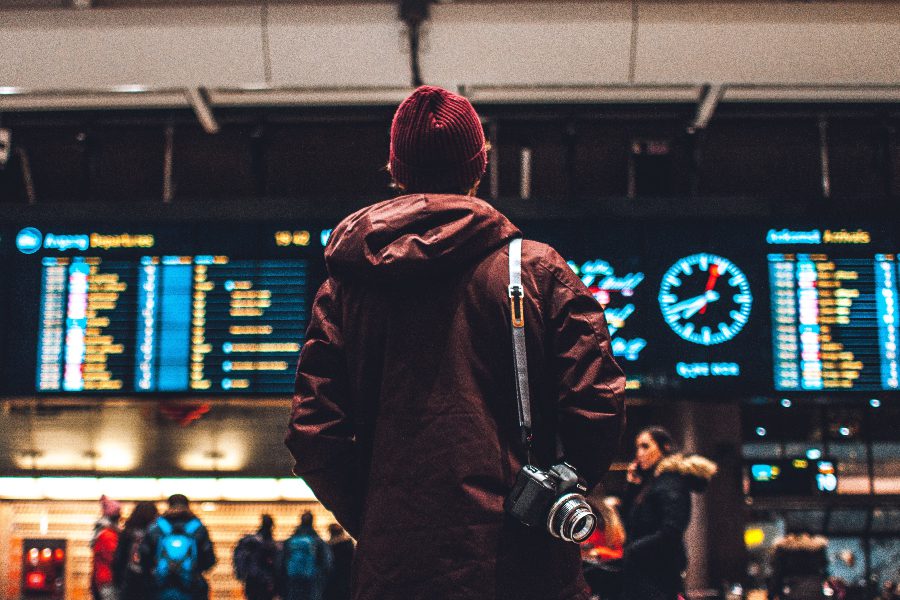
What are the countries in the Caucasus?
Firstly, there are three countries known as the Caucasus: Armenia, Georgia and Azerbaijan.
Secondly, there are also three disputed territories in the Caucasus: Abkhazia, South Ossetia and Nagorno-Karabakh.
The borders between Armenia and Azerbaijan are completely closed and it is impossible to travel between the two. Therefore it makes sense to follow this itinerary and do it in reverse.
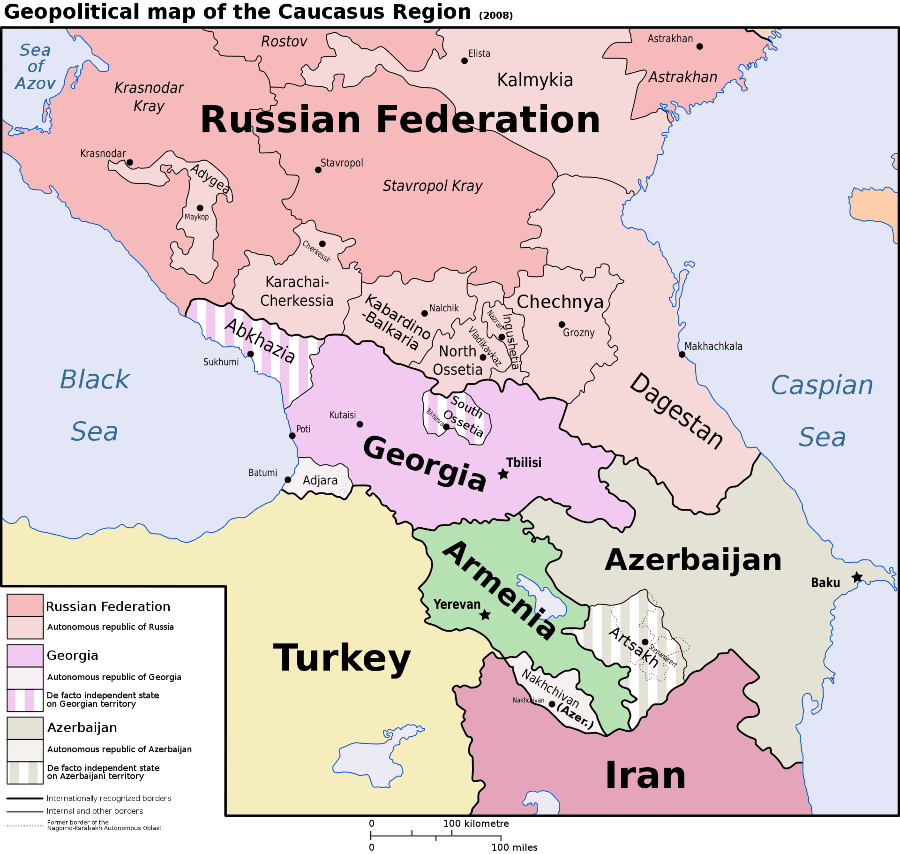
When is the best time to visit Georgia Armenia Azerbaijan?
The best time to visit is during the warmest months of summer (July & August) and the shoulder season of May, June and September.
On the other hand, if you love wine you can visit for rtveli – an annual grape harvest held in September in Georgia.
How much does it cost to travel to the Caucasus?
All three countries, Georgia, Armenia and Azerbaijan, are affordable. For example, we spent around 30 euros per person per day staying in guesthouses or apartments (we used Booking.com) and primarily used public transport.
In a nutshell, we found Armenia to be the cheapest and Azerbaijan more expensive, mainly due to the higher accommodation cost.
What language do they speak in Georgia, Armenia and Azerbaijan?
Each country has its local language: Georgian, Armenian, and Azeri. Armenian and Georgian languages have their alphabet.
But most young people do speak English, especially in Georgia. Older locals speak Russian, as all three countries were once part of the Soviet Union.
What currency do they use?
The three countries use different currencies. In Georgia, they use the Lari; in Armenia the Dram; and in Azerbaijan, they use the Manat.
There are plenty of ATMs, and it’s helpful to have some euros in cash, sometimes, you can get a better exchange rate on the ground.
Georgia, Armenia and Azerbaijan – do I need a visa?
Most nationals travelling to Georgia or Armenia as tourists do not require a visa. Currently, British and EU citizens enjoy a visa-free regime.
However, you will need a visa for Azerbaijan. Visit the Evisa page to get more info: https://evisa.gov.az/en/
What else should I know about travels in the Caucasus?
Cover up when visiting orthodox churches in Georgia and Armenia. Women must cover their heads and must wear long skirts (even if you’re wearing pants). Please note that men must wear long pants.
Many monasteries will provide a box of scarves for women to borrow during your visit, but it’s better to bring or buy your own . The large scarves provided are to be tied around your waist.

The Perfect Itinerary for Azerbaijan Georgia and Armenia: Day 1 – 17
Day 1: baku, azerbaijan.
- Day 2: A day trip to Qobustan
Day 3: Baku, Azerbaijan and depart for Georgia
Day 4: tbilisi, georgia , day 5: day trip from tbilisi to the wine region kakheti, day 6: day trip from tbilisi to kazbegi .
- Day 7: A full free day in Tbilisi or visit Mtskheta
Day 8: Svaneti region
Day 9: svaneti region, day 10: svaneti to kutaisi.
- Day 11: Kutaisi to Tbilisi
Day 12. Tbilisi to Yerevan
- Day 13: Yerevan, Armenia
Day 14: Yerevan to Dilijan
Day 15: yerevan to geghard monastery, day 16: yerevan to noravank monastery, day 17: fly out of yerevan .
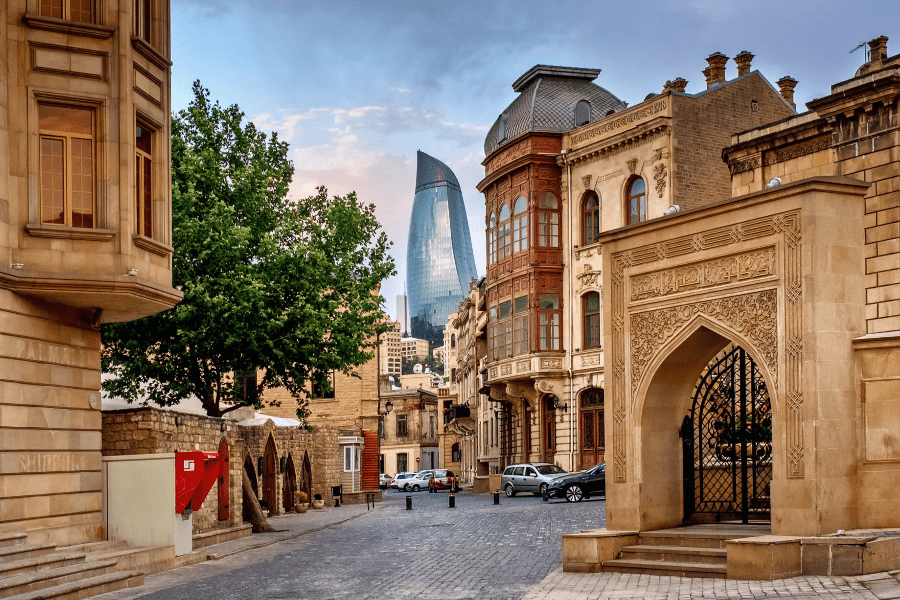
Arrive in Baku, Azerbaijan. A few flights connect Baku internationally. For instance, Qatar Airways & Etihad flights are usually the best for intercontinental travellers.
And Wizzair offers low-cost flights to Budapest, Europe.
Check-in and head out to the UNESCO World-Heritage-listed Old City. The main highlights of the city centre are the Palace of the Shirvanshahs, the Maiden Tower, Baku Boulevard, and Fountain Square.
The Flame Towers are a symbol of Baku and for the best views, you can enjoy a drink or meal in the Fairmount Hotel restaurant.
Day 2: A day trip to Qobustan ( also known as Gobustan)
Set out early to visit Qobustan. You could certainly try to negotiate a taxi to drive you there and back as public transport can be challenging. But, to save you a lot of hassle, we recommend you book this day trip on Viator . It will provide you with much in-depth experience.
Qobustan is home to UNESCO World Heritage-listed petroglyphs, and it has a small museum.
It’s located 67km away from Baku along the Caspian Coast. Therefore organising a day trip instead of public transport might be a great idea.
On your final day in Baku – visit places in the old town you missed on your first one. Enjoy cafes and shopping.
You can either book a flight with Skyscanner from Baku to Tbilisi in Georgia with Azerbaijan Airlines ( around 140 USD) or choose the overnight train!
There are three types of train tickets. I recommend the first class, which is a private compartment with two beds for two people. It costs around 35 USD.
If that is not available, book the second-class sleeper, which consists of a private compartment with four beds for four people. We shared this with a teacher from Dagestan. Train travel is a fantastic way to see the countryside and to meet locals.
Train 38 leaves Baku every day at 20:40, arriving in Tbilisi at 08:55. You can easily buy a ticket from Baku to Tbilisi at https://ticket.ady.az – select English top right and book from Baku-Pass to Tbilisi-Pass.
You must collect your ticket at least 1 hour before departure. Or buy the ticket a day before.
Where to stay in Baku? View ALL Accommodation Options here .
*You might arrive the night before if taking the flight instead of the overnight train
You will fall in love with the capital of Georgia, Tbilisi. The old town is full of amazing eateries, bars, and cafes, and people are smiley and welcoming. In other words, it is a city that will get under your skin.
Next, find the famous clock tower. Then try the local khinkali and more of the fantastic Georgian cuisine. You can find some great recommendations for Georgian meals to try in our posts about what to eat in Georgia .
Spend the day exploring the old town, walk across the Peace Bridge and then head up to Narikala Fortress which offers excellent views of the city.
Where to stay in Tbilisi:
- Budget : Fabrika Hostel & Suites (from $10/night). Dorms or private rooms. The perfect stay for a short trip to Baku, conveniently located in historical Marjanishvili, one of the most attractive neighbourhoods in Tbilisi.
- Mid-Range : Royal Plaza Hotel (from $33/night). Prime location, clean & comfortable.
- Boutique : City Inn Tbilisi (from $48/night). Clean, comfortable rooms and a great breakfast included. This hotel is in a great location, close to many main attractions.
- Luxury: Hilton Garden Inn Tbilisi Chavchavadze – (from $120/night).

9 Best Cafes in Tbilisi
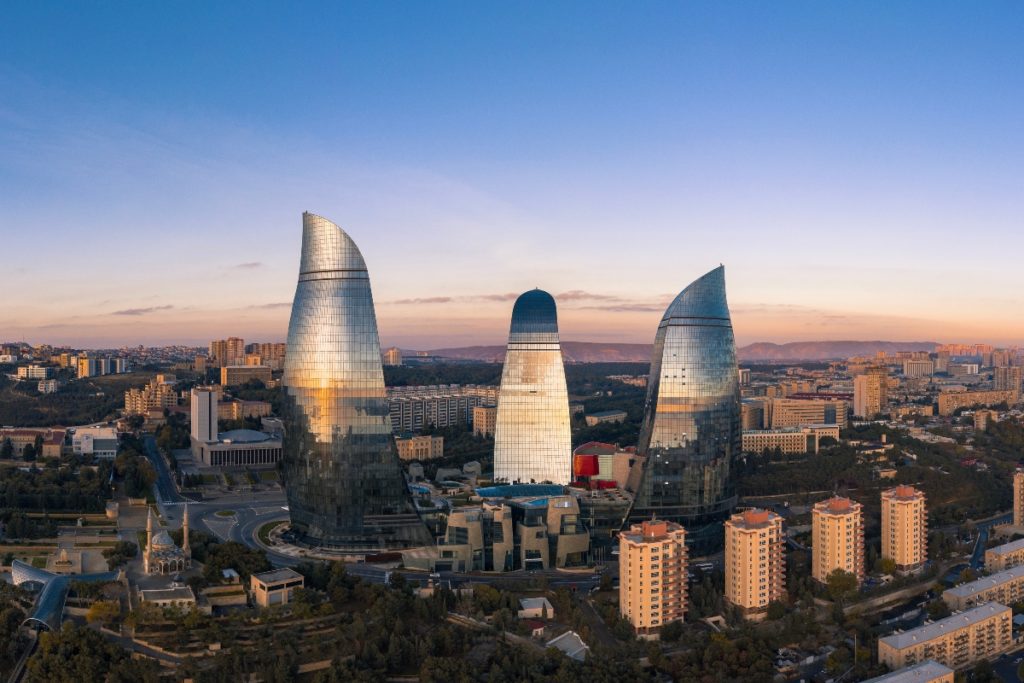
What to Eat in Georgia – The Ultimate Food Guide
Georgia is known for amazing wine, and it is considered the birthplace of today’s winemaking. Georgian wines are named according to the source region, village, or district just like in France.
We recommend this private day tour of the Kakheti wine region from Tbilisi. This is the most popular region to visit from the capital.
If you have some extra time, you could also spend a day or two here in the beautiful cobblestoned village of Sighnaghi.
You can reach Kakheti by shared or private taxi from ISANI Metro Station – pay 40 GEL for a private car or 10 GEL per seat. You won’t wait longer than 30-40 minutes.
If you’re on a budget and have more time you could get there on a minibus or local Mashrtuka for just 6 GEL. They depart from Samgori Metro station every 2 hours and usually take up to 2.5 hours.

While you could easily spend another day (or a week) in Tbilisi, you should consider another day trip to Kazbegi.
You have probably seen a picture of the Gergeti Trinity Church before – it might have been a reason you put Georgia on your bucket list.
To get to Kazbegi you will need to take a Marshrutka to the town of Stepantsminda. Marshrutkas leave every 4 hours from the outside of Didube Metro station and take about 3 hours.
Due to the time getting up and down and possibly trekking to the Gergeti Trinity Church (which takes around 4 hours as a round trip if walking, but hiring a taxi would be faster), an overnight in Kazbegi is required – we stayed at this wonderful guesthouse .
You could visit Kazbegi on a day trip and return to Tbilisi the same day.
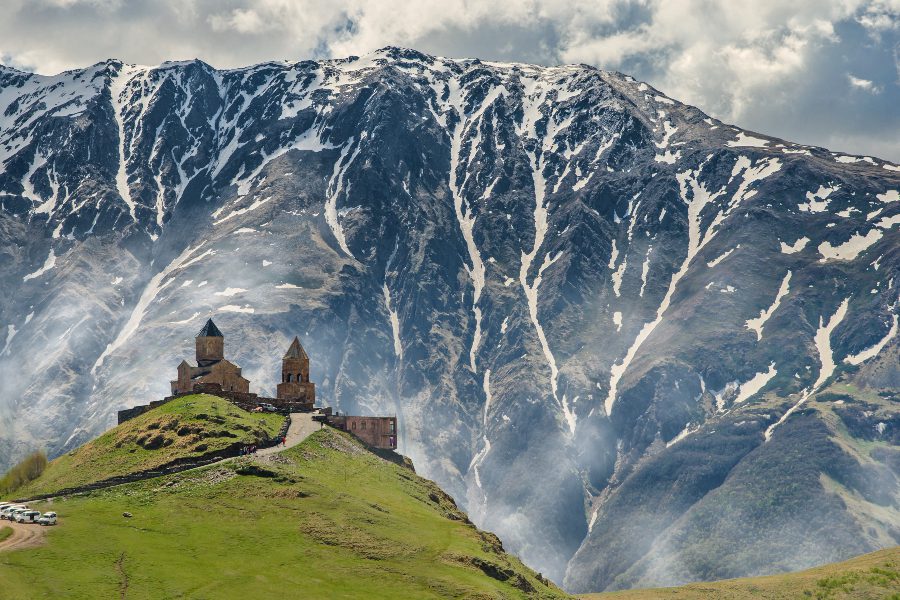
Day 7: A full free day in Tbilisi or visit Mtskheta
You could spend the full day in Tbilisi, but for a nearby experience, visit the former capital and UNESCO-listed Mtskheta.
Getting there on local transport is easy and cheap, or hire a taxi (40 minutes). While you’re there, check out the sixth-century Georgian Orthodox Jvari Monastery. If you head there early, you will have the afternoon-evening back in the capital – for more delicious food.
Here are the Top 9 best cafes in Tbilisi.
Alternatively, you could also visit Davit Gareja Monastery.

Viator is one of our favourite sites for booking food tours, day tours, and attraction tickets. It’s so easy to just browse the tours on Viator , pay online, and immediately receive your tour voucher.
You would return from Kazbegi or Mtshekta the day before and overnight in Tbilisi. Now it’s time to head up to the famous Svaneti region and the town of Mestia. Known for the famous stone towers and villages isolated from the rest of Georgia and the world.
The Svaneti region is so unique its people have their own Svan language.
Getting here takes all day or nine hours by marshrutka from Tbilisi Station Square. However, there are some epic views en route, and you will stop for lunch.
Alternatively, you could choose to fly up here with Vanilla Sky Airlines (Which can be booked via a local agent only), or you could break the journey in Kutaisi, but I suggest doing that on the way back.
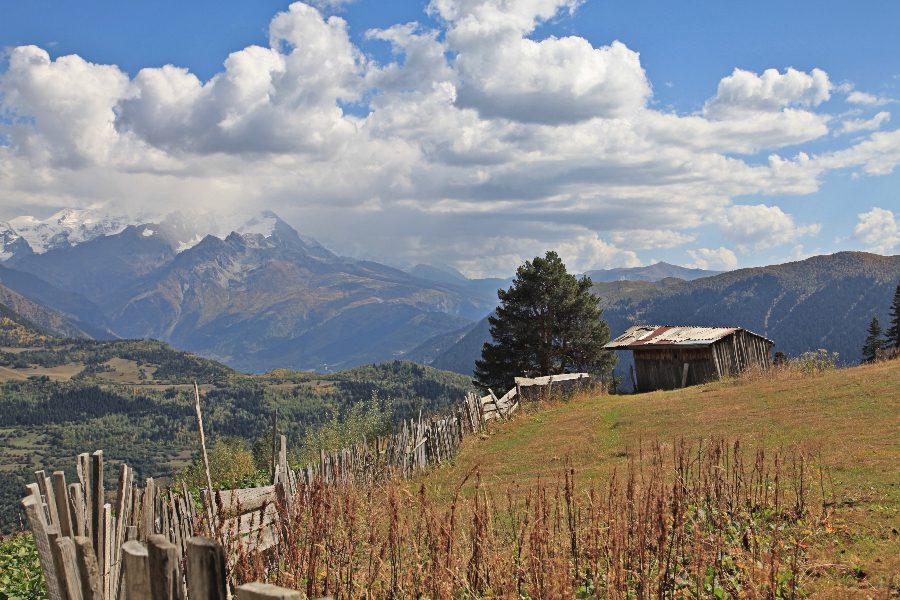
It is up to you how you spend the free day. You could hike up to the Mestia Cross, explore the small town of Mestia and check out the Svaneti Museum of History and Ethnography. You could trek to Chaladi Glacier.
Or, ideally, head to the picturesque town of Ushguli – the highest settlement in Europe at an elevation of 2,200m above sea level.
We have spent five days in Svaneti, so trust me, there is plenty to do, but even two nights will give you a taste of this region.
Where to stay in Svaneti: Set in Mestia, Mestia House is an excellent place to stay—clean, spacious rooms with comfortable beds and a great breakfast.
View more hotels/guesthouses in Mestia
Travelling to a country with a different currency? Avoid ATM transaction fees and pay in local currency with a Wise Card . We love this card; it has saved us so much in fees.
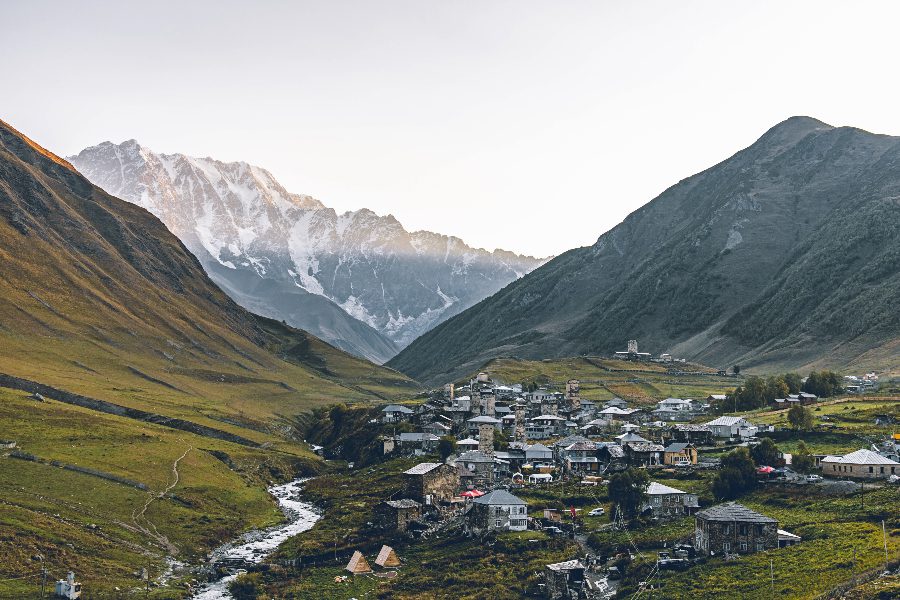
Take a marshrutka from Mestia to Kutaisi, it takes about 5 hours. Spend the afternoon exploring the town. Check out the Kutaisi Green Bazaar and the old town. You could add two nights here and visit Imareti – another wine region on a free day.
Where to Stay in Kutaisi: My top pick is the comfortable Old Kutaisi Bed & Breakfast , just a short walk from the centre of town and fantastic breakfast included in the room rate, from $15/night.
Check out more accommodations in Kutaisi
Day 11: Kutaisi to Tbilisi
Continue the journey to Tbilisi on local marshrutka. This will take you about 4 hours. Then spend the afternoon at your leisure.
However, this is a great opportunity to check out some of the best cafes in Tbilisi or explore different neighbourhoods.
If you were trying to make up some time you could head to Yerevan the same day – please note it takes 6 hours so it would be a full day of travel.
Start your day early and say goodbye to Georgia. Take the minivan (marshrutka) from Metro Station Avlabari . The journey will take about 5 or 6 hours.
Where to stay in Yerevan:
- Budget : Santorini Guesthouse (from $7/night). Dorms or private rooms. Great value for money.
- Mid-Range : Inter Boutique Hotel (from $27/night). It has a great location, comfortable rooms, and great breakfast included.
- Boutique : Arève Résidence Boutique Hotel (from $50/night). Great location, with superb reviews.
- Luxury: Armenia Marriott Hotel Yerevan (from $140/night).
Day 13: Yerevan – a full day to explore
Yerevan feels very different to Baku or Tbilisi. It is a huge city; there are cafes, cool wine/jazz bars and some epic squares. Furthermore, the food is also incredible, and the capital has a few fantastic places to eat.
Don’t miss the Yerevan Cascade, the Vernissage, the Armenian Genocide Memorial and the Republican Square. Also, if you want to try something very Armenian – try Ararat brandy.
Or let a local guide take you around to see the city’s highlights in a classic car on this Yerevan City Tour .
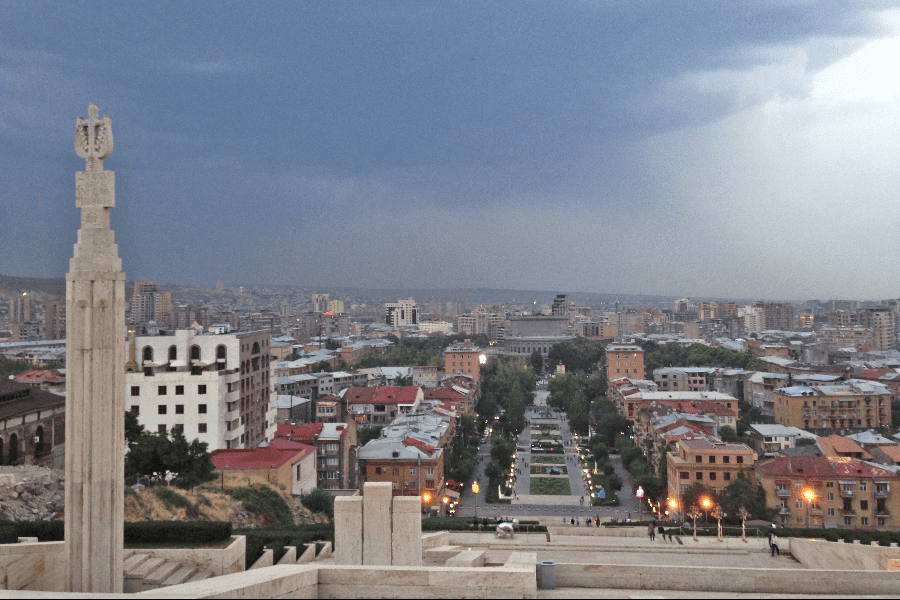
- 🔥 Hot Tip: Book accommodation on Booking.com
- 🎟 Book your tickets online: We use Viator and GetYourGuide
- 🔋 Stay charged: This Belkin Power Bank is essential!
- 📸 Join a Group Tour: Search Tourradar for Group Tours
- ✅ Get Connected with eSIM: Easy and affordable! View eSIM
If you were short on time you could fly out today after spending 2 weeks in the Caucasus making the perfect Georgia Armenia Azerbaijan itinerary.
But I do hope you have more time to see more of Armenia because it’s worth it.
Today, head out to Dilijan – known as the Switzerland of Armenia. You want to leave on the first mashrutka so you can return on the last one, which goes around 4 pm. The journey takes about 1.5 hours.
Dilijan is home to a few Armenian cultural sites like the Haghartsin Monastery or Goshavank Monastery.
But I suggest you go to Parz Lake first – a popular spot for locals during summer. This is the largest body of water in Armenia. Also, you can rent a boat or enjoy the scenery.
Tell the driver in Yerevan that you want to go to Lake Sevan. He will charge you a little bit more to drop you off, but it will save you the hassle of getting another bus from Dilijan.
On the other hand, you could also visit Garni, Gegard and Lake Sevan on a day trip.
After the lake, head into Dilijan town. You can spend some time in the spa town or, if you are keen – Visit Haghartsin Monastery, which is about 30 minutes away.
After that, return to Yerevan in the late afternoon.
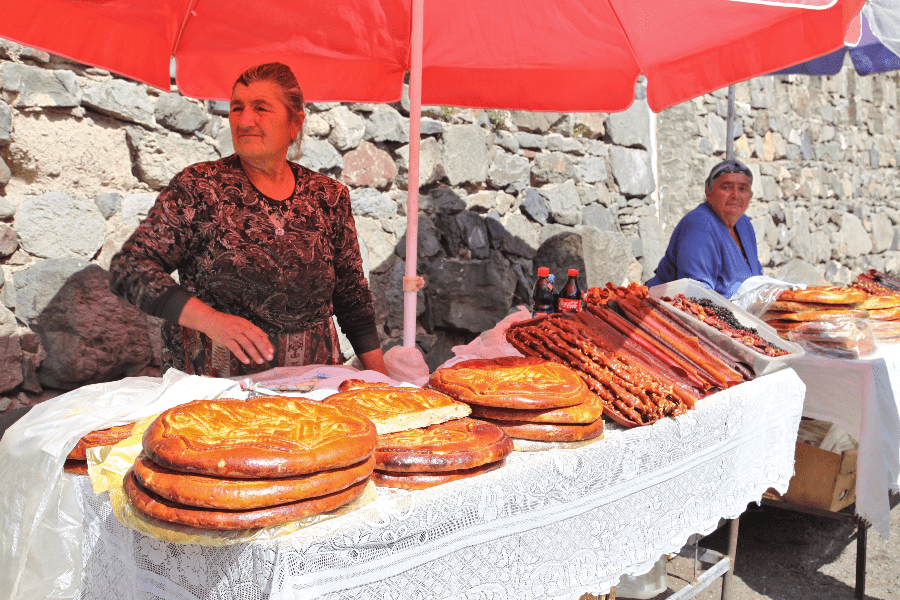
Enjoy having Yerevan as a base. Next up, head to the World Heritage Site carved out of the rock face at the Azat River Gorge – the famous Geghard Monastery.
The monastery is incredible, but you will probably be one of the few visitors there. The monastery was built in the 13th century; you can visit its grounds.
If you are taking public transport, you must pay for a taxi from the town of Goght, but it was no problem for us.
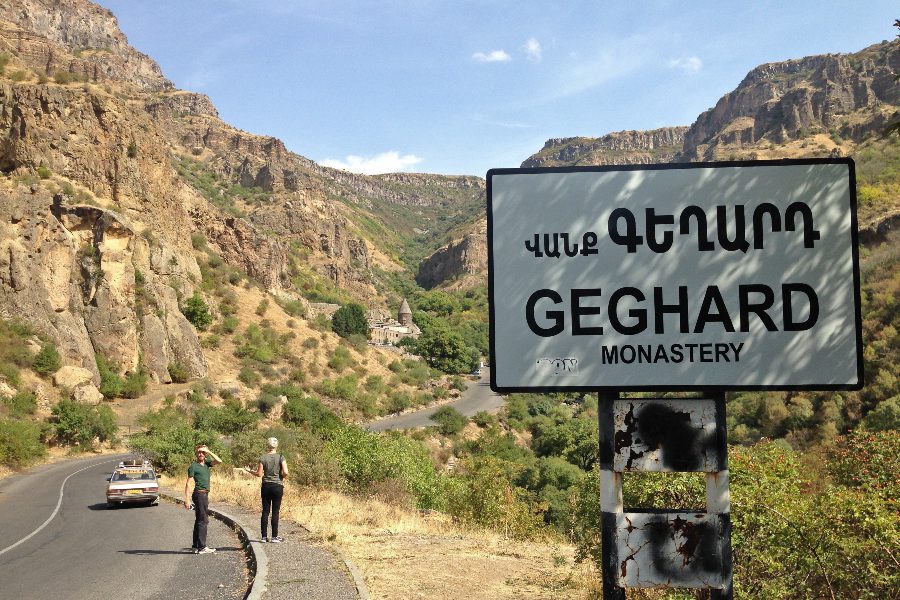
I would understand if you prefer to spend an extra day in Yerevan.
But if you wish to get out there again and see another fantastic monastery, this time with amazing landscape views, then Noravank is perfect.
There are day trips you can choose here to make it easier, or head out here on public transport. Come early (depart at 8 am), and you will have the place to yourself.
Consisting of different tower-like churches, Noravank is different to Geghard.
To get here, catch a marshrutka from the Arshakunyats Bus Station heading to Yeghednadzor – it will take 2 hours.
During the trip, tell the driver that you are going to the monastery. As a result, he will drop you off outside Edem Restaurant.
Then, you can catch a taxi, hitchhike, or walk the 6 km to the monastery.
The time has come to leave. However, with some great cheap flights with Wizzair (always find the best deals on Skyscanner ), you can get to Europe for a fraction of the cost!
If you are flying internationally, you can fly with Qatar Airways via Doha and virtually anywhere.
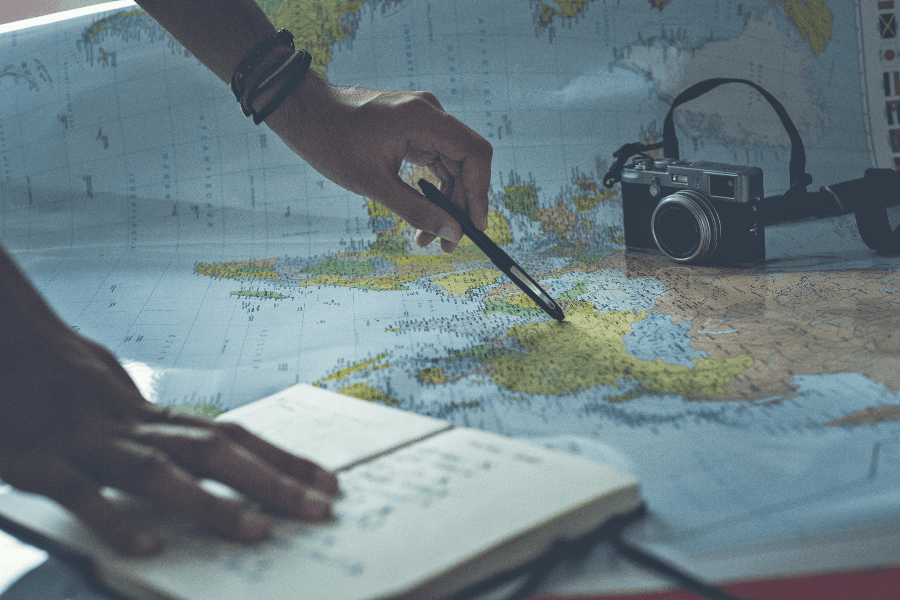
Get Connected with eSIM

Get connected easily on your travels—buy an eSIM! It works like an app: buy it, download it, and get connected in minutes! It’s easy, affordable, and convenient. Keep your original phone number, too!
Use our code: RACHEL5045 to get $3 off your first purchase!
How to create your own Georgia Armenia Azerbaijan Itinerary
Planning the perfect Georgia-Armenia-Azerbaijan itinerary can seem overwhelming at first – but if you fly into Baku and follow this itinerary, you’ll be able to visit the highlights.
If you have less time, then I recommend flying in and spending your time between Georgia and Armenia. If I had to choose a week, I would stick to Georgia – you could base yourself in the capital and do day trips.
Don’t be afraid to choose fabulous day trips with Viator or Get Your Guide if you are not keen on travelling independently.
In short, these will make your travels effortless. Firstly you’ll learn a lot from your guides, and secondly, you will meet other visitors too.
Since many tours are very reasonably priced, it’s worth considering them while here.
Join a Group Tour
We recommend G Adventures . This small-group adventure in Georgia & Armenia is ideal.
Alternatively, search Tourradar for the best tour suited to your travel style!
Make sure you get Travel Insurance before hitting the road. We recommend Heymondo & SafetyWing
Click here and get 5% off Heymondo from us!
This region of the world has some incredible cuisine. Check out our detailed post about what to eat in Georgia – a food lover’s guide .
We’ve found the 9 best cafes in Tbilisi , and we explain where to stay in Tbilisi and some fantastic areas to choose from.
And when you’re visiting Azerbaijan, I recommend you visit Nakhchivan, the fascinating exclave of Azerbaijan.
The cuisine in Azerbaijan is fantastic! Don’t miss these 10 most popular dishes.
Travel Tips for Asia
We have many travel guides and tips for Asia— a fascinating continent!
Delicious cuisine can be enjoyed across Asia, and our food map of Asia will inspire your food journey.
These top 5 best street foods in Asia are unmissable! We explain Central Asian food, including seven popular foods in this region.
Our Southeast Asia packing list will be helpful if you’re travelling here.
Furthermore, if you plan to travel long-term (or at least until the money runs out), these 21 cheapest countries to visit will help you make your hard-earned dollars stretch a bit further.
Not surprisingly, our top 10 best countries for food lovers include a few Asian countries.
You’ll need to stay connected while travelling in Asia. We recommend eSIM. It’s easy, reliable and affordable. View eSIMs for individual Asian countries , or consider a regional eSIM for Asia (which covers 18 countries).
If your travels in Asia are part of a much larger global adventure, then a Global eSIM may be the answer. It connects you in 124 countries , offering data-only eSIM and data/call/text eSIM . The Global eSIM has been a game-changer; we couldn’t imagine travelling without it now.
If you want to travel with like-minded travellers, consider joining a group tour. View the best deals on group tours in Asia .
Check out our best-ever travel tips compiled from more than twenty years of experience.
Travel Planning Resources
✈️ Flights : We use Skyscanner to book cheap flights worldwide.
🏨 Accommodation : Booking.com is our preferred platform for booking hotels and accommodation. We use Vrbo to book apartments and long-term stays.
🏥 Travel Insurance : We recommend Heymondo ( Get 5% off Heymondo) & SafetyWing
🚌 Transportation : Trainline is the best website to reserve trains. We use Omio to book transport worldwide. For travel in Asia, we use 12Go.
🚘 Car Rental : We use DiscoverCars to book rental cars worldwide.
👫 Group Tours : G Adventures OR compare multi-day tours worldwide with Tourradar .
📸 Day Tours & Trips : GetYourGuide & Viator are the only two platforms you need.
📚 Lonely Planet: The Best Range of Travel Guides & Ebooks , and FREE Shipping! (use code RACHELDAVEY10 for a 10% discount)
🎒 Luggage : Osprey Farpoint 40L Backpack or Samsonite Luggage Range.
🛄 What to Pack: Don’t forget your Universal charger and a good power bank . To help you pack the essentials, here is our ULTIMATE Packing List for all Travellers .
🐶 Become a House Sitter: Join Trusted Housesitters and enjoy FREE accommodation worldwide. Use our invite to receive 25% off your new membership.
💰 Send Money Anywhere: WISE & Revolut are the best online accounts that let you send money, get paid, and spend money internationally. Both are so easy to use and way cheaper than any bank transfer.
📶 Stay Connected: Airalo eSIM allows you to get connected the moment you land at your destination, and you can avoid those expensive data roaming charges. We LOVE this product! Use promo code NOMAD15 for 15% off ALL eSIMs (new Airalo users only) OR use NOMAD10 for 10% off ALL eSIMs (for existing Airalo users)
✅ Check out our Travel Gear and Travel Resources for more valuable tips to save you money!
Tasty Food Adventures

Best Cooking Class in Puerto Vallarta (2024)

17 Best Danang Vietnam Restaurants – A Complete Guide

What is Slovak Food? 18 Most Popular Food from Slovakia
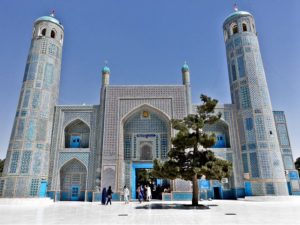
Women of Afghanistan – Lunch Inside an Afghan home
See all Food Adventure blogs
Expert Travel Guides

7 Most Colourful Cities in the World
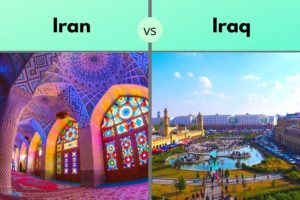
Iran vs Iraq – What is the Difference?

Madagascar in Two Weeks – The Perfect Itinerary 2024

How To Get to Lake Como from Milan – 3 Easy Options
See all our Travel Guides
Trusted Hints & Tips

Why you Should Use Airbnb When you Travel – 11 Top Reasons

11 Tips How to Save Money to Travel the World

9 Best Tips for the Big Lap Of Australia

Bad Travel Days – The Downside Of Travel
See all our expert Hints & Tips
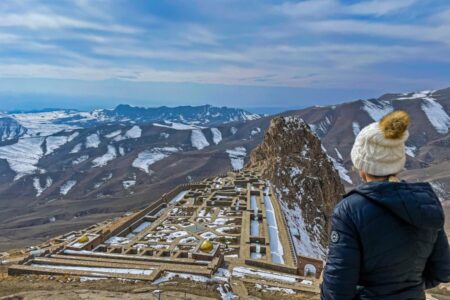
Visiting Nakhchivan – The Fascinating Exclave of Azerbaijan

Where to Stay in Tbilisi, Georgia

Leave a Reply Cancel reply
Your email address will not be published. Required fields are marked *
Post Comment

Andrew Montgomery
Georgia, Armenia & Azerbaijan
This thrillingly mountainous, scenically spectacular and culturally diverse region is where Asia and Europe rub up against each other, with often unpredictable and fascinating results.
Attractions
Must-see attractions.

Heydar Aliyev Center
Vast and jaw-droppingly original, this Zaha Hadid building is a majestic statement of fluid 21st-century architecture forming abstract waves and peaks…

Gelati Monastery
Western Georgia
This Unesco World Heritage–listed monastery complex, on a wooded hillside 8km northeast of Kutaisi, is an outstanding example of Golden Age architecture…
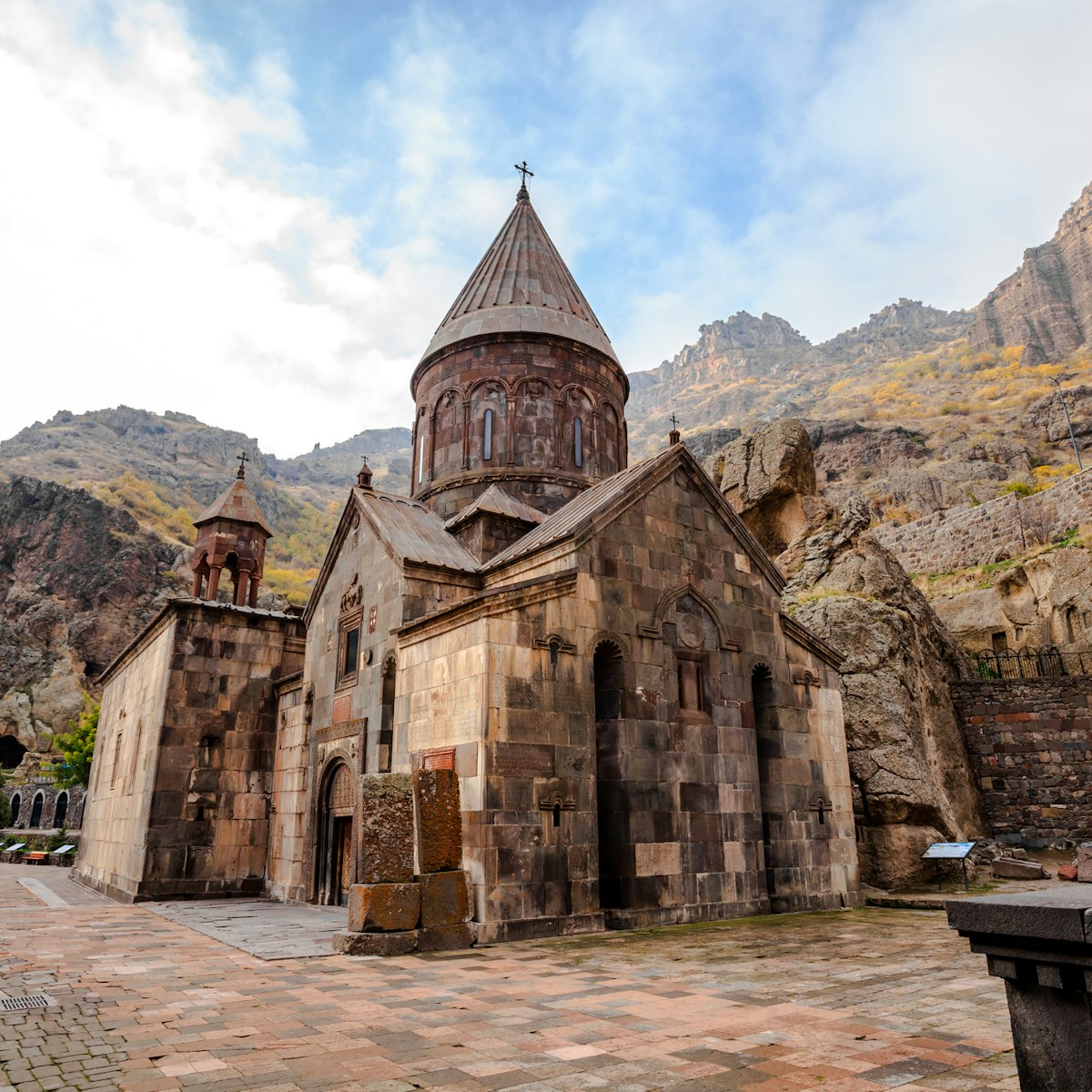
Geghard Monastery
Garni & Geghard
Named after the lance that pierced Christ’s side at the crucifixion (a shard is now on display at the museum in Etchmiadzin), this World Heritage–listed…
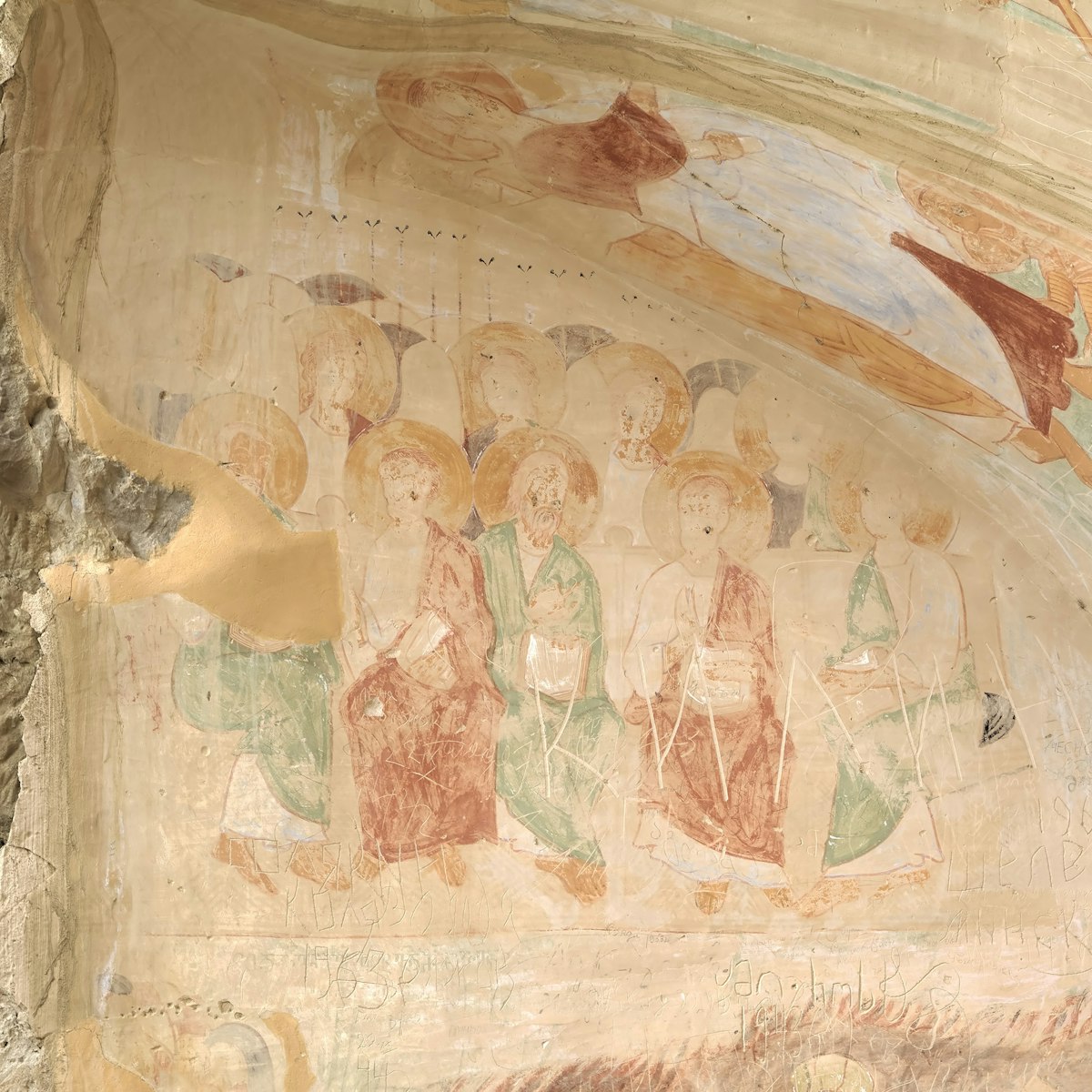
Udabno Monastery
Davit Gareja
Less of a monastery than a series of cave-hewn chapels, Udabno runs along a steep escarpment looking down to grassy plains in Azerbaijan. While many caves…
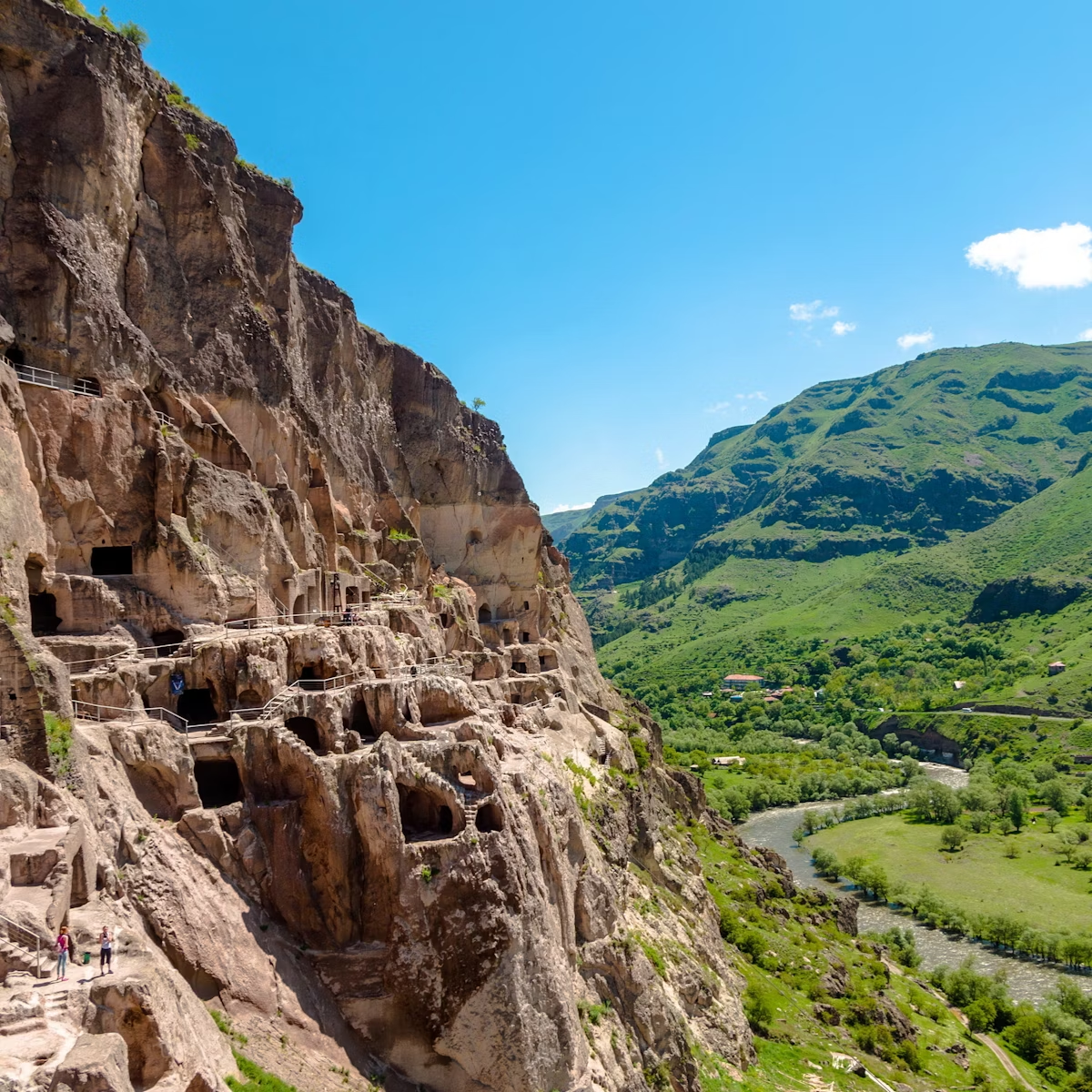
The remarkable cave city of Vardzia is both a cultural symbol and a spectacular natural phenomenon with a special place in Georgian hearts. King Giorgi…
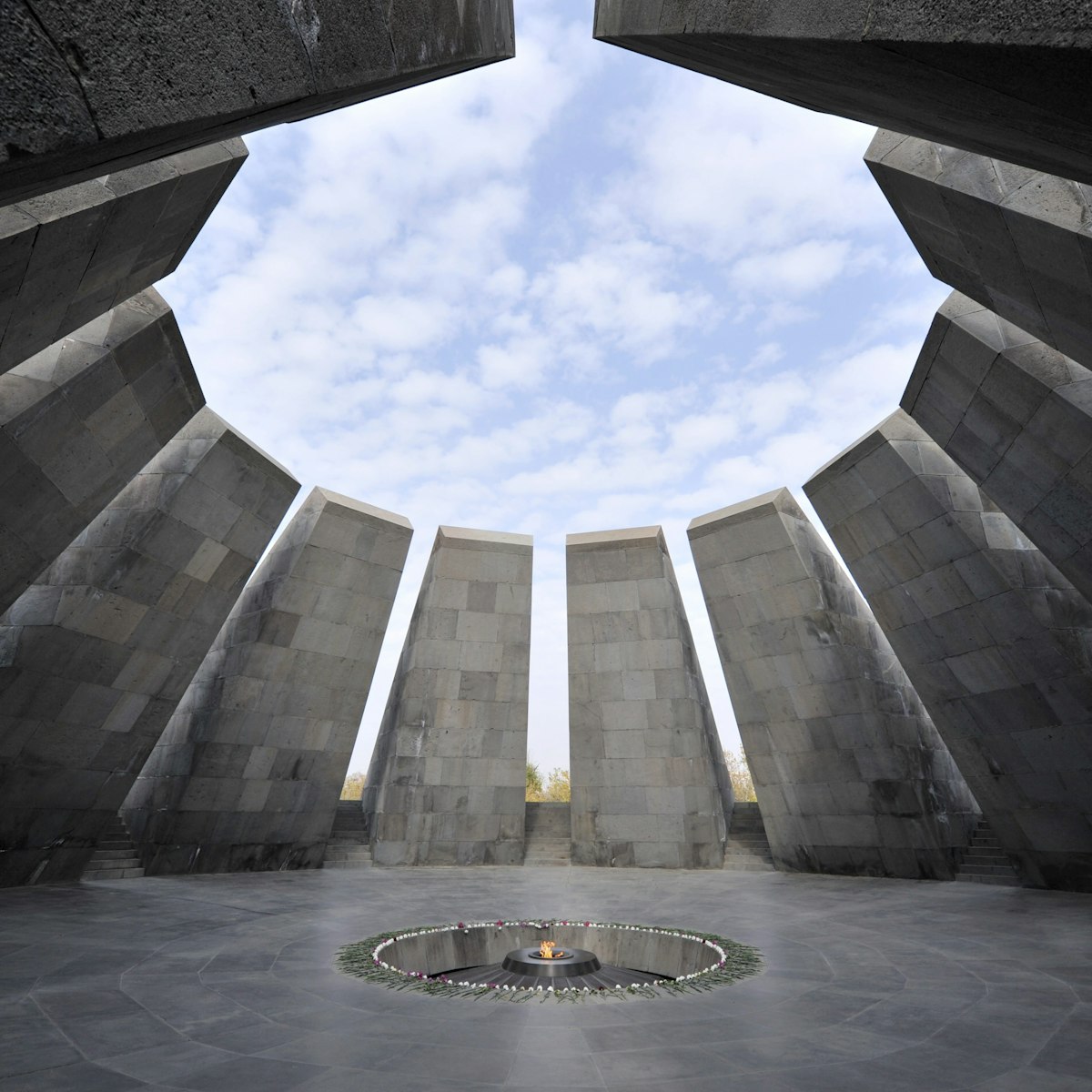
Armenian Genocide Memorial & Museum
Commemorating the massacre of Armenians in the Ottoman Empire from 1915 to 1922, this institution uses photographs, documents, reports and films to…
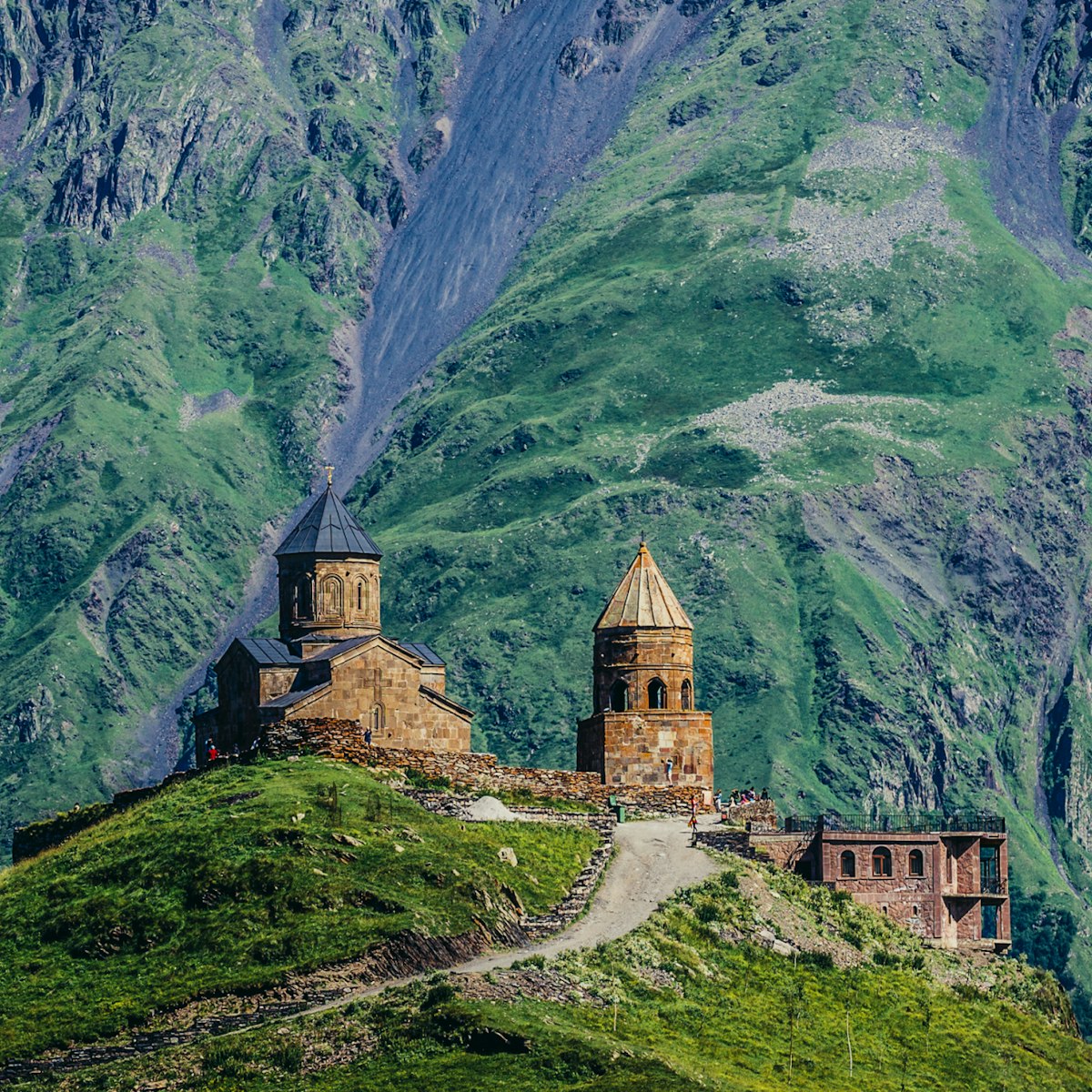
Tsminda Sameba Church
Stepantsminda
This 14th-century church 2200m above Stepantsminda has become almost a symbol of Georgia for its incomparably photogenic hilltop setting with mighty Mt…
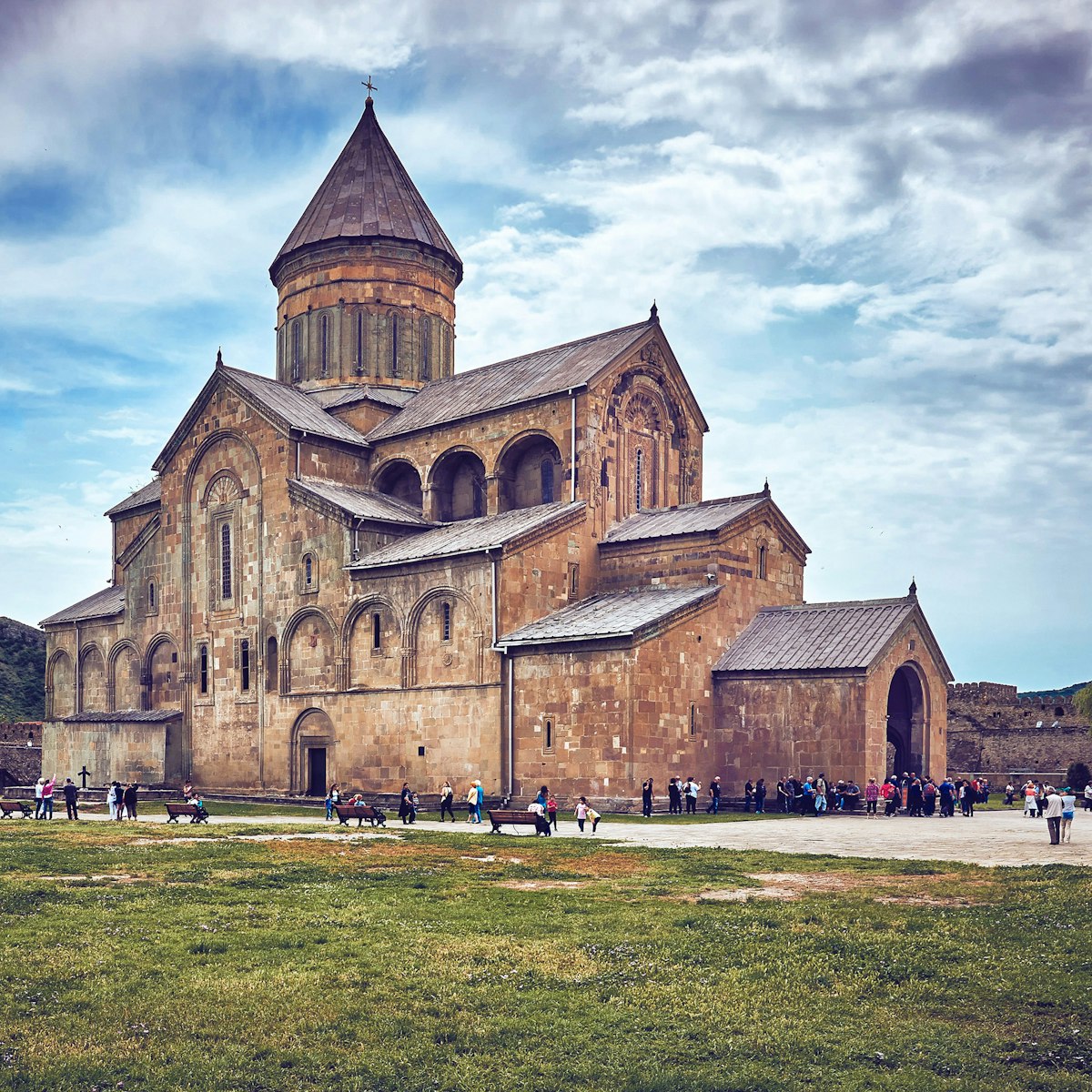
Svetitskhoveli Cathedral
Southern Georgia
This extraordinary (and for its time, enormous) building dates from the 11th century, early in the golden age of Georgian church architecture. It has an…
Plan with a local
Experience the real Armenia
Let a local expert craft your dream trip.
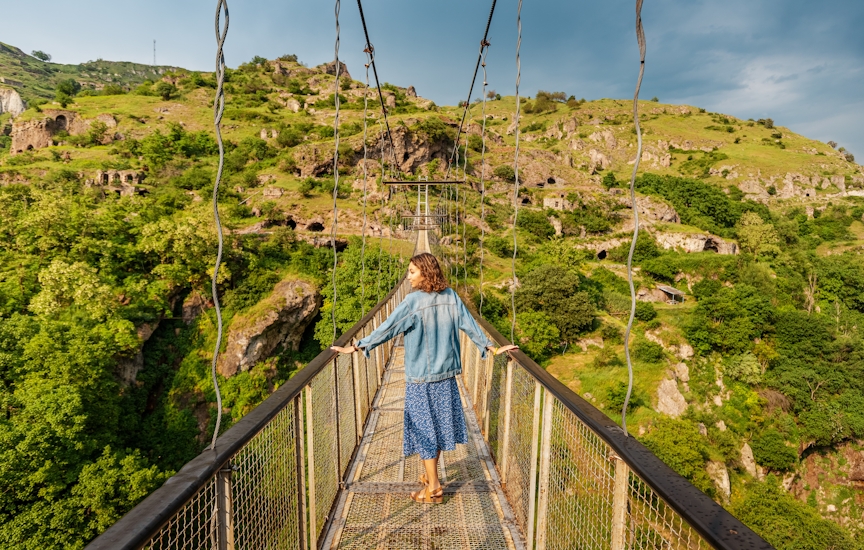
Latest stories from Georgia, Armenia & Azerbaijan
Filter by interest:
- All Interests
- Adventure Travel
- Art & Culture
- Beaches, Coasts & Islands
- Food & Drink

Jan 9, 2024 • 4 min read
Get help from a local expert to plan an unforgettable trip to Armenia.

Sep 5, 2019 • 5 min read
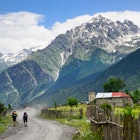
May 31, 2018 • 5 min read
Georgia, Armenia & Azerbaijan and beyond
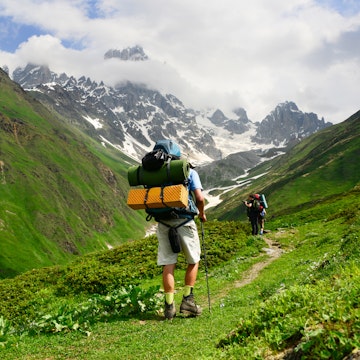

Search Smartraveller


Latest update
Exercise normal safety precautions in Armenia overall.
Higher levels apply in some areas.
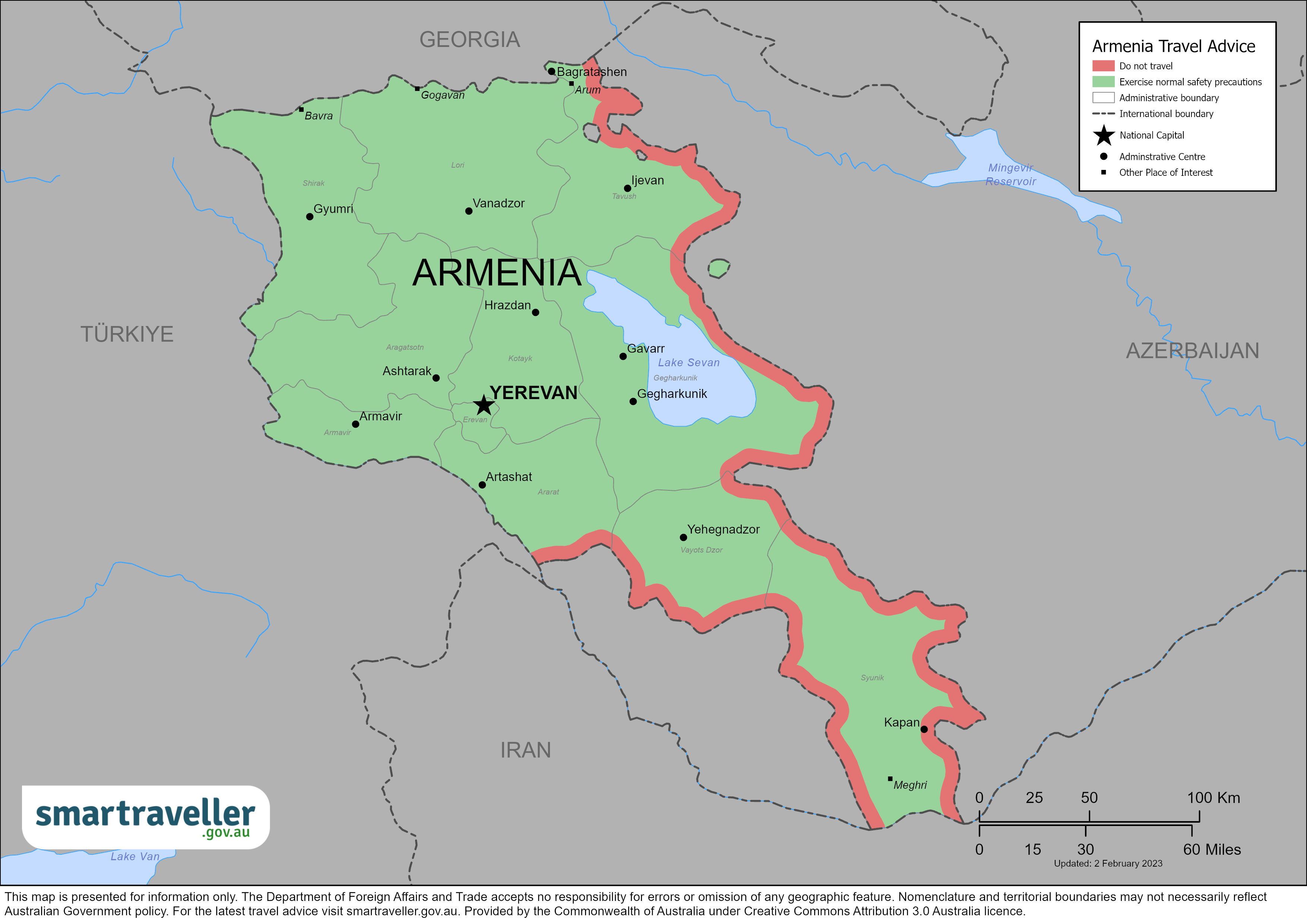
Armenia (PDF 715.54 KB)
Europe (PDF 2.62 MB)
Local emergency contacts
Fire and rescue, medical emergencies.
Call 102 or contact the nearest police station.
Call 112 or 911 for the emergency hotline.
Advice levels
Exercise normal safety precautions in Armenia.
Do not travel to within 5kms of Armenia's border with Azerbaijan.
Do not travel to within 5kms of Armenia's border with Azerbaijan due to the risk of armed clashes.
See Safety
- Do not travel within 5km of Armenia's border with Azerbaijan due to the risk of regular armed clashes, volatile security environment and unmarked landmines. Monitor the media for developments and follow the advice of local authorities.
- Protests occur in Yerevan, Gyumri and other major cities. These can turn violent. Avoid large public gatherings.
Petty crime, such as pickpocketing and theft from cars, is common. Be careful on trains to and from Georgia.
Full travel advice: Safety
- Some medications are illegal in Armenia, such as some sleeping tablets and medications containing codeine. Check your medication is legal before you travel.
- Common foodborne, waterborne, and other infectious diseases include typhoid, hepatitis and tuberculosis. Drink only boiled or bottled water. Avoid raw or undercooked food.
- Standards in public hospitals are basic, especially outside Yerevan. If you're seriously ill or injured, you'll need medical evacuation. Ensure your travel insurance covers this.
Full travel advice: Health
- Don't use or carry illegal drugs. Penalties include long prison sentences.
- Always carry a copy of your passport. Show it to the police if asked.
- Be careful when taking photos. Photographing government or military sites, monuments or officers in uniform is illegal.
- Law enforcement agencies in Armenia cooperate closely with agencies in Commonwealth of Independent States (CIS) countries. If you commit an offence in a CIS country, you may be detained in another and extradited for prosecution.
- Armenia recognises dual nationality. You must travel on your Armenian passport if you're a dual national. Australian officials may only be able to give you limited consular help. You may need to do military service if you're male and aged between 18 and 28. Check with your nearest Armenian embassy or consulate before you travel.
- Same-sex relationships are legal but aren't widely accepted. Discrimination against LGBTI people is common. Avoid public displays of affection.
Full travel advice: Local laws
You don't need a visa for Armenia if you're staying for up to 180 days per year.
- Entry and exit conditions can change at short notice. Contact the nearest embassy or consulate of Armenia for the latest details.
- Armenia has strict import and export rules. These include antiques, firearms, pornographic material, communication equipment and cash amounts of USD 10,000 and over or equivalent in other currency. Get approval from the Armenian Ministry of Culture to export antiques or other items that could have historical value.
- Use registered taxis. Get your hotel to arrange one. Don't hail taxis in the street. Sit in the back seat.
Full travel advice: Travel
Local contacts
- The Consular Services Charter details what we can and can't do to help you overseas.
- Australia doesn't have an embassy or consulate in Armenia. For consular help, contact the Australian Embassy in Russia .
- To stay up to date with local information, follow the Embassy's social media accounts.
Full travel advice: Local contacts
Full advice
Civil unrest and political tension, demonstrations and protests.
Public protests and events that draw large groups of people can turn violent.
Protests and demonstrations can occur in Yerevan, Gyumri and other major cities. They're generally peaceful but can escalate.
To stay safe during periods of unrest:
- avoid the affected areas
- monitor local media and other sources
- follow the advice of local authorities
More information:
- Demonstrations and civil unrest
Conflict zones
Due to the risk of armed clashes, do not travel to within 5kms of Armenia's border with Azerbaijan.
The border areas between Armenia and Azerbaijan contains mines and unexploded ordnance. The police or the military will likely stop anyone venturing within 5km of these borders. Some parts of the Armenia and Azerbaijan border haven't been agreed between the states.
Cars and other vehicles on the roads from Kayan and Ijevan to Noyemberyan could be attacked.
Terrorism is a threat worldwide.
Travellers have reported harassment, mistreatment and extortion by police or other local officials.
To protect yourself from petty crime:
- look after your belongings, particularly in crowded places
- always lock your car doors
- park your car in a secure facility if possible
- monitor local media for crime news
Cyber security
You may be at risk of cyber-based threats during overseas travel to any country. Digital identity theft is a growing concern. Your devices and personal data can be compromised, especially if you’re connecting to Wi-Fi, using or connecting to shared or public computers, or to Bluetooth.
Social media can also be risky in destinations where there are social or political tensions or laws that may seem unreasonable by Australian standards. Travellers have been arrested for things they have said on social media. Don't comment on local or political events on your social media.
More information:
- Cyber security when travelling overseas
Climate and natural disasters
Armenia is in an active earthquake zone. Landslides may occur.
To protect yourself if there's a natural disaster or severe weather :
- secure your passport in a safe, waterproof location
- keep in contact with your friends and family
Register with the Global Disaster Alert and Coordination System to receive alerts on major disasters.
Travel insurance
Get comprehensive travel insurance before you leave.
Your policy needs to cover all medical costs, including medical evacuation. The Australian Government won't pay for these costs.
If you can't afford travel insurance, you can't afford to travel. This applies to everyone, no matter how healthy and fit you are.
If you're not insured, you may have to pay thousands of dollars up-front for medical care.
- what activities and care your policy covers
- that your insurance covers you for the whole time you'll be away
Physical and mental health
Consider your physical and mental health before travelling, especially if you have an existing medical condition.
See your doctor or travel clinic to:
- have a basic health check-up
- ask if your travel plans may affect your health
- plan any vaccinations you need
Do this at least 8 weeks before you leave.
If you have immediate concerns for your welfare or the welfare of another Australian, call the 24-hour Consular Emergency Centre on +61 2 6261 3305 or contact your nearest Australian Embassy, High Commission or Consulate to discuss counselling hotlines and services available in your location.
- General health advice
- Healthy holiday tips (Healthdirect Australia)
Not all medication available over the counter or by prescription in Australia is available in other countries. Some may even be considered illegal or a controlled substance, even if prescribed by an Australian doctor.
Some sleeping tablets and medications containing codeine are controlled in Armenia.
If you plan to bring medication, check if it's legal in Armenia. Take enough legal medication for your trip.
You may be fined or jailed if you have restricted medication.
Carry a letter from your doctor stating:
- what the medication is
- your required dosage
- that it's for personal use
Health risks
Foodborne, waterborne and other infectious diseases are common, including these listed by the World Health Organization:
- tuberculosis
Serious outbreaks sometimes occur.
To protect yourself from illness:
- drink boiled water or bottled water with sealed lids
- avoid ice cubes
- avoid raw and undercooked food, such as salads
Get medical advice if you have a fever or diarrhoea.
- Infectious diseases
HIV/AIDS (World Health Organization) is a risk in Armenia. Take precautions if you engage in activities that may expose you to the virus.
Medical care
Medical facilities.
Standards in public hospitals are basic, especially outside Yerevan.
If you become ill or injured, you may need to be evacuated. Medical evacuation can be very expensive.
You're subject to all local laws and penalties, including those that may appear harsh by Australian standards. Research local laws before travelling.
Law enforcement agencies in Armenia cooperate closely with agencies in Commonwealth of Independent States (CIS) countries. If you commit an offence in one of these countries, you may be detained in another (including at the border) and extradited for prosecution.
If you're arrested or jailed, the Australian Government will do what it can to help you under our Consular Services Charter . But we can't get you out of trouble or out of jail.
Penalties for drug offences are severe. They include long prison sentences.
- Carrying or using drugs
Always carry a copy of your passport. Police can stop you to check your documents.
It's illegal to take photos of:
- government or military sites
- officers in uniform
Australian laws
Some Australian criminal laws still apply when you're overseas. If you break these laws, you may face prosecution in Australia.
- Staying within the law and respecting customs
Dual nationality
Armenia recognises dual nationality.
Ask the Armenian Ministry of Foreign Affairs about citizenship laws.
You must enter and exit the country using your Armenian passport if you're a dual national. This limits the consular services we can give if you're arrested or detained.
You could be subject to military service in Armenia if you're a male dual citizen aged 18 to 28. Check with the nearest embassy or consulate of Armenia well before you travel.
Local customs
Same-sex relationships are legal, but aren't widely accepted.
Discrimination against the LGBTI community is widespread. Avoid public displays of affection.
- Advice for LGBTI travellers
Visas and border measures
Every country or territory decides who can enter or leave through its borders. For specific information about the evidence you'll need to enter a foreign destination, check with the nearest embassy, consulate or immigration department of the destination you're entering.
If you're staying longer than 180 days per year, you must register with the police.
Visa and other entry and exit conditions, such as currency, customs and quarantine regulations, can change at short notice. To get the latest details, contact either:
- the nearest embassy or consulate of Armenia
- the Armenian Ministry of Foreign Affairs
Import and export regulations
Strict rules apply to the import and export of:
- pornographic material
- communication equipment
- cash amounts of USD10,000 and over or equivalent in other currency
You need approval from the Armenian Ministry of Culture to export antiques or other items that could have historical value, including paintings, old books and carpets.
Keep receipts for all items. You may need to show them to customs officials when you leave.
- State Revenue Committee of Armenia
Some countries won't let you enter unless your passport is valid for six months after you plan to leave that country. This can apply even if you're just transiting or stopping over.
Some foreign governments and airlines apply the rule inconsistently. Travellers can receive conflicting advice from different sources.
You can end up stranded if your passport is not valid for more than 6 months.
The Australian Government does not set these rules. Check your passport's expiry date before you travel. If you're not sure it'll be valid for long enough, consider getting a new passport .
Lost or stolen passport
Your passport is a valuable document. It's attractive to people who may try to use your identity to commit crimes.
Some people may try to trick you into giving them your passport. Always keep it in a safe place.
If your passport is lost or stolen, tell the Australian Government as soon as possible:
- In Australia, contact the Australian Passport Information Service .
- If you're overseas, contact the nearest Australian embassy or consulate .
Passport with X gender identifier
Although Australian passports comply with international standards for sex and gender, we can’t guarantee that a passport showing 'X' in the sex field will be accepted for entry or transit by another country. Contact the nearest embassy, high commission or consulate of your destination before you arrive at the border to confirm if authorities will accept passports with 'X' gender markers.
- LGBTI travellers
The local currency is the Armenian Dram (AMD).
Strict rules apply to importing and exporting cash amounts of USD 10,000 or over (or equivalent).
US dollars and euros can be exchanged at banks.
ATMs and credit card facilities are available in Yerevan but are less common outside major towns.
Local travel
Armenia's land borders with Azerbaijan and Turkiye are closed. Don't attempt to cross the border with Azerbaijan. Travelling in the region can be difficult. You'll need to plan ahead.
Driving permit
To drive in Armenia, you need both:
- a valid International Driving Permit (IDP)
- a valid Australian driver's licence
Get your IDP before you leave Australia.
Driving without an IDP could void your travel and vehicle insurance.
Road travel
Driving in Armenia can be dangerous. Common dangers include:
- roads and vehicles in poor condition
- few road signs
- drivers who ignore traffic signals and rules
- drivers who don't give way to pedestrians
- pedestrians who cross roads without warning
Check if your travel insurance will cover you for driving.
Make sure you understand local road rules.
Roads and land crossing points can close at short notice. Get local advice on different routes.
- Driving or riding
Use registered taxis and authorised limousines.
Ask your hotel to arrange a taxi for you. Don't hail taxis in the street.
Sit in the back seat.
In April 2022, the EU announced that 21 Russian-owned airlines were banned from flying in EU airspace due to safety concerns.
DFAT doesn't provide information on the safety of individual commercial airlines or flight paths. You should research your aviation provider if you're flying domestically or internationally.
Check Armenia's air safety profile with the Aviation Safety Network.
Emergencies
Depending on what you need, contact your:
- family and friends
- travel agent
- insurance provider
- tour operator
Armenian emergency services may take a long time to reach remote regions.
Always get a police report when you report a crime.
Your insurer should have a 24-hour emergency number.
Consular contacts
Read the Consular Services Charter for what the Australian Government can and can't do to help you overseas.
Australia doesn't have an embassy or consulate in Armenia.
Contact the Australian Embassy in Russia for consular assistance.
Australian Embassy, Moscow
13 Kropotkinsky Pereulok Moscow 119034 Russia Phone: (+7 495) 956-6070 Website: russia.embassy.gov.au X : @PosolAustralia
Check the Embassy website for details about opening hours and any temporary closures.
24-hour Consular Emergency Centre
In a consular emergency, if you can't contact an embassy, call the 24-hour Consular Emergency Centre on:
- +61 2 6261 3305 from overseas
- 1300 555 135 in Australia

Travelling to Armenia?
Sign up to get the latest travel advice updates..
Be the first to know official government advice when travelling.
- Share full article
Advertisement
Supported by
Understanding the Dispute Between Armenia and Azerbaijan
Power has shifted once again in a region shaped by decades of tension and conflict. Here’s a guide.

By Matthew Mpoke Bigg and Ivan Nechepurenko
Thousands of refugees are fleeing into Armenia after Azerbaijan claimed control of an Armenian enclave inside its territory, reshaping in just two days of fighting a conflict that has resulted in two wars since the collapse of the Soviet Union.
By Sept. 26, the Armenian government said, 19,000 forcibly displaced people had entered Armenia from Nagorno-Karabakh. Prime Minister Nikol Pashinyan of Armenia said in a speech on Sept. 24 that Armenians in Nagorno-Karabakh were facing “the threat of ethnic cleansing” unless “effective mechanisms of protection” were created in the enclave under Azerbaijani rule.
On Sept. 25, officials said, dozens of people were killed by a blast in a fuel depot, which witnesses said struck as people lined up to refuel their cars before evacuating.
A few days later, the government of Nagorno-Karabakh announced that it would dissolve itself, formally ending more than 30 years of separatist rule. The government of Armenia said that the number of displaced people who had left the breakaway state to seek safety in Armenia had reached more than 68,000, with many more expected to follow.
The return of the enclave of Nagorno-Karabakh to Azerbaijani control is also likely to alter power dynamics in the South Caucasus, a region that for centuries has been at the crossroad of geopolitical interests of Russia, Turkey and Western nations.
Decades of violence and geopolitical rivalry underpin the dispute between the two former Soviet republics over the enclave, which lies within Azerbaijan’s internationally recognized borders and has been home to tens of thousands of ethnic Armenians.
Armenian separatists’ surrender could hasten the decline of Russian influence in the Caucasus, where Moscow’s role as an arbiter in the conflict made it a pivotal power. It could also threaten instability in Armenia, where Prime Minister Nikol Pashinyan has sought to build closer ties with the West despite a military alliance with Russia.
Here’s a guide to the long-running conflict.
What’s behind the dispute?
As the Soviet Union was collapsing, Nagorno-Karabakh declared its independence with the intention of reunifying with Armenia. The declaration was one cause of a war that followed; tens of thousands of people were killed and hundreds of thousands were displaced. A cease-fire in 1994 left Armenia in control of the territory and seven surrounding districts.
A second war erupted over 44 days in 2020 , during which thousands were killed and tens of thousands displaced. This time, Azerbaijan, using Turkish and Israeli attack drones, recaptured much of the territory and its surroundings.
Moscow, a longtime protector of Armenia, brokered a cease-fire and deployed about 2,000 peacekeepers to the region.
The government in Azerbaijan, whose economy has been strengthened by exports of oil and natural gas, has been seeking to cement its military gains from 2020, both through talks on a more permanent peace deal and by increasingly blocking overland traffic between Armenia and Nagorno-Karabakh.
“The war was devastating for Armenia,” Olesya Vartanyan, who analyses the South Caucasus region for the International Crisis Group think tank, said earlier this year. Azerbaijan already had most of what it wanted, she added, but, “They need it formalized.”
What happened in the latest fighting?
On Sept. 19, Azerbaijan’s Defense Ministry described its forces’ actions as “local anti-terrorist” operations, saying they were using precision weapons to target what it said were Armenian firing points and other military facilities in the area.
A statement from the enclave’s unrecognized pro-Armenian government said that its capital and other cities and villages were “under intensive bombardment,” in a “large-scale military offensive.”
By the end of Sept. 20, the separatist authorities reported that at least 200 people had died because of the hostilities, including 10 civilians; the rest were army servicemen. The numbers could not be independently verified. Separately, the Russian Defense Ministry reported that several of its peacekeepers were killed when their car came under small-arms fire as they returned from an observation point.

Nagorno- Karabakh
Detail area
CAUCASUS MTS.
Stepanakert
LACHIN CORRIDOR

lachin corridor
That day, Azerbaijan said it would halt the operation because the separatist government had agreed that its forces would lay down their arms and withdraw from their battle positions.
Around the same time, the Armenian separatist government issued its own statement declaring that it had accepted a Russia-brokered cease-fire after Azerbaijani forces managed to break through Armenian positions and “take control of a number of heights and strategic road junctions.”
Mr. Pashinyan of Armenia said that his government had played no role in drafting the cease-fire and that it had no troops in Nagorno-Karabakh, according to news agency reports. News of the separatists’ surrender brought a crowd of thousands into the main square in Yerevan, Armenia’s capital, denouncing Mr. Pashinyan’s failure to intervene and calling for him to be arrested.
President Ilham Aliyev of Azerbaijan, by contrast, gave a triumphant address to his nation. “Karabakh is Azerbaijan,” he concluded, raising his fist in the air.
And what happens now?
Ever since the 2020 cease-fire, Azerbaijan has insisted that it was due full control of all of Nagorno-Karabakh under an eventual peace deal. It has demanded that the ethnic Armenians there either submit to Azerbaijani governance or depart. Armenia has condemned Azerbaijan’s demands as a form of ethnic cleansing, while Russia has appeared powerless to de-escalate tensions .
In his address on Sept. 20, Mr. Aliyev of Azerbaijan promised that “rights will be guaranteed” for Armenians in Karabakh, but few were persuaded by a message coming from the leader of a nation many Armenians see as bent on destroying them. Mr. Aliyev also said that Azerbaijan would bring to justice “elements and leaders” of the breakaway government.
Many of the tens of thousands of Armenians who lived in the area were adamantly against coming under Azerbaijani control, citing multiple past grievances as well as the fear of repercussions for those who fought against it.
A stream of cars, buses, heavy-duty trucks and even tractors, loaded with duffel bags containing basic possessions and sometimes animals, has been pouring out of Nagorno-Karabakh steadily since Sep. 24. The central square of Goris, a town across the border in Armenia, has turned into a makeshift refugee camp, with people looking for shelter and other help.
Leaders from the separatist government met with Azerbaijani representatives on Sept. 21, escorted to the talks by Russian peacekeepers.
What is the regional backdrop?
The loss of Nagorno-Karabakh has prompted many in Armenia to question the traditional view that Russia was their main protector in a region where great power interests collide.
Moscow has long played a central role in the dispute, but the war in Ukraine has hampered Russia’s ability to project regional military power , and its peacekeepers are likely to see their role further diminished in the wake of Azerbaijan’s victory in September.
Turkey, which has been pursuing an increasingly assertive foreign policy , also has a stake in the regional conflict, and it sides with Azerbaijan. It is a member of NATO but has made security overtures to Moscow and has purchased a Russian missile system over Washington’s objections.
For its part, Washington has long sought influence in the South Caucasus and other states in the former Soviet bloc. The European Union, while pushing for talks, has turned to Azerbaijan in its search for energy partners to make up for the loss of Russian imports since the start of the war in Ukraine. And it has sent observers to monitor Armenia’s border with Azerbaijan.
Anton Troianovski contributed reporting.
Matthew Mpoke Bigg is a correspondent covering international news. He previously worked as a reporter, editor and bureau chief for Reuters and did postings in Nairobi, Abidjan, Atlanta, Jakarta and Accra. More about Matthew Mpoke Bigg
Ivan Nechepurenko has been a Times reporter since 2015, covering politics, economics, sports and culture in Russia and the former Soviet republics. He was raised in St. Petersburg, Russia, and in Piatykhatky, Ukraine. More about Ivan Nechepurenko
The conflict between Armenia and Azerbaijan, explained
Turkey is making the deadly situation much worse.
by Alex Ward

One of the world’s longest-standing frozen conflicts has thawed into a hot war, leading to over 350 deaths and potentially encouraging world powers to enter the fray — which could make a lethal situation even worse.
Armenia and Azerbaijan have reignited their 32-year struggle over Nagorno-Karabakh , a mountainous territory of 150,000 people about the size of Delaware. The territory is internationally recognized as part of Azerbaijan, but it’s claimed and governed by ethnic Armenians. The two sides haven’t reached a lasting diplomatic resolution to the dispute since a war that killed 30,000 people or more ended in a 1994 ceasefire , leaving open the possibility of renewed deadly fighting.
That worst-case scenario proved a reality last week after the former Soviet territories accused each other of unprovoked attacks . On September 27, Armenia said Azerbaijan’s military bombed civilian settlements in Nagorno-Karabakh, including the regional capital of Stepanakert. In response, Armenia’s defense ministry claimed it downed two Azerbaijani helicopters and three drones. Azerbaijan didn’t take that lightly, with its defense ministry saying it launched a “counteroffensive” with tanks, war planes, artillery missiles, and drones.
Past skirmishes typically lasted no more than a few days , but this one has only continued and intensified. Stepanakert , a city of over 50,000 people, has experienced heavy artillery fire from Azerbaijan since October 2, while Azerbaijan says Armenia has shelled the country’s second-largest city, Ganja, and other missiles elsewhere — each assault putting civilians in grave danger .
These and other actions have made the past 10 days the most violent, bloody, and deadly since the 1994 ceasefire. “They’re already calling it the Second Nagorno-Karabakh War,” said Roya Talibova, an Azerbaijani who was internally displaced by the violence of the first war and is now a PhD student at the University of Michigan. “What I’m seeing now reminds me of what I saw in the 1990s.”
Turkey, a NATO member, is only making matters worse. It has fully backed Azerbaijan, with observers alleging it has sent at least 1,000 Syrian fighters to help and providing the country’s forces with weapons and training . That’s provocative, experts say, as it not only fans the flames of war, but also threatens the control and calming influence Russia has had over the conflict.
There’s a worry among experts that Moscow could also decide to intervene as well, a decision many think would escalate the situation by pitting a NATO ally against Russia either directly or by proxy. But so far Russia, which oversees the sputtering diplomatic process over the area along with France and the United States, has called for restraint alongside its counterparts.
All three countries “condemn in the strongest terms the unprecedented and dangerous escalation of violence in and outside of the Nagorno-Karabakh zone,” their top diplomats said in a joint statement on Monday, adding that “the disproportionate nature of such attacks constitute an unacceptable threat to the stability of the region.”
Such calls might not work this time, though. Most experts I spoke to fear the fighting won’t end until either Armenia deals Azerbaijan a militarily decisive blow, or Azerbaijan reclaims much or all of Nagorno-Karabakh and its surrounding regions. When I mentioned that concern to Zareh Sinanyan, Armenia’s high commissioner for diaspora affairs, he said bluntly: “That is true.”
“If we stop fighting for one second, they’re going to come all the way to Yerevan,” Armenia’s capital, he continued. But Sinanyan also didn’t deny that Armenia might send its military into Baku if deemed necessary. “We will do whatever we have to do to ensure the safety of our people,” adding, “we’re going to defend ourselves to the last bullet.”
However, Armenian Prime Minister Nikol Pashinyan has said his country was ready for “mutual concessions” with Azerbaijan.
Azerbaijan’s government didn’t respond to a request for comment, but the country’s president, Ilham Aliyev , isn’t showing signs of standing down thus far. “Nagorno-Karabakh is our land,” he said in a televised address on Sunday. “This is the end. We showed them who we are. We are chasing them like dogs.”
While many hope the Nagorno-Karabakh conflict freezes up again, as recent history suggests it could, it’s becoming more and more likely every day that this is a wholly different and ruinous flareup with no end in sight.
“Don’t discount the possibility of this turning into something much larger,” said Kevork Oskanian, an expert on the dispute at the University of Birmingham in the UK. “Once a conflict like this kicks off, it has a dynamic of its own and you don’t know where it will go.”

How the Nagorno-Karabakh conflict got so bad, briefly explained
The first person to blame for the current conflict is former Soviet leader Joseph Stalin . In 1921 , he gave Nagorno-Karabakh to Azerbaijan, only to turn it into an autonomous region two years later. That change would inevitably prove problematic, as Nagorno-Karabakh’s population was over 90 percent Armenian . On top of this, most Armenians are Christian, while Azerbaijan is majority Muslim; thus, Stalin’s decision effectively turned the territory into a Christian-majority enclave in a Muslim-majority nation.
Despite some spats, the situation never turned extremely violent. It was only as the Soviet Union began to dissolve in the 1980s that nationalist forces on both sides made Nagorno-Karabakh an explosive issue. In 1988 , the area’s legislature passed a resolution stating it officially wanted to join Armenia despite its location inside Azerbaijan. Three years later, the breakaway territory declared itself independent.
By that point, Armenia and Azerbaijan were no longer part of the Soviet Union but rather sovereign states, giving them the ability to fight over Nagorno-Karabakh without Moscow’s direct influence. The war that erupted in 1991 was destructive, leading to more than 30,000 dead and hundreds of thousands of refugees. When it ended in 1994, Armenia had forced Azerbaijan’s troops out of Nagorno-Karabakh and had taken over roughly 20 percent of the surrounding territory.
The Russia-brokered ceasefire has remained in place ever since, but both countries still see Nagorno-Karabakh as territory worth fighting over.

For Armenia, Azerbaijan is an existential threat to the thousands of ethnic Armenians in Nagorno-Karabakh and potentially to the country itself. For Azerbaijan, having the mountainous enclave back into its fold is integral to the idea of Azerbaijan as a country, and is also a deeply personal issue for the thousands of internally displaced people (IDPs) scattered throughout the nation.
Talibova, the University of Michigan doctoral candidate, had grandparents who died while in homes made for IDPs in Azerbaijan and still has aunts who reside in such housing. “It’s a very unfortunate situation to live in,” she told me. Her family and others escaped the violence with only the clothes on their back and whatever money fit in their pockets. “You lose hope that you’ll ever see the land you’re attached to again.”
This is why experts typically say Armenia is more satisfied with the status quo than Azerbaijan. Ethnic Armenians still run the place and it serves as a buffer of sorts and high ground in case of an Azerbaijani ground attack. Azerbaijan, meanwhile, wants to reclaim the territory and send thousands of disgruntled, displaced people back to their homes.
The Organization for Security and Cooperation in Europe (OSCE), the intergovernmental body, is charged with finding a diplomatic solution to the conflict by tackling the political status of Nagorno-Karabakh, the return of IDPs, and more . It formed the Minsk Group in 1992, placing Russia, France, and the US as its co-chairs. Despite their power, they’ve so far struggled to broker a deal.

Much of that, experts say, has to do with the politics in both countries: The populations in both countries want their governments to stop at nothing to control Nagorno-Karabakh. “They look at the past with a telescope and the future with a microscope,” said Daniel Baer, America’s OSCE ambassador from 2013 to 2017.
That helps explain why two major diplomatic pushes failed.
In 1997 , Armenia and Azerbaijan agreed to a step-by-step approach in which Armenia would first partially withdraw from territories around Nagorno-Karabakh. The separatist region’s leaders rejected the proposal, but Armenia’s then-president, Levon Ter-Petrosyan, fully backed it. His support led to a major revolt within his government, and he resigned due to the pressure in 1998.
Three years later, the Minsk Group organized a summit in Key West , Florida. What they agreed to is still officially unknown, but the general belief is Azerbaijan promised to hold a referendum on Nagorno-Karabakh. When Azerbaijan’s President Heydar Aliyev — the current president’s father — arrived back in Baku, he was told going through with it would lead to a popular uprising. He then walked away from the deal.
Almost no progress has been made since, and the Minsk Group co-chairs diverted their attention elsewhere, leaving the open wound to fester. However, James Warlick, the US co-chair of the Minsk Group from 2013 to 2016, said talks have had a moderating effect. “In some ways, the diplomatic route has worked,” he told me. “We’ve avoided a wider war and kept a lid on hostilities.”
It’s a fair point. The greatest outbreak in violence since the ceasefire came in April 2016 in what is now known as the “ Four Day War .” About 350 people , including civilians, died in the fight before another Russia-brokered ceasefire. Both Armenia and Azerbaijan claimed victory in the aftermath, each saying they successfully pushed the other’s forces back from where they started.
The small hope in that truce: The two countries had resolved their immediate differences before the situation spiraled out of control. “Neither Armenia nor Azerbaijan want a wider war,” Warlick said.
The problem is the current fight isn’t following that playbook. Instead, the crisis is only getting worse and worse.
Turkey is placing its own interests above the safety of Armenians and Azerbaijanis
The conflict that erupted last week actually began back in mid-July. During days of border fighting, Armenia killed seven Azerbaijani service members, including a top, popular Army general . “Armenia’s political and military leadership will bear the entire responsibility for the provocation,” Aliyev, Azerbaijan’s president, vowed at the time.
Later that month, Turkey joined Azerbaijan for two weeks of military drills featuring armored vehicles, artillery, and mortars. It was billed as an annual exercise, but the message was clear: Azerbaijan was preparing for a real fight and Turkey had its back. Turkish President Recep Tayyip Erdoğan made that point explicitly last Friday.
“As Turkey, with all our means and with all our heart, we stand with fellow and brother Azerbaijan and we will continue to stand with it,” he said. “God willing, until Nagorno-Karabakh is liberated from invasion, this struggle will continue.”

It seems Erdoğan wasn’t bluffing. Azerbaijan has been using Turkish-provided drones to strike Nagorno-Karabakh, the same kind Turkey has deployed against Russia in Syria and Libya. However, human rights monitors and other governments — including France — allege Turkey is purposefully sending foreign fighters into the conflict on Azerbaijan’s behalf. (Azerbaijan has also bought advanced missiles from Israel that it’s using in the conflict.)
Experts say Turkey seriously got involved for three main reasons .
First, it’s always been a major supporter of Azerbaijan and an enemy of Armenia. Turkey has strong ethnic, linguistic, and religious kinship with Azerbaijan . And in 1915, Turkey — then the Ottoman Empire — killed about 1.5 million Armenians in a genocide . It’s no surprise, then, that Turkey sides with Azerbaijan in the dispute. The closeness between the two sides has led many Armenians to call Azerbaijanis “Turks,” analysts told me.
Second, Azerbaijan has become a major gas exporter to Turkey. That’s beneficial for Ankara, as it provides the country with needed energy, and the money Azerbaijan gets from the sales usually comes back to Turkey through weapons purchases. (It’s also helped Azerbaijan fund improvements to its armed forces.)
Third, Turkey wants to play a greater role in the region, even if that comes at the expense of Russia. “Turkey has thrown down the gauntlet,” said Laurence Broers, the Caucasus program director at the Chatham House think tank in London.
The lesson Erdoğan learned from involving his country in conflicts in Syria, Libya, and Iraq is that by doing so, Turkey can win a greater say in diplomatic negotiations later on, said Vahram Ter-Matevosyan, an expert on Turkish foreign policy at the American University of Armenia. Plus, it also allows Erdoğan to stick it to Russia after Moscow made Ankara’s life harder in Syria and Libya. “What Turkey is doing is undermining the politics and security architecture of this region,” he continued.
Turkey’s all-in involvement, as evidenced by the foreign minister traveling to Baku this week , has convinced Azerbaijan’s Aliyev that he can push harder than his country ever has in this conflict. For example, this week Azerbaijan’s forces continued to bomb Stepanakert, Nagorno-Karabakh’s capital, even as Armenian Prime Minister Pashinyan was in the city .
“The situation is still the same as on September 27,” said Robert Avetisyan, the permanent representative for Nagorno-Karabakh in the US, who is currently in Stepanakert. “Today we had rockets drop for a while, but it was less than yesterday,” he told me on Wednesday.
However, experts note Azerbaijan has been careful not to attack civilian areas in Armenia proper. Doing so might trigger a defense treaty Russia has with Armenia requiring Moscow to come to Yerevan’s defense militarily.
That hasn’t stopped Nagorno-Karabakh forces from hitting Azerbaijani territory, though, with leaders from the separatist region calling this the “ last battle .”
The defense ministry in Baku says Nagorno-Karbakh’s forces shot long-range missiles at Ganja, Azerbaijan’s second-largest city located about 62 miles outside the frontline near Nagorno-Karabakh. Avetisyan told me his government doesn’t deny attacks on locations where Azerbaijan launches strikes on the separatist territory, but he denies any assaults on civilian areas.
Azerbaijan also says Armenia is shelling the industrial town of Mingachevir along with the smaller ones of Tartar, Barda, and Beylagan .
Hundreds of civilians have suffered through the fighting, many forced from their destroyed homes and now living under constant threat of injury or death. “People are afraid,” Ruzanna Avagyana, a 53-year-old social worker who lives in Stepanakert, told the New York Times on Monday. “I heard whistling this way and that,” she said about incoming artillery. “I couldn’t understand where they were falling. And then I heard a boom.”
The question now is how all this ends. Experts have some ideas, but few have much immediate hope.
Expect the Armenia-Azerbaijan war to last longer
Chatham House’s Broers said there are three potential outcomes for how the fighting might play out — and the scariest scenario is unfortunately the most likely at the moment.
1) Diplomacy wins out: unlikely
The first is Russia diplomatically intervenes, like it has in past squabbles, and gets both sides to calm down. Experts say neither side wants to unilaterally deescalate, but they could use the excuse of Moscow forcing them to pull back as a way out of this war.
After seeing just how bad things have gotten, Russia could choose to revitalize the Minsk Group-led peace process, hopefully putting all sides on the path toward a diplomatic solution.
But even Broers admits that’s unlikely at the moment. “The soaring rhetoric of each side has left no space for a climb down,” he told me. Indeed, the language used this time around is far more severe than in the past, and Azerbaijan clearly looks more serious about making real gains.
“This all isn’t just to make a point. It’s to change the conditions on the ground and the balance of power,” Nina Caspersen, an expert on the conflict at the University of York in the UK, said about Azerbaijan’s plans. “It’s unfortunately difficult to see anything that would stop it.”
It doesn’t help that experts say Russia isn’t as invested in tamping down tensions as it once was. Part of that is because Moscow’s attention is diverted elsewhere — namely Syria, Ukraine, and Libya — and also because the Kremlin just didn’t see any of this coming.
“This is a major intelligence failure by Russia for underestimating the scale of all this,” said the University of Birmingham’s Oskanian.
2) A ceasefire that makes Turkey a major regional player: moderately possible
Another scenario is that Russia pushes Armenia to back off while Turkey convinces Azerbaijan to do the same. That would mostly follow the trajectory of past skirmishes that ended in a shaky ceasefire. It wouldn’t solve all the underlying problems, but it would stop the bloodshed for the time being — providing relief for the many civilians in harm’s way.
This is likely the outcome Turkey most wants. If Ankara proves instrumental in a new ceasefire, it will have solidified its place as a major player in the Caucasus that must be consulted any time Nagorno-Karabakh issues pop up. Such a development would erode Russia’s preeminent status as the regional power broker, thereby dealing Erdoğan a win.
If that’s what happens, no one should lose sight of the deadly gamble the Turkish leader took to gain influence. “The regional powers have an incentive to refreeze this, but Erdoğan is playing with fire,” said Warlick, the former American OSCE diplomat.
But so far, the leaders of Armenia and Azerbaijan are far apart on a resolution, and Turkey hasn’t shown any signs of backing down. There are even reports Turkey shot down an Armenian warplane last week , a charge Ankara denies.

Pashinyan , Armenia’s prime minister, said on Tuesday that “Nagorno-Karabakh is ready, and Armenia is ready, to mirror the concessions that Azerbaijan is ready to make.” But Azerbaijan’s Aliyev doesn’t want to make concessions — he just wants Armenia to surrender. “Azerbaijan has one condition, and that is the liberation of its territories,” he said on Sunday.
If no one is willing to ratchet tensions down, then the fighting proceeds.
3) Heavy fighting — and potentially even ethnic cleansing — until one side “wins”: most likely
The sad reality is that, for the time being, the most likely outcome is that Armenia and Azerbaijan continue to fight. That means potentially hundreds more troops and civilians will die. “I could see major cities being attacked if things escalate into a full-scale war,” Caspersen told me.
In this scenario, Armenia would fight until it decimates Azerbaijan’s forces to the point that they must fall back and regroup. Azerbaijan’s goal would be to forcibly take back areas of Nagorno-Karabakh and nearby Armenian-controlled territory.
Trying to achieve such victories would no doubt lead to takeovers of civilian areas currently in one country by the other side. That, experts say, is a horrifying prospect. “At no point has any side in this conflict gained territory without ethnic cleansing,” said Oskanian.
Such scenes might entice Turkey and Russia to step in militarily by backing Azerbaijan and Armenia, respectively. That’s dangerous, as it would effectively place Turkey, a NATO member allied with the United States, in direct combat against Russia, possibly drawing other allies into the fight. At a minimum, such decisions would further exacerbate the fighting for more months and potentially years — an outcome few actually want.
Still, the risk of that happening is why this conflict is so fraught and why experts hope it will ultimately be resolved once and for all, preferably by diplomacy. Otherwise, a growing war will plague the region.
“Frozen conflicts don’t stay frozen forever,” the University of Michigan’s Talibova said. “They thaw at some point.”
Most Popular
Trump wants the supreme court to toss out his conviction. will they, 10 big things we think will happen in the next 10 years, take a mental break with the newest vox crossword, the secret to modern friendship, according to real friends, india’s election shows the world’s largest democracy is still a democracy, today, explained.
Understand the world with a daily explainer plus the most compelling stories of the day.
More in Explainers

America’s misunderstood border crisis, in 8 charts

Dopamine, explained

How worried should we be about Russia putting a nuke in space?

The video where Diddy attacks Cassie — and the allegations against him — explained

The known unknowns about Ozempic, explained

The controversy over Gaza’s death toll, explained

Biden’s sweeping new asylum restrictions, explained

Trump’s New York conviction is not enough

MDMA’s federal approval drama, briefly explained

What we know about the police killing of Black Air Force member Roger Fortson

Backgrid paparazzi photos are everywhere. Is that such a big deal?

Georgia vs Armenia vs Azerbaijan: Which Country to Visit?
Last Updated on November 14, 2023
by Maggie Turansky
Disclaimer: This article contains affiliate links. That means if you click a link and make a purchase, we may make a small commission. As an Amazon Associate we earn from qualifying purchases. For more information, see our privacy policy.
If you want to take a short trip to one of the Caucasus countries but can’t decide between visiting Georgia or Armenia or Azerbaijan, then this is the guide for you! The countries of Georgia, Armenia, and Azerbaijan are some of the last nations in Europe to have been fully “discovered” by mass tourism.
While the three countries have been popular to visit for Eastern Europeans and citizens of the former Soviet Union for decades, travellers from further west are still waking up to the delights that these three nations have to offer. And because they are still considered to be off-the-beaten-path destinations, there isn’t a heap of information available online about them.
In general, choose Georgia if you want to visit a country with a developed tourism infrastructure, want a variety of activities to explore and are a food and wine lover. Choose Armenia if you want to explore a compact and cosmopolitan capital, see incredible monasteries and take in a lot of history. Finally, choose Azerbaijan if you’re looking for a glitzy city to visit with a few interesting areas outside of the capital.
If you’ve been intrigued by the nations of the Southern Caucasus and are wondering which one to visit, then I am here to help you out.
Table of Contents
Georgia is the most visited of the Caucasus countries and has the most information available about tourism available online. Bordering Russia to the north, Azerbaijan to the west, Armenia to the south, and Turkey to the southwest, Georgia has a culture drawn from many influences.
Boasting both incredible mountain ranges and a lovely Black Sea coastline, a delicious local cuisine gaining more and more international attention, and the oldest wine culture in the world, Georgia has a lot to offer travellers and is a great option if you’re struggling to decide between it, Azerbaijan or Armenia.
Accessibility
When comparing Georgia, Azerbaijan and Armenia and you want to know the easiest country to reach, then Georgia will likely take the award.
The Georgian government has taken great strides in encouraging tourism to this small nation and part of that has been making the country incredibly easy and affordable to access from Europe and the rest of the world.
There are three international airports in Georgia serving a number of destinations in the country’s three largest cities: Tbilisi , Batumi , and Kutaisi . The latter airport also serves as a hub for budget airline Wizzair and offers incredibly affordable flights to Georgia from many European destinations, making it accessible for most anyone to reach Georgia.

Once you are in Georgia, you will find that it is reasonably easy to get around the country, as well. While it doesn’t have the most developed train network (there are only a few trains running between major cities — but besides the Tbilisi to Batumi train, they can be painfully slow and haven’t been updated since Soviet times), Georgia is very well-served by an extensive bus network.
While traditional coach-style buses aren’t as common in any of the three nations, there are minibuses (called marshrutka ) that are very easy and affordable to take to most destinations. This is going to be the cheapest option for transport in Georgia save for hitchhiking.
Alternatively, it is also very easy to get around Georgia using taxis — even long distance. You can either share these taxis with other travellers or hire one on your own, the latter of which is going to be more expensive. You can also pre-book drivers here to take you anywhere in the country.
However, compared with most western European countries, travelling by taxi in Georgia can be quite affordable.
It is also popular amongst travellers to hire a car in Georgia, however, this isn’t altogether necessary. The country is very well-served by public transportation but if you only have a short amount of time or want to have the most flexibility with your itinerary, it can work out to be a good choice to rent a car.
While car hire prices can be comparable to Western prices, we suggest using RentalCars.com to find great prices across many major companies. Alternatively, you can also rent private cars directly from locals through Localrent.
All in all, when comparing Georgia, Armenia, and Azerbaijan, Georgia is the most accessible of the three nations. This includes both the convenience of getting to the country and the ease of getting around.

Affordability
If the affordability of the country is a determining factor when it comes to choosing where to visit, then it might make your decision a bit more difficult.
On the whole, Georgia is an incredibly affordable country for Western travellers and you can easily travel in the country for less than $35 per day. However, all other countries have similar pricing and no one country is more affordable than the other.
It is worth knowing that, depending on the season you are travelling, the coastal city of Batumi can get fairly expensive for accommodation compared to other destinations within Georgia and the Caucasus as a whole. This is because it is a popular seaside retreat among many international tourists.
All in all, if you’re wanting an affordable destination in the Caucasus, then Georgia is a good bet. However, so are Armenia and Azerbaijan.
Things to Do in Georgia
Out of all three of the Caucasus countries, Georgia easily has the most variety to offer visitors and the most developed tourism infrastructure. However trite the phrase, Georgia really has something to offer everyone.
Interesting in scaling epic mountain peaks? Georgia’s got some of the tallest in the Caucasus and some, like Mt Kazbek, are steeped in ancient legend.
Are you an aspiring sommelier or just a fan of knocking back a glass of red or white? Georgia is teeming with wine country and has the oldest winemaking tradition in the world.
Are you after a seaside escape? Batumi is one of the most popular retreats on the Black Sea.
There is a lot to do in Georgia, so much that travellers could easily have every day of a three-week itinerary fully packed with activities and still not exhaust all there is to see in the country. Filled with fascinating history, beautiful scenery, and incredible food, it is remarkable that Georgia doesn’t see nearly the amount of tourist crowds of comparable destinations.
If you’re looking for a destination that has the most things to do and it is easy and accessible to do them, then Georgia is a great choice.
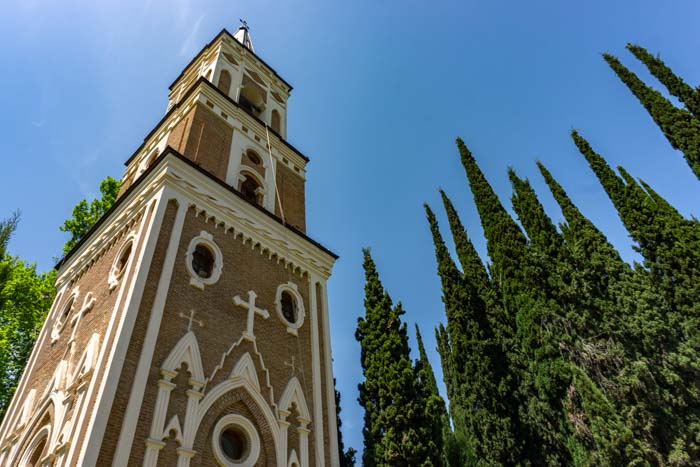
If you’re one of those people who chooses destinations mainly because of their food, then Georgia is an excellent choice for you. In recent years, Georgian food has been clawing its way into international recognition, with our Instagram feeds filled with images of photogenic khachapuri adjaruli and steaming khinkali soup dumplings . And while these things are certainly both iconic and delicious, there is a lot more to Georgian cuisine than these two dishes.
Filled with delicious salads, vegetable dishes, garlicky sauces drizzled over chicken, and some of the most creative uses of fruit for savoury endeavours — Georgian cuisine is diverse and delicious. As the best-known out of the cuisines of the Caucasus, if you are into food — then visiting Georgia is the clear answer.
Another perk of Georgian cuisine is that it is very accessible to vegetarians, with many popular dishes not containing meat at all. Look for things like ajapsandali , lobio , and eggplants with walnut paste . All very delicious and meat-free!
When it comes to the flavours and traditions of Georgian cuisine compared to Armenia and Azerbaijan, Georgian is the most diverse and flavourful in my opinion. I will say, however, it can be difficult to find a restaurant serving anything other than Georgian food, especially outside of Tbilisi. So if you crave some international fare once in a while, Georgia may not be the best option for you.

Armenia, located to the south of Georgia, sees fewer visitors than its neighbour to the north, but that doesn’t mean that it’s not worth visiting at all. Quite the contrary, Armenia boasts beautiful mountain scenery, a sophisticated capital city, and incredibly friendly locals who are keen to show you the best of their country.
Bordered by Georgia to the north, Turkey to the south, Azerbaijan to the east, and Iran to the southeast, Armenia has been influenced by many cultures throughout the centuries and has a fascinating and at times heartbreaking history.
So if you’re wondering whether you should visit Armenia vs Georgia or Azerbaijan, here are the merits to Armenia:
Compared to Georgia, unfortunately, Armenia is a bit less accessible – especially when comparing international routes.
There are a few airports in Armenia, but the only major international airport is in Yerevan, which does serve a handful of international destinations directly, many of which lie in Russia and a few other European countries. Therefore, if you fly into Armenia, it is likely you’ll need to make a connecting flight.
You can also reach Armenia via bus or train from Georgia . It is also possible to reach the country from the southern border in Iran. You cannot, however, enter Armenia from either Azerbaijan or Turkey as the land borders to both countries are closed.
Once in Armenia, your best bet to get around via public transport is by marshrutka — much like in Georgia. These bus routes operate in the same way as mentioned above and can be incredibly affordable and convenient if you are embarking on a well-trodden route.
It can be difficult to find the proper transport information in Armenia, however, as most international tourists tend to visit the country via organised tour. This can make getting around the country tricky for independent travellers.
Routes to popular tourist attractions don’t necessarily leave frequently if there isn’t much local demand, so there also can be little option. The best resource we found in Armenia when it came to finding bus routes and timetables was from the helpful people at the tourist information centres across the country.
If you want to get the most out of your Armenia itinerary while still travelling independently, then we would recommend renting a car. This will give you the flexibility to go where you want when you want without being beholden to bus timetables.
However, if you’re deciding between visiting Armenia or Georgia and you want to travel independently, then Georgia might be the better option for you.

As mentioned in the affordability section under Georgia above, all three countries in the Caucasus can be very affordable to travel in for Western travellers.
Therefore, if you’re trying to choose between these three nations and affordability is a determining factor, you might want to move onto other considerations. Armenia is affordable, but not really any more or less so than the other three countries.
Like in Georgia, it is possible to travel in Armenia for less than €35 per day if you are on a tight budget, while a mid-range budget might be somewhere closer to €50 per day.
Things to Do in Armenia
There is not much help in denying it, out of the three countries of Georgia, Armenia and Azerbaijan, Georgia definitely has the most things to do. That doesn’t mean, however, that Armenia is lacking in tourist sites or beautiful nature to explore.
The capital city of Yerevan is a cosmopolitan metropolis that is easy to spend a number of days in. Filled with streetside cafes and wide avenues, it is easy to navigate and interesting to explore. There are lots of museums, historical sites, and markets to visit and there is also a very good restaurant scene to check out as well.
Outside of Yerevan, the most popular sites to visit in Armenia are monasteries. Armenia is known to be the very first country to adopt Christianity as a state religion and there are countless historic Christian sites, cathedrals, and churches to visit in Armenia — some of which are truly spectacular.
Armenia is also a largely mountainous country and a real heaven for outdoor lovers. There are ample hiking opportunities throughout the country and beautiful views to be seen as well.
All in all, you could easily spend a week or two in Armenia and not get bored, however, it doesn’t have quite as much to offer as Georgia — especially when it comes to diversity in landscape and climate.

Armenian food isn’t all that well-known internationally and has none of the acclaim as Georgian cuisine, however, the food in Armenia is quite diverse and delicious and definitely worth sampling.
The local cuisine uses an interesting mix of influences from its surrounding neighbours and puts a unique twist upon them. In parts of Armenia, you will see very similar foods to what you would find in Georgia — dishes like khinkali , for instance, also have roots in Armenia.
You will also find some Levantine dishes in Armenian cuisine, like tabouleh and hummus, for instance.
Perhaps because of the amount of returning diaspora or just an internationally-minded population, there is ample choice for international food in Yerevan — far more than we found anywhere in Azerbaijan or Georgia.
In Yerevan, you can easily find delicious, spicy Thai food or chow down on buffalo wings in an American-style bar. There are definitely a lot of food options in Armenia that are well worth exploring.

Only very recently has Azerbaijan been a somewhat easy destination for many international tourists to reach, having only loosened visa regulations a few of years ago. As the oil capital of the Caucasus, Azerbaijan is an eclectic nation that is worth visiting if you get the chance.
Its capital city of Baku is a grand and sophisticated metropolis, combining classic European-style architecture with brand new futuristic buildings. Styling itself as something of a “new Dubai,” this is where the bulk of tourism in Azerbaijan is concentrated.
Outside of the capital, the country changes drastically, making it a fascinating nation to visit and adding even more confusion to those trying to figure out which country to visit.
When it comes to accessing Azerbaijan, it is easier than getting to Armenia from abroad as the Baku airport is a bit higher-traffic (they have ambitions to be a hub much like Dubai or Doha), though it still isn’t as affordable to fly here as it is to get to Georgia.
One thing to note is that, since 2020, it has not been possible for tourists to enter Azerbaijan overland from Georgia (you can go from Azerbaijan to Georgia, however). This means that the Tbilisi to Baku night train is also not operational.
And, if you missed it above, it is worth repeating that it is not possible to travel from Azerbaijan to Armenia or vice versa, despite the two countries sharing a significant land border.
Azerbaijan is the only country in the Caucasus where it is almost certain that you will need to obtain a visa before arriving, as well. However, for most western nationalities including USA, Canada, Australia, New Zealand, and the EU, an evisa system is available.
You do absolutely need to have this before travelling to Azerbaijan, as there are only a handful of nationalities where a visa on arrival is an option.
Actually getting around Azerbaijan is about as straightforward as in Armenia or Georgia, with buses and marshrutky being the main forms of public transport. They are very affordable and connect most destinations within Azerbaijan with relative ease.

While Baku is trying to brand itself as a luxury destination and it is certainly possible to spend a pretty penny in the city with a blink of an eye, it is just as easy to stick to a tight budget in Baku and Azerbaijan in general.
While there is certainly a lot of oil money in Azerbaijan, there is also a huge wealth divide in the country, meaning that most average Azeris don’t have a lot of money to get by. This makes travelling in Azerbaijan quite affordable for Westerners, even in glitzy Baku.
On average, like in Georgia or Armenia, you can plan to spend very little per day live pretty well in Azerbaijan.
Things to Do in Azerbaijan
When it comes to things to do in the country as a whole and you are trying to choose between the three nations of the South Caucasus, then Azerbaijan might fall a bit short.
While Baku is a massive city that is filled with a number of cool and interesting things to do, the rest of the country does not have a well-developed tourist infrastructure and is somewhat lacking for sites. While there are a few things that are worth visiting in a day from Baku — for instance, the mud volcanoes or the petroglyphs of Gobustan — there aren’t a ton of other things to see.
What Azerbaijan does have, however, is absolutely stunning natural scenery and if you’re a fan of dramatic mountain scenery and virtually untouched treks, then Azerbaijan is a great destination for you. There is also a fascinating amount of Silk Road history that is worth exploring, especially in the pleasant town of Sheki.
If, however, you’re not much of a hiker, then you may not find Azerbaijan to be all that interesting outside of Baku.

While Georgian and Armenian cuisines are fairly similar and even share some dishes, Azeri cuisine is in its own realm and, personally, it was my least favourite of the three.
Unlike in Georgia and Armenia, the food in Azerbaijan tends to be far more meat-heavy and fresh salads and vegetables do not play as important of a role in a balanced cuisine. The food also shares far more influences from places like Turkey and Iran than either Armenia or Georgia do.
While foods like kebabs are very popular in Azerbaijan (and it’s a food you can get in so many cities around the world), Azerbaijan also seemed to have the fewest international eating options compared to Georgia and Armenia.
Georgia or Armenia or Azerbaijan: The Verdict
With all the above points considered, it is now time to choose if Georgia, Armenia or Azerbaijan is the right country for you to visit.
In general, Georgia is the country that has the most to offer and the most developed tourist infrastructure. The government has invested heavily in its tourism industry and this makes it incredibly easy to visit as a foreigner. It also has the most diverse landscapes and attractions — including a coastline, beautiful mountains, great wine country, and thriving cities.
Armenia is a great destination if you want to get a bit further off the beaten path. Yerevan, however, is a very Western city and is incredibly easy to navigate and easy to love. The rest of the country is filled with jaw-dropping mountains, beautiful lakes, and historic monasteries.
Azerbaijan might be the best destination for you if you only have a week or less to devote to the country, or you are looking for an off-beat city break destination. Baku is a wonderful city that is full of surprises and charms, but the tourist sites and infrastructure is severely lacking outside of the capital.

Choosing between Azerbaijan, Armenia or Georgia can be a tricky decision, as each country has something unique to offer visitors.
Are you trying to decide which Caucasus country to visit? Have any questions? Let us know in the comments!

Related Posts:

Tbilisi to Kazbegi: How To Get There & Things To Do

Georgian Cuisine Guide: Must-Try Dishes & Food in Georgia

The Perfect Georgia-Armenia-Azerbaijan Itinerary

About Maggie Turansky
Maggie is a co-founder and writer for The World Was Here First. Originally from the US, she has lived in five different countries and has travelled to dozens more, both solo and with her partner, Michael. She particularly loves exploring Spain and spending time in the Caucasus and the Baltics. Read more about Maggie
Thanks. Very informative. Was planning on seeing all three countries next summer but I think I’ll visit Armenia an Georgia
Hello, I already visited Azerbaijan and Georgia together as a solo traveler in an organized trip, where I spent 4 nights in each country. I didn’t move a lot in Azerbaijan, just Baku and the winter resort in Gabala but I had a good tour in Georgia visiting Tbilisi, Gori, Gudauri, Mitskheta, Borjomi, Ananuri and Uplistsiche. Is it worth it taking the next family trip to Armenia or should I look for something different?
Yerevan is underrated. It has wider streets than in Tbilisi, lots of contemporary sculptures, dancing fountains, Pulpulaks (drinking fountains) everywhere, decent nightlife… Loads of festivals in the summer.
Tbilisi is picturesque, but it’s a bit overhyped and overrated by the West. Most of the beautiful architecture in Tbilisi was built by the Armenian nobility, which they hate to admit.
Baku is a massive city. The architecture is gorgeous and feels like an oil rich city. The Caspian Sea is so polluted in Baku that no one swims in it. It’s also an Islamic country which entails different vibes and more restrictions.
My order: Yerevan Tbilisi Baku
Thanks for sharing your opinions, James! Always good to have different perspectives 🙂
Hi, I have been to Georgia and I loved it. I would like to go to either Baku or Yerevan now. But this time it would be with my baby and husband. Which one do you recommend?
That’s a tough one! I really think both cities are great to visit – I do think there are more day trips from Yerevan you could do that showcase the entire country. Baku would be a great choice if you’re more interested in staying in the city or just going to some very nearby places 🙂
I lived in Azerbaijan and can confirm what is written here. The problem with AZ is that there is quite a bit to see, but very little to do. They still need to work on selling the experience. The government has tried to sell the country through F1, but this has it’s own selective viewer base.
Georgia wins the race, and Armenia second. I just don’t see how the other two are competing at this point. The Georgians have mastered what to sell from the different regions – and that’s huge when it comes to Tourism. You can’t sell the same experience, or else your country becomes boring. You can easily spend 10 days in Georgia without getting bored – there’s so much to do.
Thanks for your insight, Megan! Always good to have other perspectives from those who’ve also lived in the region 🙂
If you could only choose 1 city/town to do some awesome hiking trials which country and city/town would you recommend? I am on a small budget but would like to have several days of hiking without spending too much money on travelling around
Hi Nick, I would personally recommend heading to Georgia and basing yourself in Tbilisi. The city is close by a number of great hiking opportunities and everything is fairly well accessible. However, you really can’t go wrong with any of the options!
Hi dear planning a gals trips to Baku or Georgia with good night life and pub crawling in month of November so can you guide which is better
I think Tbilisi might be a better bet than Baku for nightlife, especially for a group of girls. Hope you have a great time!
Leave a Comment Cancel reply
- Skip to main content
- Keyboard shortcuts for audio player
The deadly clashes between Armenia and Azerbaijan, explained
Joe Hernandez
Charles Maynes

Soldiers carry coffins during funerals at a military cemetery in Yerevan, Armenia's capital, on March 2, 2021, for fighters killed during the war in Nagorno-Karabakh. Aris Messinis/AFP via Getty Images hide caption
Soldiers carry coffins during funerals at a military cemetery in Yerevan, Armenia's capital, on March 2, 2021, for fighters killed during the war in Nagorno-Karabakh.
Fighting has flared up again between Armenia and Azerbaijan, two former Soviet republics and traditional adversaries sandwiched between Russia, Georgia and the Middle East in a region known as the South Caucasus.
The two bordering countries are bitter rivals and have been clashing over territorial claims since the late 1980s, with periodic bouts of violence occasionally erupting into outright war.
Hostilities began anew between Armenia and Azerbaijan this month in the deadliest spate of violence since 2020, with at least 100 people killed, officials said. A cease-fire reached last Wednesday put a temporary stop to the bloodshed.
Here's what you need to know about the conflict and what's ahead:
Tracing the bad blood between Armenia and Azerbaijan
Territorial disputes between Armenia and Azerbaijan were well underway when the Soviet Union broke up in 1991.

Nagorno-Karabakh: U.S.-Brokered Cease-Fire Falters Soon After It Starts
Tensions have largely centered on an area called Nagorno-Karabakh, an ethnically Armenian enclave located inside Azerbaijan. Even though Armenia claims the territory, the area is internationally recognized as part of Azerbaijan.
A war in the mountainous region in the early 1990s, which killed an estimated 30,000 people and displaced 1 million, resulted in Armenia gaining control of Nagorno-Karabakh and several surrounding districts.
Fortunes flipped in 2020 when the two countries went to war again, this time with Azerbaijan — aided militarily by its ally Turkey — retaking large portions of Nagorno-Karabakh and nearby territories, according to the Crisis Group . A deal to end hostilities was later brokered by Russia , which sent a peacekeeping force to patrol the rest of Nagorno-Karabakh, though it is still governed by local pro-Armenian authorities.

A picture taken on Nov. 30, 2020, shows what is said to be destroyed Armenian military hardware in the countryside outside the towns of Hadrut and Khojavend. AFP via Getty Images hide caption
A picture taken on Nov. 30, 2020, shows what is said to be destroyed Armenian military hardware in the countryside outside the towns of Hadrut and Khojavend.
Both sides have blamed the other for the most recent round of fighting, which has occurred not only around Nagorno-Karabakh but also along the Armenia-Azerbaijan border and even within Armenia, a notable escalation in the conflict.
According to the United Nations , Armenia reported 105 service members killed and six civilians wounded before the Wednesday cease-fire, while Azerbaijan said 71 of its service members died and two civilians were hurt.
The cease-fire continued to hold as of Saturday as House Speaker Nancy Pelosi and several other U.S. lawmakers arrived in Armenia. Pelosi blamed Azerbaijan for "illegal attacks" on Armenia — prompting an angry rebuke from Azerbaijan, which called her remarks "Armenian propaganda" that could re-escalate the conflict.
Russia has held sway in the region, but its influence is waning
Though Russia is a military ally of Armenia under a regional security pact, it brokered the 2020 peace deal between both countries and has traditionally tried to play a peacekeeping role in this part of the Caucasus.
This time, however, Russia's role has been further tested by the conflict in Ukraine, where the Kremlin's military campaign has faced significant setbacks amid a counteroffensive by Ukrainian forces.
"The timing of this is interesting because Russia really cannot help Armenia at this very moment," Paul Stronski of the Carnegie Endowment for International Peace told NPR . "The timing, the fact that Russia is preoccupied, certainly led to what looks like an Azerbaijani offensive at this time."
Turkey and Armenia discuss opening borders to more trade and travel
The most recent fighting has also gone beyond the Nagorno-Karabakh enclave and is now occurring along the border between Armenia and Azerbaijan, which increases the risk of a "direct state-to-state conflict," Stronski said.
Complicating the situation further, Russia is a major arms exporter to Azerbaijan — as is NATO member Turkey.
In turn, Azerbaijan is a major exporter of oil and gas to Europe , where many countries are struggling with supply disruptions due to the war in Ukraine and are trying to reduce their reliance on Russian energy.
World leaders are pushing for peace in the region
Last week U.S. Secretary of State Antony Blinken spoke with Azerbaijani President Ilham Aliyev and urged him to "cease hostilities" after reports of shelling inside Armenia.
Blinken also spoke with Armenian Prime Minister Nikol Pashinyan. On Thursday, Blinken spoke with Pashinyan again and expressed his condolences for the fatalities his country sustained during the recent fighting.

Margarita Khanaghyan, 81, walks past Russian peacekeeping forces in the town of Lachin on Nov. 26, 2020. Karen Minasyan/AFP via Getty Images hide caption
Margarita Khanaghyan, 81, walks past Russian peacekeeping forces in the town of Lachin on Nov. 26, 2020.
"The Secretary reiterated our commitment to helping Armenia and Azerbaijan resolve issues peacefully," State Department spokesperson Ned Price said in a statement. "He said that diplomacy was the only way forward and noted he would remain personally engaged."
Miroslav Jenča, the U.N. assistant secretary-general for Europe, Central Asia and Americas, said the U.N. was "deeply concerned" about the renewed hostilities and warned that the fighting has the potential to destabilize the entire region.
Meanwhile, Russia suggested it will maintain its role as mediator — despite entreaties from Armenia to join the conflict on its behalf.
At a recent Eurasian forum that included the leaders of both Armenia and Azerbaijan, Russian President Vladimir Putin called "the latest incident" unfortunate.
"Most importantly, under Russian influence, the conflict was localized," Putin said.
"We hope it will continue that way."
- Nagorno-Karabakh
Armenia returns 4 border villages to Azerbaijan
A zerbaijan has taken control of four villages in the Gazakh district on the border with Armenia. The move follows an agreement with Yerevan.Armenia on Friday returned to Azerbaijan four border villages it seized decades ago, officials in Yerevan and Baku said. The move is seen as a new step toward normalizing relations between the historic rivals.
Armenian border guards "officially" took up new positions, Armenia's national security service said.
Meanwhile, Azerbaijani Deputy Prime Minister Shahin Mustafayev announced that Baku's border guards had taken control of the four settlements in the Gazakh district on the border with Armenia under an agreement with Yerevan.
On May 16, Baku and Yerevan agreed on the demarcation of 12.7 kilometers (almost seven miles) of their border that returned the villages of Baghanis Ayrum, Ashaghi Askipara, Kheyrimli and Ghizilhajili to Azerbaijan.
How are relations between Armenia and Azerbaijan?
Armenian Prime Minister Nikol Pashinyan agreed in March to the return of four abandoned villages seized by his country in the 1990s as part of efforts to secure a permanent peace agreement between the countries.
Pashinyan's decision sparked protests in the country. Demonstrators have blocked major roads in an attempt to force him to reverse course.
Armenia and Azerbaijan have fought two wars -- in 1988-1994 and in 2020 -- over control of the breakaway region of Nagorno-Karabakh, which has been ruled by Armenian separatists for three decades.
In September 2023, Azerbaijan retook Nagorno-Karabakh in a lightning military offensive, and most ethnic Armenians fled the region. Talks on a broader border agreement have since intensified.
dh/fb (AFP, Reuters)
Copyright 2024 DW.COM, Deutsche Welle. Distributed by Tribune Content Agency, LLC.

Nagorno-Karabakh: Conflict between Azerbaijan and Armenians explained
- Published 28 September 2023
- Nagorno-Karabakh conflict
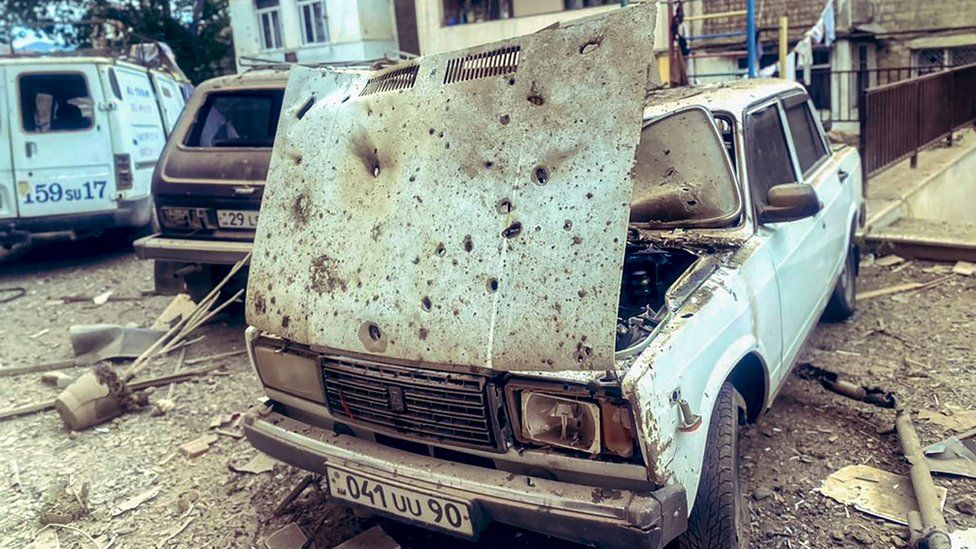
Nagorno-Karabakh surrendered to Azerbaijan after a day of heavy fighting
Tens of thousands of ethnic Armenians have fled from Nagorno-Karabakh since the territory surrendered to Azerbaijan on 20 September.
Local forces in Karabakh agreed to be disarmed and disbanded after an Azerbaijani military offensive triggered intense fighting.
The breakaway republic and its institutions will "cease to exist" from 1 January 2024, the region's separatist leader has said.
The territory is recognised internationally as part of Azerbaijan but large areas of it have been controlled by ethnic Armenians for three decades.
It is at the heart of one of the world's longest-running conflicts.
Where is Nagorno-Karabakh?
The territory lies in the mountainous South Caucasus region between the Black Sea and the Caspian Sea.
Azerbaijan and Armenia fought a bloody war over Nagorno-Karabakh in the late 1980s and early 1990s, and it has been the trigger for further violence in the years since.
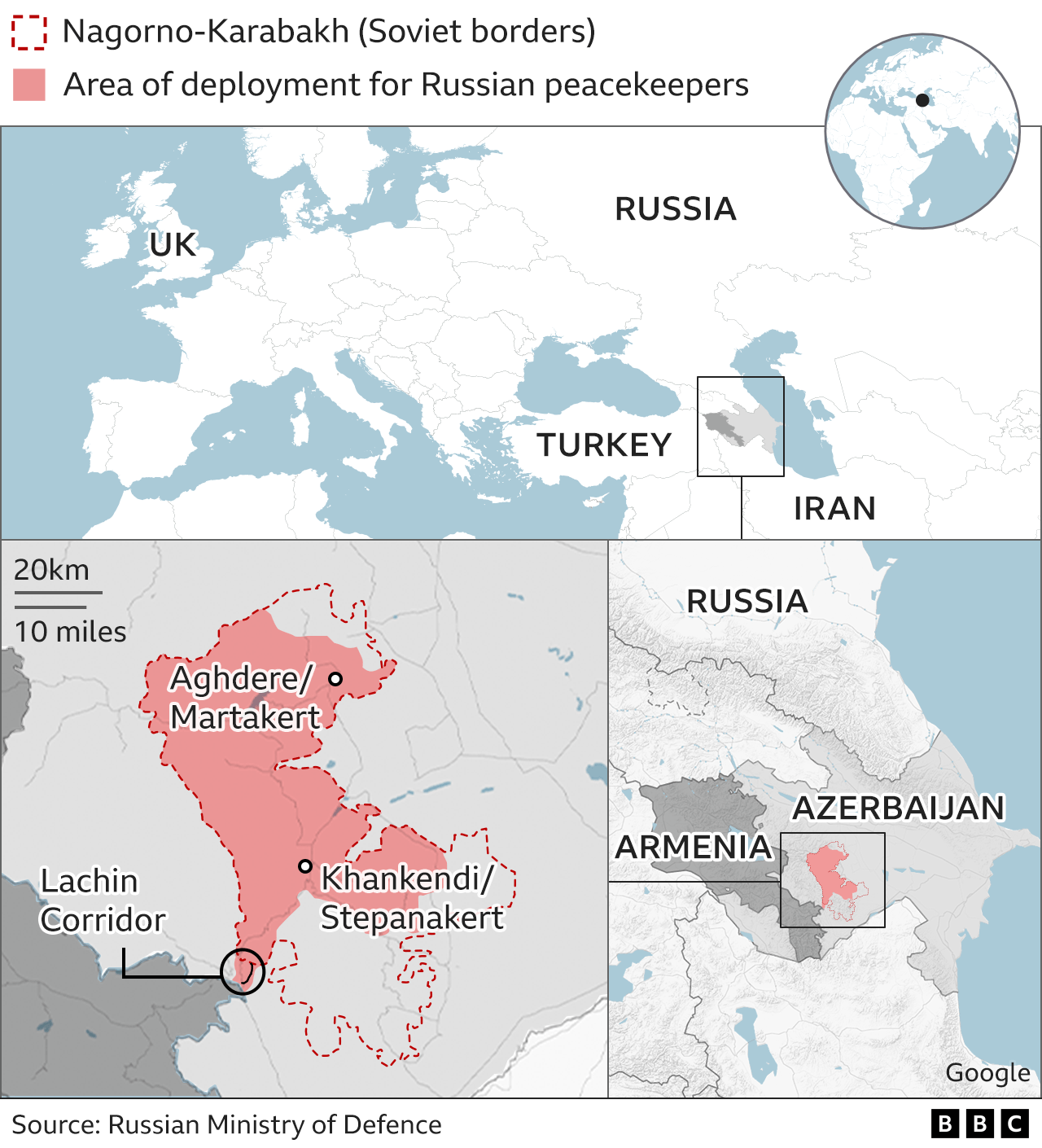
The last major escalation in the conflict took place in 2020 when thousands of people were reported killed in six weeks of fierce fighting.
The deployment of Russian peacekeepers brought the fighting to a halt at the time, but tensions had been ratcheting up for months ahead of the latest military operation.
What led to the latest fighting?
Fears of fresh violence rose when Azerbaijan mounted an effective blockade of a vital route into the enclave in December 2022.
The Lachin Corridor is the only road that connects the Republic of Armenia to Nagorno-Karabakh.
It is a key artery for supplies, and residents in the territory reported severe shortages of basic food items and medication during the blockade.
Azerbaijan accused Armenia of using the road to bring in military supplies, which Armenia denied. Baku also said it had offered food and aid several times via another road but Armenians in Nagorno-Karabakh refused it.
Maintaining access through the Lachin Corridor and another route, the Aghdam Road from Azerbaijan, relied heavily on the presence of Russian peacekeepers deployed in the area since 2020.
But Moscow's attention and military resources have been diverted by its invasion of Ukraine. The Armenian prime minister accused Russia of "spontaneously leaving the region".
Karabakh authorities said at least 200 people had died in the fighting, while Azerbaijan said that 192 of its soldiers had been killed.
Why are people fleeing ?
Azerbaijan and the ethnic-Armenians in Nagorno-Karabakh declared a ceasefire, mediated by Russia, on 20 September, which brought 24 hours of fighting to an end.
The agreement said local Armenian forces would be completely disarmed and disbanded.
Azerbaijan and the Karabakh authorities have since started talks about the integration of the enclave into Azerbaijan.
But the territory's separatist leader, Samvel Shahramanyan, also signed an order dissolving all state institutions from next year, effectively ending the territory's struggle for independence.
Mr Shahramanyan said the decision to dissolve the state was "based on the priority of ensuring the physical security and vital interests of the people", referencing Azerbaijan's agreement that "free, voluntary and unhindered travel is ensured to residents".
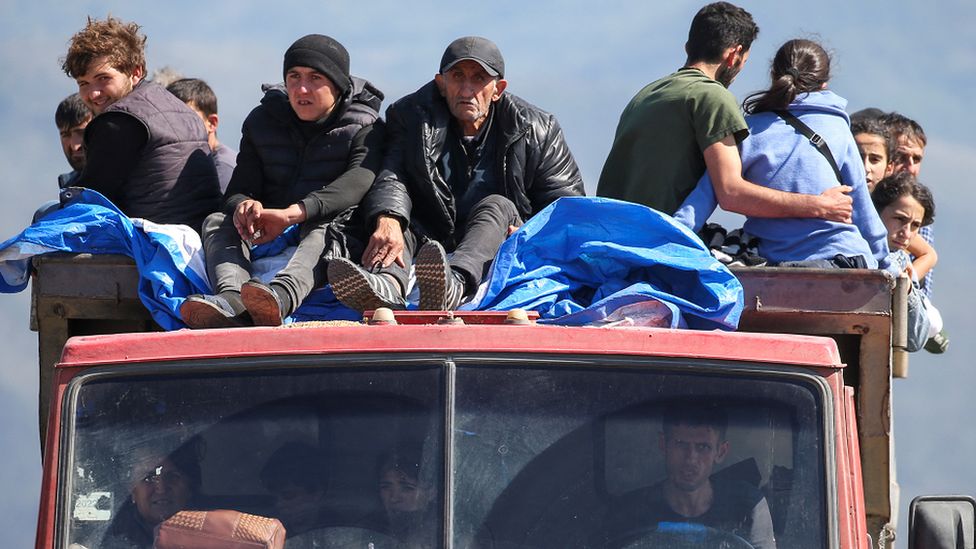
Tens of thousands of people have fled since Nagorno-Karabakh surrendered
Armenia said more than half of the estimated 120,000 ethnic Armenians fled the territory in the week after the ceasefire, fearing they would have no future in Nagorno-Karabakh.
The Lachin Corridor was packed with hundreds of buses and cars of people trying to leave.
Armenia's Prime Minister Nikol Pashinyan has said he expects there will be no Armenians left in Nagorno-Karabakh in the near future.
Azerbaijan has said it wants to integrate the region's population as "equal citizens" and dismissed allegations of ethnic cleansing levelled by Armenia.
The country's president, Ilham Aliyev, also said that Azerbaijanis who were displaced from the region in the decades-long conflict should have the option of returning.
The two countries have never signed a peace deal and despite negotiations over the years do not have formal diplomatic relations.
What led to war?
Modern-day Armenia and Azerbaijan became part of the Soviet Union in the 1920s.
The area designated Nagorno-Karabakh had a majority ethnic-Armenian population but was controlled by Azerbaijan.
Nagorno-Karabakh's regional parliament voted to become part of Armenia when the Soviet Union began to collapse in the late 1980s.
Azerbaijan sought to suppress the separatist movement, while Armenia backed it.
This led to ethnic clashes and - after Armenia and Azerbaijan declared independence from Moscow - a full-scale war.
Years of bloodshed and suffering followed.
BBC Azerbaijani Service editor Konul Khalilova remembers how hundreds of thousands of ethnic Azerbaijanis were forced out of Armenia , becoming refugees in Azerbaijan.
In February 1992, residents of the Azerbaijani town Khojaly, situated in the Nagorno-Karabakh area, were killed by Armenian forces, helped by some of the Russian military. More than 600 people died, according to Azerbaijan. Armenia disputes the account and the number of deaths.
Over the years, tens of thousands of people were killed and more than a million displaced amid reports of ethnic cleansing and massacres committed by both sides.
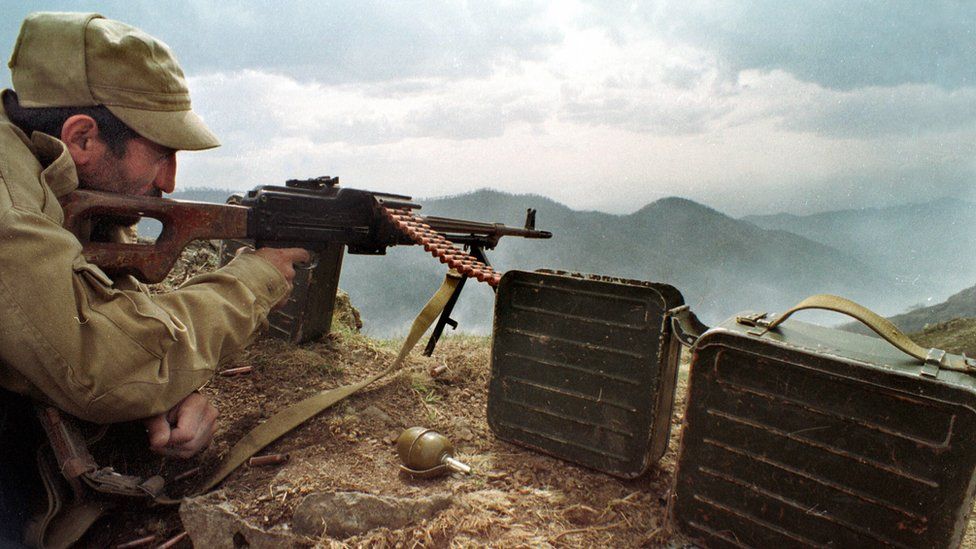
Armenian forces drove out Azerbaijani troops from Nagorno-Karabakh in the 1990s
Khalilova says it sometimes surprises her how little young people in both countries know about the atrocities.
No-one tells Armenians about the Azerbaijanis who were killed; likewise, young Azerbaijanis today do not hear about pogroms of the Armenian people in Azerbaijani cities such as Sumgayit and Baku at the end of the 1980s, she says.
Azerbaijan disputes the accounts of pogroms.
The first Nagorno-Karabakh war ended with a Russian-brokered ceasefire in 1994, after Armenian forces had gained control of Nagorno-Karabakh and areas adjacent to it.
Under the deal, Nagorno-Karabakh remained part of Azerbaijan, but since then it has mostly been governed by a separatist, self-declared republic, run by ethnic Armenians and backed by the Armenian government.
What happened in 2020?
The situation has been volatile ever since, with bouts of fighting interrupting periods of relative calm.
The biggest military confrontation since the early 1990s happened three years ago during six weeks of heavy fighting.
Azerbaijan won back territory and by the time both sides agreed to sign a Russian-brokered peace deal in November 2020, it had recaptured all the territories surrounding Nagorno-Karabakh held by Armenia since 1994.
Under the agreement, Armenian forces had to withdraw from these areas and have since been confined to a smaller part of the region.
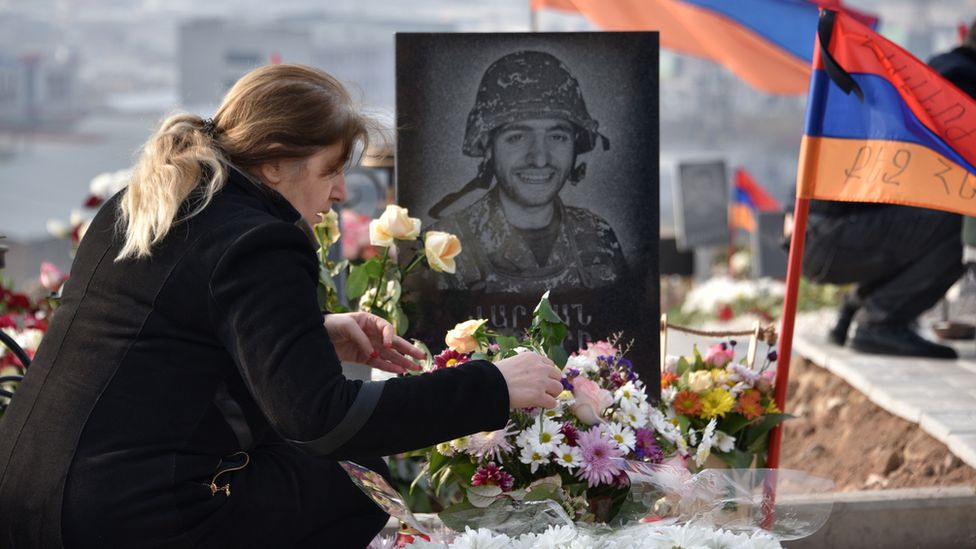
Thousands of people died in the 2020 war between Armenia and Azerbaijan
Who do Russia and Turkey support?
Regional powers have been heavily involved in the conflict over the years.
Turkey has close cultural and historical links to Azerbaijan. Turkish-made Bayraktar drones are said to have played a crucial role in the fighting in 2020, allowing Azerbaijan to make territorial gains.
Armenia, on the other hand, traditionally had good relations with Russia. There is a Russian military base in Armenia, and both are members of the Collective Security Treaty Organization (CSTO) military alliance of six former Soviet states.
But relations between Armenia and Russia have soured since Nikol Pashinyan, who led huge anti-government protests in 2018, became Armenia's prime minister.
He recently said Armenia's reliance on Russia as its single source for security was a "strategic error". Armenia held joint exercises with US forces earlier this month.
Following the fighting in Nagorno-Karabakh, Mr Pashinyan criticised the role Russian peacekeepers had played and publicly questioned whether remaining a CSTO member was in Armenia's interest.
Russia has rejected Mr Pashinyan's comments as "unacceptable outbursts addressed against Russia [that] can spark nothing but rejection".
"The leadership in Yerevan is making a big mistake by deliberately trying to destroy Armenia's multifaceted and centuries-old ties with Russia, and by holding the country hostage to the geopolitical games of the West," Russia's foreign ministry said.
The Kremlin has also criticised "extremely hostile" moves by Armenia to join the International Criminal Court (ICC), which has issued an arrest warrant for President Vladimir Putin.
Related Topics
- Nagorno-Karabakh
Armenians rush to help Karabakh ‘brothers and sisters’
- Published 27 September 2023
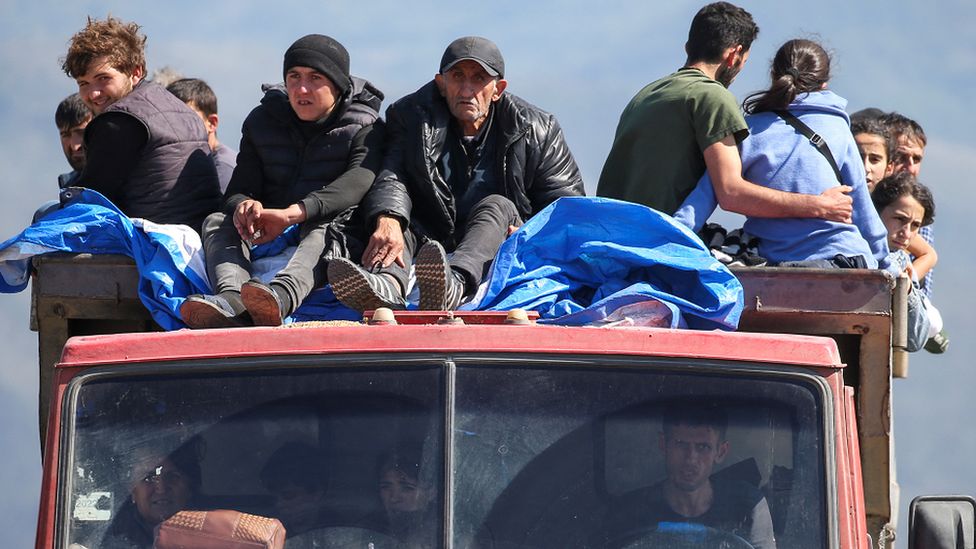
Nagorno-Karabakh will cease to exist, says leader
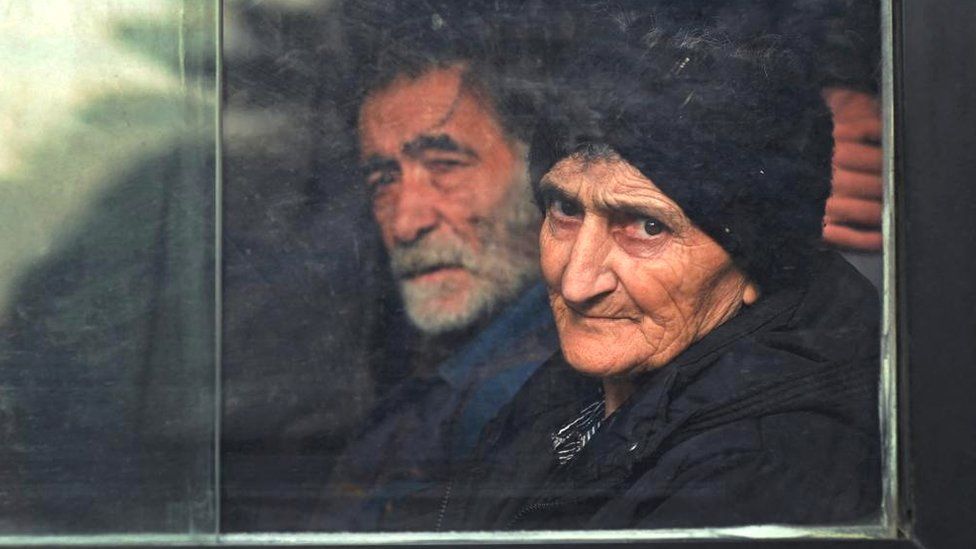
Nagorno-Karabakh profile
- Published 30 January
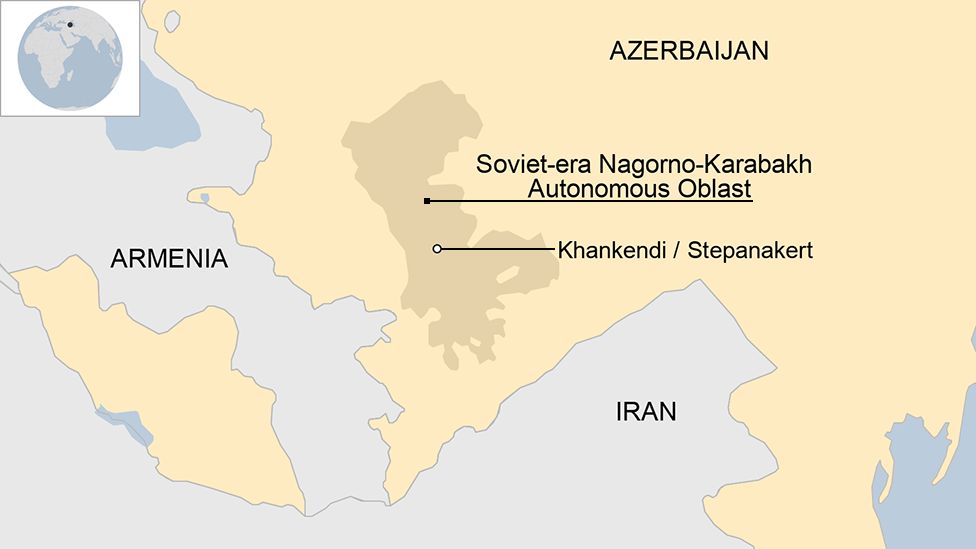
The Africa programme analyses the geopolitics of the Africa-Europe relationship. In particular, the programme delves into relations between the African Union and the European Union to find creative foreign policy tools and strategies. It also focuses on two regions that are particularly relevant for Europe: the Horn of Africa and the Sahel.
Highlights from Africa
- African Union
- EU-Africa cooperation
The Asia programme seeks to help Europe recalibrate its relationship with China and its Asian partners. The programme analyses China’s domestic situation, its role in the region, and its increasing global influence. It also places a renewed emphasis on fostering Europe’s relationships with the Indo-Pacific, especially India and Japan.
Highlights from Asia
- Indo-Pacific region
European Power
The European Power programme is focused on helping Europeans develop sustainable policy solutions to the issues affecting the European Union’s capacity to act with unity on the global scene. This includes analysing the path forward for enlargement, the energy transition, and European support for Ukraine.
Highlights from European Power
- Charting the Long War
- EU enlargement
- European cohesion
- European sovereignty
Middle East and North Africa
The Middle East and North Africa programme seeks to support a coherent European agenda in pursuit of regional interests. The programme works with European and regional governments, local voices, and civil society to advance channels of dialogue as well as providing direct policy prescriptions to secure conflict de-escalation, regional stabilisation, and democratic transition.
Highlights from Middle East and North Africa
- Israel-Palestine
- North Africa
United States
The US programme helps Europeans create policy responses to developments in US domestic politics and foreign policy. The programme seeks to strengthen transatlantic relations by exploring the obstacles to a more balanced partnership and developing ideas to overcome them.
Highlights from United States
- US foreign policy
- US domestic politics
- Transatlantic relations
- Wider Europe
The Wider Europe programme aims to help the European Union defend its interests and values in the Western Balkans, Turkey, Russia, and eastern Europe, as well as the South Caucasus and central Asia. The programme also supports EU decision-makers work on a unified and coherent policy to address the challenges resulting from Russia’s full scale-invasion of Ukraine.
Highlights from Wider Europe
- Western Balkans
- Policy Briefs
- Policy Alerts
- Commentaries
- Geoeconomics
- Defence, Security, and Tech
Setting boundaries: The fallout of Armenia’s border agreement with Azerbaijan
What started as a promising border agreement between Armenia and Azerbaijan may end up further weakening the government in Yerevan and undermining its reform agenda
- Policy Alert
- 31 May 2024
- 2 minute read

- Listen Pause Stop
On 19 April, Armenia and Azerbaijan agreed to delimit eight miles of their common border in the north-eastern Armenian region of Tavush. The move was widely welcomed by the international community as an encouraging sign that the bilateral dialogue could bring results, and Armenian prime minister Nikol Pashinyan defended the demarcation as an important “ milestone ” on the road to peace with Azerbaijan.
But, as part of the agreement, Armenia retroceded four abandoned villages that were part of Soviet Azerbaijan but had been under Armenian control since the early 1990s. The loss of territory to Azerbaijan triggered protests in neighbouring villages and sparked the “Tavush for the Motherland” movement, culminating in a demonstration of several thousand people in Yerevan on 9 May. The movement has since escalated and protesters are now demanding Pashinyan’s resignation, taking to the streets , and blocking several major roads. What started as a promising diplomatic step may end up significantly weakening Pashinyan’s government.
Indeed, one of the protest leaders and the head of the Tavush diocese of the Armenian church, Archbishop Bagrat Galstanian , announced on 26 May that he is willing to suspend his ecclesiastic career to become a candidate for prime minister. Together with the main opposition parties, Galstanian is unlikely to garner the necessary support of half of all members of parliament to impeach Pashinyan, who retains a comfortable majority. However, even if Pashinyan does hold onto his premiership, his position may be significantly weakened.
How Europeans should respond
Due to Armenia’s relative weakness against Azerbaijan, Pashinyan has had to accept compromises unpopular with the Armenian public. Until Yerevan’s negotiating position with Baku is strengthened, destabilising protests could escalate and perhaps violently so. This would undermine Pashinyan’s ability to implement his domestic reform agenda and to continue peace treaty negotiations with Azerbaijan, which will touch upon even more difficult issues .
To strengthen his position and allow him to pursue reforms and negotiations, the European Union should send clear signals of support for Pashinyan’s government. The recent €270 million plan for Armenian business and industry is a step in this direction, but Hungary has scuppered the EU’s efforts to use the European Peace Facility to provide non-lethal assistance to the Armenian military. European policymakers need to work towards overcoming their divisions on how to deal with Azerbaijan, an important trade and energy partner for several member states, and a key player of “ middle corridor ” initiatives. In doing so, the EU should not shy away from using the leverage it has over Azerbaijan, including with the preparation of the upcoming United Nations Climate Change Conference in Baku, to try to establish a more balanced negotiation equation that would not let Armenia face its much more powerful neighbour alone.
Pashinyan’s (un)popularity
After two lost wars in 2020 and 2023, the public’s trust in Pashinyan has dropped . His options are rather limited in dealing with Azerbaijan, and his opponents, while criticising his “unilateral concessions” do not propose any alternative strategy. But the lack of a clear strategy on his side, along with Azerbaijan’s continuing aggressive rhetoric, rising tensions with Russia, and the absence of clear signals of Western support may further undermine his popularity and, with it, Armenia’s fragile democracy.
The European Council on Foreign Relations does not take collective positions. ECFR publications only represent the views of their individual authors.
Subscribe to our weekly newsletter
We will store your email address and gather analytics on how you interact with our mailings. You can unsubscribe or opt-out at any time. Find out more in our privacy notice .
More on Wider Europe

Digital deceptions: How a European Democracy Shield can help tackle Russian disinformation
- Irene Sánchez, Giorgos Verdi
- 28 May 2024

Ukraine can still recover with bolder Western support – but right now it’s on the ropes
- Timothy Garton Ash
- View from the Council
- 24 May 2024
We use cookies on our website. Some of them are essential, while others help us to improve this website and your experience. If you are under 16 and wish to give consent to optional services, you must ask your legal guardians for permission. We use cookies and other technologies on our website. Some of them are essential, while others help us to improve this website and your experience. Personal data may be processed (e.g. IP addresses), for example for personalized ads and content or ad and content measurement. You can find more information about the use of your data in our privacy policy . You can revoke or adjust your selection at any time under Settings .
- External Media
Individual Privacy Preferences
Cookie Details Privacy Policy Imprint
If you are under 16 and wish to give consent to optional services, you must ask your legal guardians for permission. We use cookies and other technologies on our website. Some of them are essential, while others help us to improve this website and your experience. Personal data may be processed (e.g. IP addresses), for example for personalized ads and content or ad and content measurement. You can find more information about the use of your data in our privacy policy . Here you will find an overview of all cookies used. You can give your consent to whole categories or display further information and select certain cookies.
Accept all Save
Essential cookies enable basic functions and are necessary for the proper function of the website.
Show Cookie Information Hide Cookie Information
Content from video platforms and social media platforms is blocked by default. If External Media cookies are accepted, access to those contents no longer requires manual consent.
Privacy Policy Imprint
- Skip to content
- Skip to main menu
- Skip to more DW sites
Armenia returns 4 border villages to Azerbaijan
Azerbaijan has taken control of four villages in the Gazakh district on the border with Armenia. The move follows an agreement with Yerevan.
Armenia on Friday returned to Azerbaijan four border villages it seized decades ago, officials in Yerevan and Baku said. The move is seen as a new step toward normalizing relations between the historic rivals.
Armenian border guards "officially" took up new positions, Armenia's national security service said.
Meanwhile, Azerbaijani Deputy Prime Minister Shahin Mustafayev announced that Baku's border guards had taken control of the four settlements in the Gazakh district on the border with Armenia under an agreement with Yerevan.
On May 16, Baku and Yerevan agreed on the demarcation of 12.7 kilometers (almost seven miles) of their border that returned the villages of Baghanis Ayrum, Ashaghi Askipara, Kheyrimli and Ghizilhajili to Azerbaijan.
How are relations between Armenia and Azerbaijan?
Armenian Prime Minister Nikol Pashinyan agreed in March to the return of four abandoned villages seized by his country in the 1990s as part of efforts to secure a permanent peace agreement between the countries.
Pashinyan's decision sparked protests in the country . Demonstrators have blocked major roads in an attempt to force him to reverse course.
Armenia and Azerbaijan have fought two wars — in 1988-1994 and in 2020 — over control of the breakaway region of Nagorno-Karabakh , which has been ruled by Armenian separatists for three decades.
In September 2023, Azerbaijan retook Nagorno-Karabakh in a lightning military offensive, and most ethnic Armenians fled the region . Talks on a broader border agreement have since intensified.
Armenians fear plan to return land to Azerbaijan
To view this video please enable JavaScript, and consider upgrading to a web browser that supports HTML5 video
dh/fb (AFP, Reuters)
Related topics
- My View My View
- Following Following
- Saved Saved
Azerbaijan takes control of four villages on border with Armenia as part of deal
- Medium Text
Sign up here.
Reporting by Reuters; Editing by Andrew Osborn, Ron Popeski and Muralikumar Anantharaman
Our Standards: The Thomson Reuters Trust Principles. New Tab , opens new tab
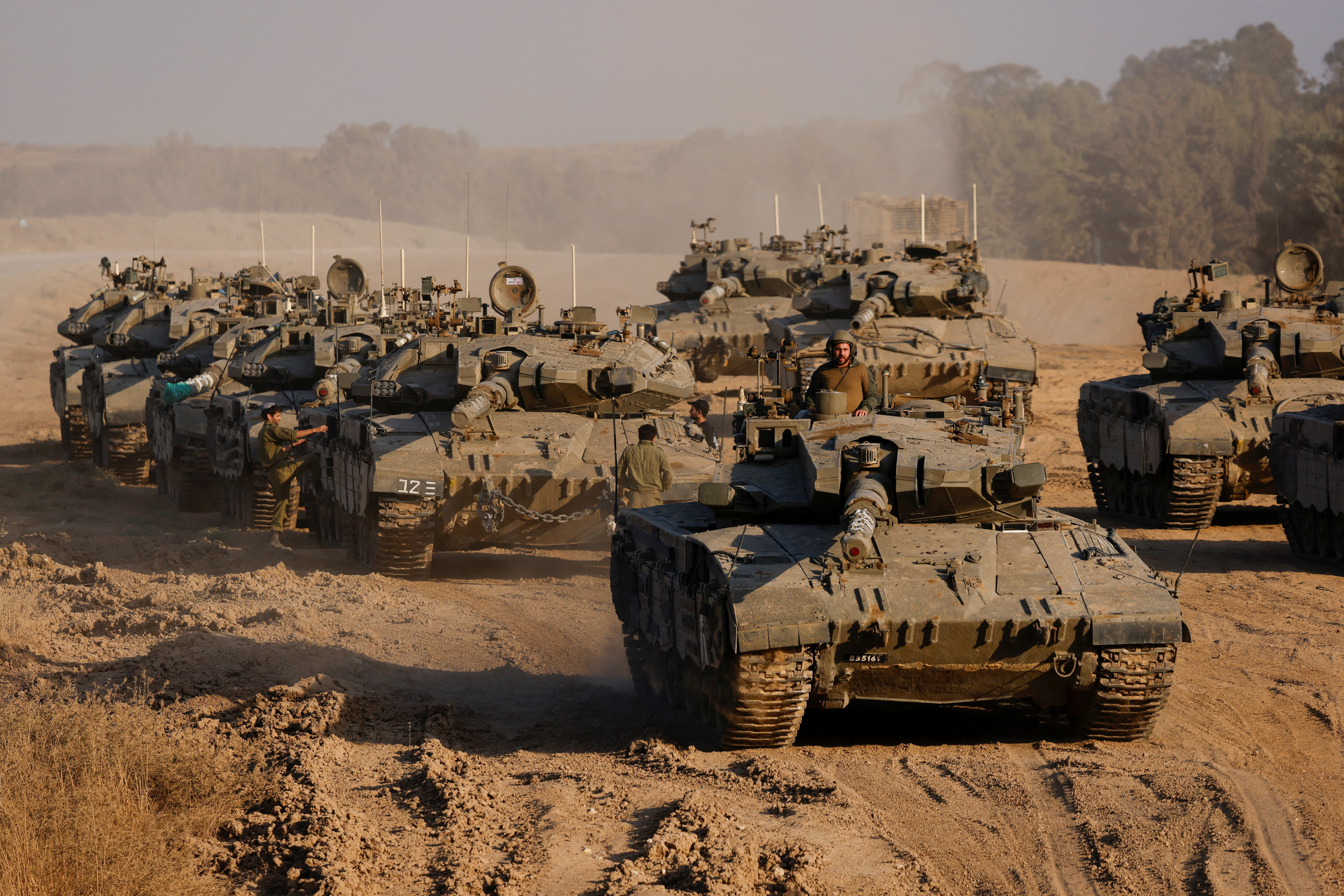
World Chevron

ANC to speak as South Africa waits to find out who will govern
The African National Congress will give an early indication on Wednesday of its response to last week's election, which ended its 30-year run as the majority party and plunged South Africa into political uncertainty unseen in the democratic era.
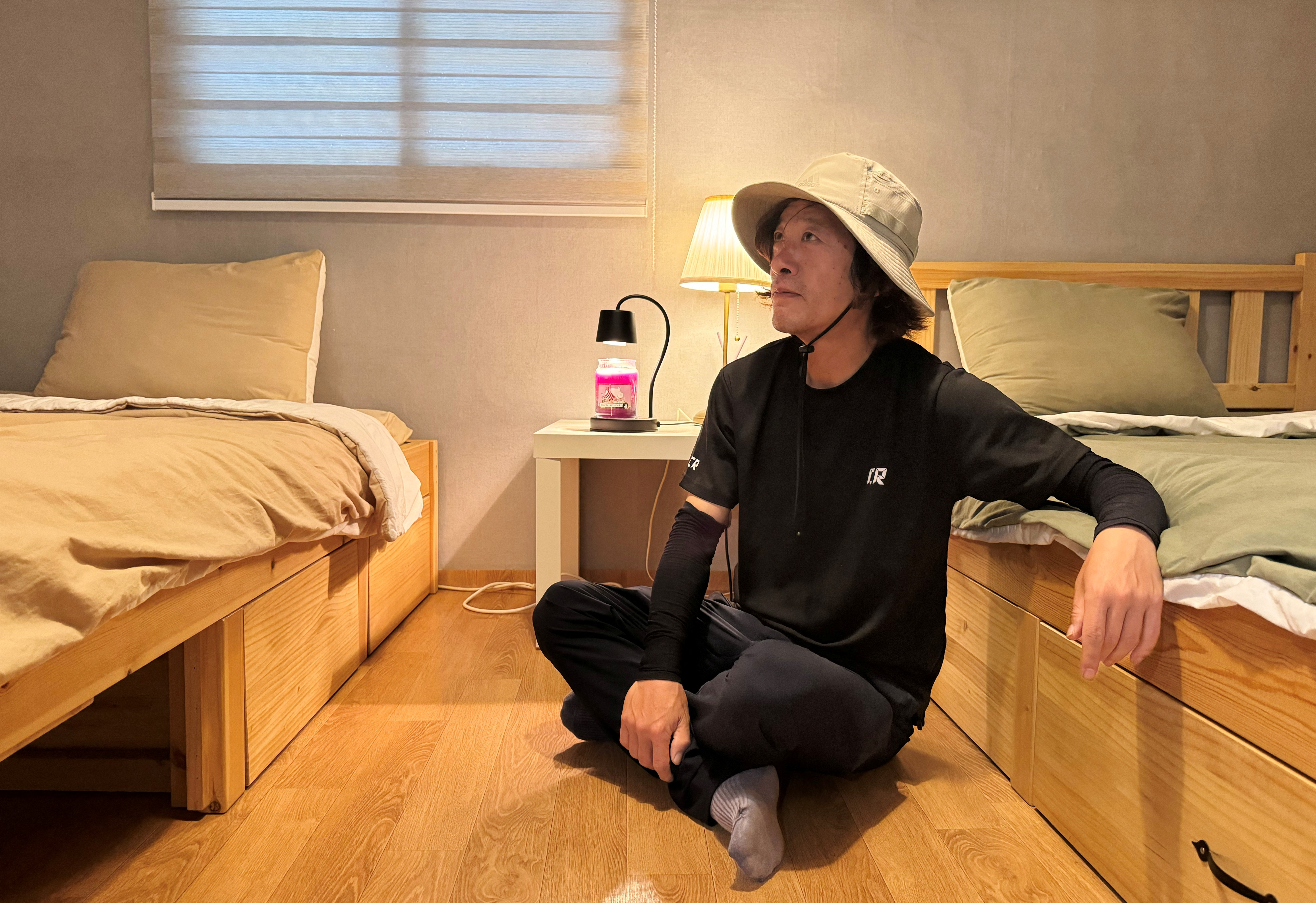

- Armenia & Karabakh
- Arts & Culture
- International
- Past Issues

Top Stories
Most read stories of the month
Latest articles of the week

- Azerbaijan Takes Control of Border Areas Ceded by Armenia
YEREVAN/BAKU (Azatutyun.am) — Azerbaijan on Friday, May 24, took control of most of the border areas which the Armenian government agreed to hand over to Baku under last month’s controversial border deal that sparked antigovernment protests in Armenia.
Azerbaijani Deputy Prime Minister Shahin Mustafayev, who negotiated the deal on April 19 with his Armenian counterpart Mher Grigoryan, announced that Azerbaijani border guards took up positions there in the morning. Mustafayev said Azerbaijan won back a total of 6.5 square kilometers of territory that used to be occupied by four Azerbaijani villages captured by Armenian forces in 1991-1992.
For its part, the Azerbaijani army had at occupied at the time large swathes of nearby land belonging to several villages in Armenia’s Tavush province. It will not withdraw from that land in return for the Armenian territorial concessions.
Armenia’s National Security Service (NSS) confirmed the completion of the first land transfer which Azerbaijani President Ilham Aliyev has described as “yet another victory” for his country. In a statement, the NSS indicated that another, more sensitive border area will be handed over to Baku by July 24.
The area is located in and around Kirants, one of the four Tavush villages affected by the Armenian withdrawal. Kirants will lose not only much of its agricultural land but also several houses and a bridge connecting it to the rest of Armenia.
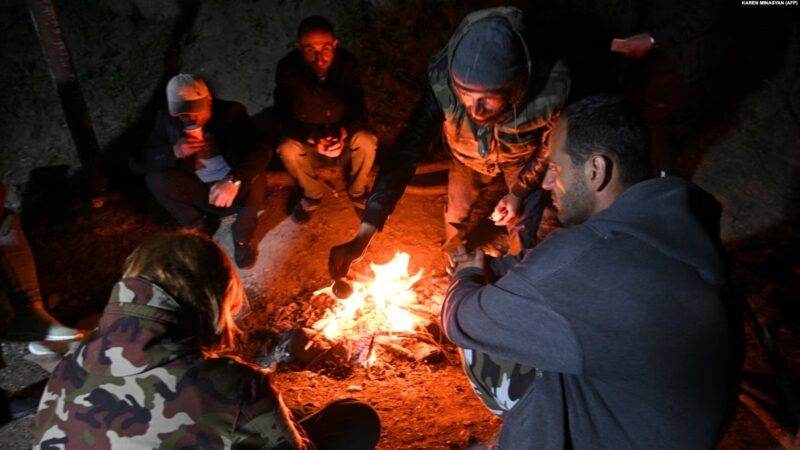
Security forces cleared a protest camp in Kirants on May 2 to allow the Armenian authorities to continue preparations for the handover. They again blocked on May 19 all roads leading to the village. It has remained cordoned off since then.
The protest leader, Archbishop Bagrat Galstanyan, and his supporters took their campaign against the “illegal” handover to Yerevan on May 9, holding rallies there to demand Prime Minister Nikol Pashinyan’s resignation. Galstanyan, whose movement has been joined or endorsed by a wide range of Armenian opposition groups, is due to again rally supporters in the capital on Sunday.
Pashinyan has claimed that the unilateral concessions are necessary for preventing Azerbaijani military aggression against Armenia. He reiterated that in a televised address to the nation aired on Friday evening.
‘If our strategic vision is not real Armenia, the already difficult peace will not be possible because our environment will consider us a strategic threat,” he said.
Pashinyan’s critics say that he is on the contrary encouraging Baku to demand more territory from Armenia and use force for that purpose.
The Armenian Mirror-Spectator

Armenian Solar Power Project in Limbo
Related articles | more from author.

New Book Brings Multidisciplinary Focus to Azerbaijan’s Distortion of History, Destruction of Monuments

US Elections and Armenian Votes
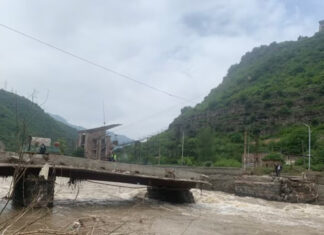
Armenia to Seek Foreign Aid for Post-Flood Reconstruction
Top 5 articles.
- Most Viewed
- Most Commented
- Police Confront Armenian Church Head at War Memorial
- Inside the Secret Network Behind a Democratic Congressman’s Bribery Scandal
- Ruling Party Disavows Death Threats to Armenian Opposition
- Over 2,000 Attend Washington Armenian Food Festival: Video Report
- US and European Aid Package to Armenia Is Not Only Cheap, It’s Dangerous
- Valerian Markarov: Writing Russian and Being Armenian in Georgia
- Recipe Corner: Zatiki Chorek: Armenian Easter Bread
- Fresh Lavash and Armenian Delights at Gyumri in Watertown
- Lenten Recipe: Vartabed Chorba (Priest’s Soup)
- Why I Am Grateful to Erdogan, the Dictator of Turkey
- A Political Whirlwind Engulfs Nagorno Karabakh
- Libya’s Interim Government Recognizes the Armenian Genocide Once Again
- Robert Bedrosian Marries High Tech With Ancient Armenian Manuscripts
- Aleppo Aid through St. Kevork Armenian Apostolic Church of Houston
- Privacy Policy
- Today's news
- Reviews and deals
- Climate change
- 2024 election
- Fall allergies
- Health news
- Mental health
- Sexual health
- Family health
- So mini ways
- Unapologetically
- Buying guides
Entertainment
- How to Watch
- My watchlist
- Stock market
- Biden economy
- Personal finance
- Stocks: most active
- Stocks: gainers
- Stocks: losers
- Trending tickers
- World indices
- US Treasury bonds
- Top mutual funds
- Highest open interest
- Highest implied volatility
- Currency converter
- Basic materials
- Communication services
- Consumer cyclical
- Consumer defensive
- Financial services
- Industrials
- Real estate
- Mutual funds
- Credit cards
- Balance transfer cards
- Cash back cards
- Rewards cards
- Travel cards
- Online checking
- High-yield savings
- Money market
- Home equity loan
- Personal loans
- Student loans
- Options pit
- Fantasy football
- Pro Pick 'Em
- College Pick 'Em
- Fantasy baseball
- Fantasy hockey
- Fantasy basketball
- Download the app
- Daily fantasy
- Scores and schedules
- GameChannel
- World Baseball Classic
- Premier League
- CONCACAF League
- Champions League
- Motorsports
- Horse racing
- Newsletters
New on Yahoo
- Privacy Dashboard
Armenians demand prime minister's resignation following village handover to Azerbaijan
Tens of thousands of demonstrators held a protest on Sunday in Armenia , calling for the resignation of Prime Minister Nikol Pashinyan after Yerevan agreed to hand over control of several border villages to Azerbaijan.
The demonstration was the latest in a series of weekslong gatherings led by Bagrat Galstanyan, a high-ranking cleric and archbishop of the Tavush diocese in Armenia's northeast, from the Armenian Apostolic Church.
He spearheaded the formation of a movement called 'Tavush For The Homeland' after Armenia agreed to cede control of four villages in the region to Azerbaijan in April. Although the villages were the movement's core issue, it has expanded to express a wide array of complaints about Pashinyan and his government.
The decision to hand over the villages in Tavush came after a rapid military campaign in September, during which Azerbaijan's military pressured ethnic Armenian separatist authorities in the Karabakh region into surrendering.
After Azerbaijan took full control of Karabakh, about 120,000 people fled the region, almost all of its ethnic Armenian population.
Ethnic Armenian fighters backed by Armenian forces had taken control of Karabakh in 1994 at the end of a six-year war. Azerbaijan reclaimed some territory through fighting in 2020 that ended with an armistice, bringing in a Russian peacekeeping force, which began withdrawing this year.
Pashinyan has said Armenia needs to quickly define the border with Azerbaijan to avoid a new round of hostilities .
Recommended Stories
Us markets get an election preview from india and mexico: morning brief.
Mexican and Indian markets had some major volatility this week after the former's landslide was bigger than expected and the latter's smaller. But the same election pattern was once again observed — the "problem" is often the uncertainty.
Lululemon to report Q1 earnings with sales growth in focus amid stock slide
Lululemon is expected to report first quarter results after the bell on Wednesday as investors search for more clarity on future sales growth amid a 40% fall in the stock this year.
SAP to acquire digital adoption platform WalkMe for $1.5B
Enterprise software giant SAP is acquiring "digital adoption" platform provider WalkMe in an all-cash transaction worth $1.5 billion. WalkMe's Nasdaq closing price yesterday was $9.64, with SAP's $14 offer representing a premium of 45%. Founded in 2011, companies use WalkMe's software to integrate on-screen product walkthroughs into their software, for instance to guide users through new features or to on-board new employees.
The Stakes: How Trump and Biden would handle the war in Gaza if reelected — and what they’ve already done about the Israeli-Palestinian conflict
A new Yahoo News series comparing the candidates' records and plans on key issues.
AT&T, Verizon services restored after call disruption issues across multiple states
AT&T and Verizon customers found themselves unable to call contacts on other carriers for several hours on June 4.
Angel Reese's 'weak' ejection from Sky-Liberty game draws attention, offer from Bulls' Lonzo Ball
Reese was ejected after two very quick whistles from referee Charles Watson.
Modi-led coalition's election win signals policy continuity in India – but also spending cuts
The National Democratic Alliance (NDA) has emerged victorious in India's 2024 general election, but with a smaller majority compared to 2019. According to post-election analysis by Goldman Sachs, JP Morgan, CLSA, UBS, Bernstein and Citi, this slimmer mandate may push the government – known for transforming India into a global manufacturing powerhouse and making investments in sectors to reduce the country's reliance on Western nations – to embrace a more populist stance in its third term, prioritizing the demands of lower-income segments and rural development.
Lily Yohannes, 16, becomes 3rd-youngest goal scorer in USWNT history in win over South Korea
Only Kristine Lilly and Tiffany Roberts were younger when they scored for the USWNT.
Amazon just slashed the price of its Fire Omni Series TVs — save up to 30%
Isn't it time you went 'big' on your home theater setup? We spotted a 75-inch stunner for $790 (from $1,050) and more goodies.
Amazon Prime Day 2024: Everything to know about the July sale and early deals you can shop now
Prime Day is confirmed to be kicking off sometime in July. Here's all the info we have, along with super deals you can shop early.
New Biden order seeks to crack down on migration at the southern border. What does it mean, and how will it affect asylum seekers?
President Biden signed an executive order to limit illegal crossings at the southern border. Here's what that means.
Kanye West's ex-assistant sues him for sexual harassment. A breakdown of the many lawsuits he's facing.
West's former assistant has filed an explosive lawsuit against him. The rapper is defending many other lawsuits at the moment, including several around his shuttered Donda Academy and beyond.
Report: JJ Redick front-runner over James Borrego for Lakers head coaching job
A decision has not been made as the Lakers have multiple steps remaining in their head-coaching search, per the report.
Our tech editor's favorite budget open-ear earbuds are just $46 — over 40% off
'Minimal to no sound leakage,' reviewers say. Listen to your favorite tunes, no matter how bombastic, without the rest of the world hearing.
French Open: Novak Djokovic withdraws, Coco Gauff and Iga Swiatek set for rematch in semifinals
Djokovic will not win the 2024 French Open.
Cowboys WR CeeDee Lamb, 49ers' Brandon Aiyuk skip start of mandatory minicamps, officially signaling holdouts
Lamb and Aiyuk are seeking to join the party in the wake of multiple lucrative contracts that have reset the NFL's wide receiver market.
Dolphins QB Tua Tagovailoa 'not concerned' but still 'antsy' while awaiting new deal with Miami
The quarterback, entering his fifth year in Miami, told reporters at Dolphins minicamp on Tuesday that he was "not frustrated" by lengthy contract negotiations, but admitted that he was a bit impatient.
Gas prices see biggest weekly drop of 2024, but a spike may come later this summer
Gasoline prices fell $0.06 per gallon over the last week, representing the biggest weekly drop of 2024.
Biden gets Trumpy on immigration
Biden is taking new action to limit migrant crossings while insisting his policies are more humane than Trump's.
These Sony ANC headphones are even better for $98
The Sony WH-CH720N ANC headphones are on sale for $98. That’s around 35 percent off.
Thousands rally in Armenia in protest at Azerbaijan land transfer
Thousands of Armenians staged an anti-government protest on Sunday, demanding Prime Minister Nikol Pashinyan's resignation over territorial concessions to arch foe neighbour Azerbaijan.
Issued on: 27/05/2024 - 05:05
Protests erupted in the Caucasus nation last month after the government agreed to hand over to Baku territory it had controlled since the 1990s.
The ceded area is strategically important for landlocked Armenia because it controls sections of a vital highway to Georgia.
Armenian residents of nearby settlements say the move cuts them off from the rest of the country and accuse Pashinyan of giving away territory without getting anything in return.
On Friday, in a key step toward normalising ties between the rivals -- who fought two wars over then-disputed Nagorno Karabakh region -- Yerevan returned to Azerbaijan four border villages it seized decades ago.
An AFP reporter said several thousand people flooded Yerevan's central Republic Square in a fresh protest spearheaded by charismatic archbishop Bagrat Galstanyan, a church leader from the Tavush region, where villages were handed over to Azerbaijan.
"Our people want to change the bitter reality which was imposed on us," Galstanyan told the crowd, adding that fixing the volatile border with Azerbaijan "must only be carried out after a peace treaty is signed" with Baku.
One of the demonstrators, 67-year-old Artur Sargsyan, said: "We demand an immediate resignation of Nikol (Pashinyan)."
"I had fought in two wars with Azerbaijan and will not let him give away our lands."
'For the sake of change'
Pashinyan defended the territorial concessions as aimed at securing peace with Baku. But they sparked weeks of protests and demonstrators blocked major roads in an attempt to force him to change course.
In a televised statement on Friday evening, he said resolving border disputes with Azerbaijan "is a sole guarantee for the very existence of the Armenian republic within its internationally recognised and legitimate frontier."
Galstanyan is seeking to launch an impeachment process against Pashinyan, a former journalist who was propelled to power in the wake of peaceful street protests he led in 2018.
The archbishop said on Sunday that he would renounce his clerical office to run for prime ministerial post, and called for snap parliamentary elections.
"My spiritual service is above all possible posts, but I am ready to sacrifice it for the sake of change in this country," he told the cheering crowd.
He then called on protesters to march toward Pashinyan's residence.
Opposition parties would require the support of at least one independent or ruling party MP to launch the impeachment process and success would then hinge on at least 18 lawmakers from Pashinyan's own party voting to unseat the leader.
Last year, Azerbaijan recaptured Karabakh in a lightning offensive against Armenian separatists who had held sway over the mountainous enclave for three decades.
The region's entire Armenian population -- more than 100,000 people -- fled to Armenia in the aftermath.
Daily newsletter Receive essential international news every morning
Take international news everywhere with you! Download the France 24 app
- Nagorno-Karabakh
- Nikol Pashinyan
The content you requested does not exist or is not available anymore.

IMAGES
VIDEO
COMMENTS
The most severe conflict is probably the one between Armenia and Azerbaijan. It centres on the Nagorno-Karabakh (Artsakh) region, a breakaway territory sandwiched between the two republics, which has been a site of skirmish since the 1980s. The war in Nagorno-Karabakh officially ended in 1994, but landmines and gun snipers are still a part of ...
The borders between Armenia and Azerbaijan are completely closed and it is impossible to travel between the two. So if you have a brilliant plan to travel from Baku to Yerevan to Tbilisi, it's time to toss that out the window. Because of the way border crossings can go, the best way to plan a route through the Caucasus region (if you want to ...
Border with Armenia - Avoid all travel. Avoid all travel to within 5 km of the border with Armenia due to the volatile security environment and the risk of armed conflict.. This advisory excludes the area within 1 km of the border between Armenia and the Azerbaijani Autonomous Republic of Nakhchivan where you should avoid non-essential travel due to the risk of armed clashes.
It also covers train travel between Georgia, Armenia and Azerbaijan, and travel by train from Istanbul and Ankara in Turkey to these countries. For overland travel from London or western Europe to the Caucasus, you have three basic options: Option 1, via Turkey: Travel from western Europe to Istanbul, then across Turkey into Georgia, then ...
Yes, you can visit both Azerbaijan and Armenia on the same trip with a few caveats. First, between the two states there are no open border crossings, so you must go through Georgia or Iran. Second, you must not have visited Nagorno-Karabakh while in Armenia ( N.B. It is now de jure part of Azerbaijan ). The third caveat is implied - you will ...
Border with Azerbaijan - Level 4: Do Not Travel. There is the potential for armed conflict near the Armenia-Azerbaijan border. U.S. citizens should avoid the area. Exercise caution on roads near Armenia's border with Azerbaijan. Be aware that some portions of the road may cross international boundaries without notice.
In 2022, there were military clashes between Armenia and Azerbaijan along their shared border. Although a ceasefire has been agreed, the situation remains tense and highly changeable, with frequent skirmishes. ... Check with a doctor a minimum of eight weeks in advance of travelling to see if any vaccinations are required for Armenia. Travel ...
The Perfect Itinerary for Azerbaijan Georgia and Armenia: Day 1 - 17. Day 1: Baku, Azerbaijan. Day 2: A day trip to Qobustan. Day 3: Baku, Azerbaijan and depart for Georgia. Day 4: Tbilisi, Georgia. Day 5: Day trip from Tbilisi to the Wine Region Kakheti. Day 6: Day trip from Tbilisi to Kazbegi. Day 7: A full free day in Tbilisi or visit ...
Georgia, Armenia & Azerbaijan and beyond. Beyond Georgia, Armenia & Azerbaijan. Explore Georgia, Armenia & Azerbaijan holidays and discover the best time and places to visit.
Day 1 Arrive in Baku-AZERBAIJAN. Day 2 Gobustan Mud Volacano, Gobustan National Park, Yanardag and Atesgah-AZERBAIJAN. Day 3 Qabala-AZERBAIJAN. Day 4 Qabala and Laza-AZERBAIJAN. Day 5 Kakheti,GEORGIA. Day 6 Tbilisi, GEORGIA. Day 7 Gudauri, GEORGIA. Day 8 Tbilisi, GEORGIA. Day 9 Tbilisi/Yerevan, GEORGIA/ARMENIA.
The former Soviet states of Armenia, Georgia and Azerbaijan can all be explored on the same holiday, as part of a fascinating tour than can send even the most experienced Eastern European traveller into ecclesiastical oscillations. Armenia is typically the first stop on these multi-country itineraries. Here, you will encounter ancient lands ...
Safety. Do not travel within 5km of Armenia's border with Azerbaijan due to the risk of regular armed clashes, volatile security environment and unmarked landmines. Monitor the media for developments and follow the advice of local authorities. Protests occur in Yerevan, Gyumri and other major cities. These can turn violent.
Want to know more about travelling around Azerbaijan. Rome2Rio's Travel Guide series provide vital information for the global traveller. Read our range of informative guides on popular transport routes and companies - including Travelling to and around Russia for the 2018 FIFA World Cup, Travelling Croatia's Dalmatian Coast by boat, bus, car and train, and The beginner's guide to the 2018 ...
A second war erupted over 44 days in 2020, during which thousands were killed and tens of thousands displaced. This time, Azerbaijan, using Turkish and Israeli attack drones, recaptured much of ...
An elderly man walks past destroyed buildings in the breakaway Nagorno-Karabakh region's main city of Stepanakert on October 6, 2020, during the ongoing fighting between Armenia and Azerbaijan ...
Like in Georgia, it is possible to travel in Armenia for less than €35 per day if you are on a tight budget, while a mid-range budget might be somewhere closer to €50 per day. Things to Do in Armenia. There is not much help in denying it, out of the three countries of Georgia, Armenia and Azerbaijan, Georgia definitely has the most things ...
The deadly clashes between Armenia and Azerbaijan, explained. Soldiers carry coffins during funerals at a military cemetery in Yerevan, Armenia's capital, on March 2, 2021, for fighters killed ...
Armenia and Azerbaijan have fought two wars -- in 1988-1994 and in 2020 -- over control of the breakaway region of Nagorno-Karabakh, which has been ruled by Armenian separatists for three decades.
The territory lies in the mountainous South Caucasus region between the Black Sea and the Caspian Sea. Azerbaijan and Armenia fought a bloody war over Nagorno-Karabakh in the late 1980s and early ...
What started as a promising border agreement between Armenia and Azerbaijan may end up further weakening the government in Yerevan and undermining its reform agenda. On 19 April, Armenia and Azerbaijan agreed to delimit eight miles of their common border in the north-eastern Armenian region of Tavush. The move was widely welcomed by the ...
Advertisement. Armenia on Friday returned to Azerbaijan four border villages it seized decades ago, officials in Yerevan and Baku said. The move is seen as a new step toward normalizing relations ...
Azerbaijan's border service has taken control of four villages in the Gazakh district on the border with Armenia under an agreement struck with Yerevan, Azerbaijani Deputy Prime Minister Shahin ...
0. YEREVAN/BAKU (Azatutyun.am) — Azerbaijan on Friday, May 24, took control of most of the border areas which the Armenian government agreed to hand over to Baku under last month's controversial border deal that sparked antigovernment protests in Armenia. Azerbaijani Deputy Prime Minister Shahin Mustafayev, who negotiated the deal on April ...
Mon, May 27, 2024, 12:49 AM EDT · 1 min read. Armenians demand prime minister's resignation following village handover to Azerbaijan. Tens of thousands of demonstrators held a protest on Sunday ...
The region's entire Armenian population -- more than 100,000 people -- fled to Armenia in the aftermath. (AFP) Thousands of Armenians staged an anti-government protest on Sunday, demanding Prime ...
The cases in question here are two pairs of nations: Turkey-Greece and Azerbaijan-Armenia. Turkey-Pakistan cooperation has significantly deepened in recent years.